

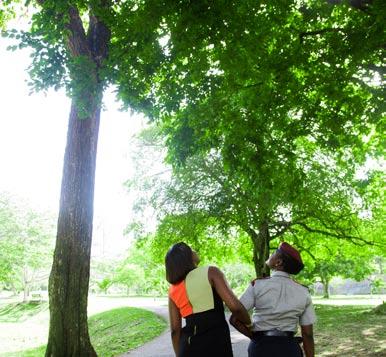
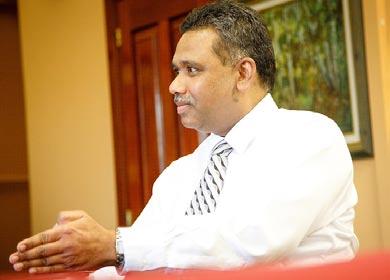
T&T CSR REVIEW 2013 3 Contents Editorial 5 CSR Stories Columbus Nation Builders: Leveraging CSR to Make Lives Better 6 Digging Deeper: bpTT is Driving Economic Transformation 8 A Culture of Care: Hyatt Employees Give the Gift of Self 12 Moving a Generation Ahead 14 Transformational Philanthropy: RBC Puts its Strength to Work in the Community 18 Shaping the Future Together: blink|bmobile Uses Technology for Change 22 Strengthening Communities: BGTT Uses a Self-Help Approach to Capacity Building 24 Planning, Precision and Proficiency: Engineering CSR Deliver at Republic 26 Pillars of Change: NGC is Partnering for National Development 30 Creating Shared Value: Nestlé Trinidad 34 Leading Responsibly: Methanex Trinidad Focuses on Value Creation 38 Igniting Young Minds: Powergen is a Canvas for Youth Development 40 CSR Features Our Life Story: The Journey to and from St. Jude’s 44 It Takes a Village: How Corporate Investment is Securing Family Life 48 More Than a Meal: The Living Water Community is Changing Lives 50 Interview CEO Profile: David J. DulalWhiteway 52
The Trinidad and Tobago Corporate Social Responsibility Review is in its first edition. The review features the unique programmes and experiences of companies from a wide range of sectors: Energy, Finance, Manufacturing, Communication Services and others as they strengthen communities and transform lives across Trinidad and Tobago.
The TTCSR is an annual publication of Virtually Yours T&T (VYTT).
Editor-in-Chief
Donna P. Ramsammy
Deputy Editor
Jasmin Singh
Contributing Editor
Linda Hutchinson-Jafar
Art Director
Kathryn Duncan
Advertising
Virtually Yours T&T (VYTT)
Production Coordinator
Valery Marin
Publisher VYTT
Photography
Andre Neufville (where credited)
Photos for CSR Stories supplied by the featured company Shutterstock.com
Printers
The Office Authority Ltd., Trinidad and Tobago
Writers
Donna Ramsammy
Jacquelyn Smith
J. Wendy Singh
Linda Hutchinson-Jafar
Ronda Francis
Esther Le Gendre
Barbara King
Paul Charles
Publisher:
Virtually yours T&T Ltd; Suite 102 43-45 Woodford Street, Newtown, POS, Trinidad & Tobago W.I. Phone/Fax 1.868.628.2288
E-mail: team@virtual-tt.com
CSR Exchange
Measuring Employee Value: Why Employee Engagement Matters
56 Principles for Corporate Citizenship: The UN Global Compact & Corporate Social Responsibility
58
The Local Impact of Corporate Responsibility: Global perspectives from Boston College
60 Being Green Makes Good Sense: Why CSR and Sustainability Make a Better Bottom Line
62
Corporate Responsibility is a Relationship: How the Most Reputable Companies are Building Brand
64
The CSR Directory
66
The CSR Classifieds
70
COVER ART: Autistic art by Glendon Crepin, Autistic Society of Trinidad & Tobago PowerGen Schools Art Competition 2012

At the time of writing, I had just sat through a webinar by the Reputation Institute to discuss the findings of the 2012 RepTrak 100 Report. Kasper Nielsen, Managing Partner at the Reputation Institute hosted a one-hour session along with Christian Frutger, Deputy Head of Public Affairs at Nestlé S.A.
It was refreshing to get the data to back the debate on just how important corporate social responsibility is to the business bottom line. Social responsibility and connectivity with society are gaining increasing importance in the boardroom. As Nielsen points out, there is real money in improving reputation through CSR, but companies are failing to leverage this.
According to Frutger, reputation is part of the company’s core business strategy and this is evidenced by the integration of reputation thinking into all aspects of business planning and execution. Through the ‘Nestlé -in-Society’ programme, the company creates relevance to the societies in which it operates. In addition to global principles and guidelines, the company encourages adaptations to suit the culture of the locale. Local presence, as Frutger puts it, is extremely important. See Jacquelyn Smith’s article on the RepTrak Report in this issue.
A keen understanding coupled with an ingrained agility to acculturate, has worked well for Nestle. In most places where it operates, the company is hardly seen as a Swiss company.
Instead it postures very successfully as homegrown. I have honed in on Nestle because it is the only international company which operates in Trinidad & Tobago that made it to the Top 10 of the RepTrak survey. First on the list was BMW followed by Walt Disney and then Rolex.
In this edition of the T&T CSR Review we have a good mix of local and international companies from Energy, Manufacturing, Telecommunications and Finance. We hoped to attract some of the smaller companies who are doing a lot of valuable work in the community and we are working on telling some of their stories in the next issue.
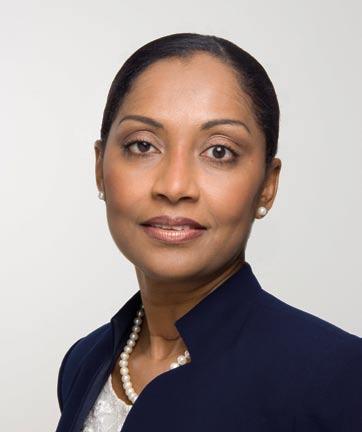
Triple Bottom-line thinking is gaining momentum regionally and many CSR practitioners who spoke with us were keen to share how CSR is adding value to the reputation index and helping to buffer brands during times of crises. Apart from the CSR stories that make up this 2012-2013 edition, we also have a number of features that will be of interest to professionals and those monitoring the field. Some heart-warming human interest stories also affirm our view that what is good for business must also be good for society.
Write to us and tell us what you liked in this edition and what you would like to see in the 2013/2014 issue or post us a comment on our Virtual Editor’s Facebook page.
Donna P. Ramsammy Editor-in-Chief
T&T CSR REVIEW 2013 �
Donna P. Ramsammy Editor-in-Chief
Editorial
CORPORATE PROFILE
In 2005‚ Columbus Communications Inc. acquired Trinidad and Tobago Transcable Company Ltd. and renamed the company Columbus Communications Trinidad Limited, operating under the brand Flow. With over 125,000 subscribers, Flow is Trinidad’s dominant video service provider and the largest video operator in the English-speaking Caribbean. An aggressive five-year US$160 million plan will see Flow upgrading the network system and extending its network footprint to reach an estimated 80‚000 to 100‚000 residences in Trinidad that don’t currently have access to video and internet services. In 2007, Flow launched its broadband services, transforming the local industry. In 2008, Flow introduced landline telephone services, ending the landline monopoly and becoming the only company in Trinidad to offer true broadband triple-play services.
Columbus’ Corporate Social Responsibility to Trinidad and Tobago

At Columbus, we’re committed to giving back to the communities in which we operate. That means, enabling nation building through community development and the creation of social assets. Columbus is dedicated to achieving this through our core pillars which include:
Learning through Technology
Resource Capacity Building
Promoting National Identity Through Arts and Culture
Building Stronger Communities Through Sports Community Partnering
2012 H I g HLI g HTS
Last year Columbus worked on several CSR initiatives including:
Expanding the access to technology in the nation’s classrooms through the Triple A programme
Protecting cultural identity through film through our partnership with the T&T Film Festival
Sporting focus on the differently-abled Disaster relief for residents of Diego Martin after severe flooding
Promoting leadership in primary schools with employee volunteers via the Growing Leaders’ programme
Sponsorship of ‘Cycling on Avenue’ held by Mike’s Bikes and Njisane Phillip
Columbus Nation Builders –Leveraging CSR to Make Lives Better
Columbus Communications Trinidad Ltd, whose residential services has been operating under the brand name Flow, has been in the Trinidadian market since 2005 and can now, be considered as part of the fabric of the local entertainment environment with its services being enjoyed by over 140,000 subscribers.
According to Mr. Brian Collins, managing director of Columbus Communications Trinidad Limited, the company’s vision is to be more than a service provider – it aims to be an organisation which has a strong commitment to contributing meaningfully to the development of any country in which it operates.
“Hand in hand with the technological development which we bring to our markets, we are also committed to demonstrating good corporate citizenship through sustained activities for community development and nation building,” states Mr Collins.
Learning through Technology
One of Columbus’ flagship initiatives is its Triple A (Aim.Aspire.Achieve) Programme which facilitates the provision of free cable and broadband to all government and governmentassisted schools which over 250 schools currently benefit from.
In support of this initiative Columbus has also embarked on campaigns to promote the effective use of cable and broadband technology as a teaching and learning tool by partnering with many organisations that specialise in primary and secondary school education and skills enhancement in communities such as:
Pennacool.com
CaribbeanExams.com
Hop Along Learning
iLearn
Community Hub
Protecting Our Identity through Arts & Culture
Since 2008, Columbus has been the presenting sponsor of the Trinidad & Tobago Film Festival (TTFF) one of the largest in the Pan-Caribbean region. In addition to supporting the festival from a financial perspective participating filmmakers are given the opportunity to showcase their work on Flow’s Video on Demand platform, with 100% of proceeds from purchases in the first six months of viewing given back to the filmmakers.
The Red Cross Children’s Carnival is another one of the annual events which Columbus believes promotes local culture as it allows children to experience the vast wealth of our
� T&T CSR REVIEW 2013
• • • • • • • • • • •
• • • • •
CSR Story
Film screening at the Lady Hochoy Home
local Carnival Celebrations and has been a recipient of over TT$40,000 in sponsorship to date.

Columbus is also the programming sponsor of television channel Gayelle, proving an investment of TT$2,000,000 to date, to assist in the channel’s continued effort to provide a platform for local content and talent.

Building Stronger Communities through Sports

As one of the main sponsors of The Beacon Trinidad and Tobago Cycling Festival since 2009, Columbus has donated $30,000 in cash and sponsored $300,000 in cable advertising.

Columbus has also been a strong supporter of golf and its continued exposure to the general public as a platinum sponsor of the Millennium Lakes Golf and Country Club’s Free Public Clinics and Junior Championship Tournaments since 2008. The company’s sponsorship to date exceeds $500,000.
Besides golf and cycling, Columbus is also involved in football, basketball, swimming and cricket.
Community Partnering

The unprecedented floods and emergencies resulting from odd weather patterns in 2012
sent many Columbus employees out into the field to bring relief and care to a number of citizens. For employees, it was not about social service. It was just the right thing to do. Many of them lived nearby or knew someone who was affected. As they see it, in a state of emergency, we are all family.
Working with public and private sector partners, Columbus supports myriad initiatives that benefit the underserved, investing significant resources annually in community development.
T&T CSR REVIEW 2013 �
Diego Martin disaster relief efforts
“Growing Leaders”
“No Excuses”
Toco Community Science Week
Film Festival sponsorship
CORPORATE PROFILE
bpTT holds exploration and production licenses covering 904,000 acres in marine areas off Trinidad and Tobago’s east coast. Total production in 2008 was 457,000 barrels of oil equivalent per day, comprised of oil, NGL (natural gas liquids), and gas production. This represented approximately 10% of BP group’s production in 2006. bpTT’s assets are predominantly developed using the hub and spoke basin development model. In this, processing facilities and other infrastructure are shared. bpTT’s offshore production assets comprise nine platforms and the Cassia B hub which processes, at current capacity, 2 billion cubic feet of gas per day (bcfd). Other hubs are Amherstia, with a capacity of 1.1 bcfd and Mahogany with a capacity of 0.9 bcfd. Hydrocarbons are transported ashore by pipeline. The eastern gas fields are served by two major offshore gas transmission service systems. The larger of the systems is owned and operated by bpTT. The other is owned and operated by The National Gas Company (NGC).
COMPANY CSR STRATEGY
As Trinidad and Tobago’s largest energy producer, bpTT continues to lead and play an integral role in the nation’s development. The company works at building national capability by investing in a number of transformational areas such as:
Arts & Culture
Education
Environment
Enterprise & Manpower Development
2012 CSR FOCUS
Youth Empowerment through Brighter Prospects
Collaboration & Enterprise in Mayaro
Revenue Management Best Practice
Digging DeeperBPTT is Driving Economic Transformation
“We understand that the sustainability of our company is inextricably linked to the sustainability of the country in which we operate,” says Rachael Caines of bpTT. The statement by the Communications and External Affairs Challenger defines, in part, the energy company’s outlook on Corporate Responsibility (CR).
For more than 50 years, bpTT and its heritage company, Amoco, have been as integral to the landscape of the Trinidad and Tobago economy as the shading samaan and yellow poui are to the natural landscape. The story of the country’s economic growth and success closely follows the fortunes of bpTT which today, is both the largest energy company in the country and primary individual contributor to national income. The energy sector accounted for about 58% of Trinidad and Tobago’s revenue in 2012.
The main objective of its CR policy as bpTT sees it, is to build national capacity and support the sustainable development of the people of Trinidad and Tobago. But the almost clichéd concepts such as “capacity building’ and ‘sustainable development’, that feature in its policy statement have been imbued with life and meaning and human faces through clear articulation on what these concepts mean in action.
The bp Group has been an active participant of the UN Global Compact initiative since July of 2000 and reports continuously on its progress in its annual Sustainability Report. The local company systemized that approach through careful research and data based interventions. In 2003, the company conducted the first ever national CSR audit, tracking how it had executed on its values through its social performance.
bpTT supports sustainable development by being, first of all, a responsible operator and also by enabling progress through strategic partnerships with key stakeholders both internal and external to the industry. This is bolstered by the company’s investments in education and capacity building, enterprise development,
arts and culture and the environment and firmly underscored by its CR policy intent – i.e. “remaining true to our values of safety, courage, one team, respect and excellence.”
Education & capacity building – for youth empowerment
19 year old Makeda from the village of Radix, Mayaro who was awarded a bpTT scholarship to study Pharmacology at UWI says the scholarship has been “a dream come true” for a family which has never had a member attend a university. “It is still a bit of a struggle but Brighter Prospects is my opportunity. It is giving me independence and helping me to put down something that my family could use. After I am gone, I could leave a legacy.”
Brighter Prospects is a 2003 bpTT initiative to offer scholarships to tertiary level students from Mayaro and its environs. Up to TT$10,000 can be provided to cover books, rent and transport expenses. To date, some 300 students like Makeda have been afforded brighter prospects and by 2012, 75 of them had already graduated with tertiary level degrees. According to bpTT CR Manager, Rhonda Francis, “Our support goes beyond the financial aspect as we really partner with the students in developing lasting and supportive relationships. The programme holds great value for us because it is empowering young people to become the change they want to see in their communities and the country.”
The rubber meets the road and concepts come alive at the level of bpTT’s home community of Mayaro and on the national front. The company invests some TT$12.9m annually to support the delivery of a suite of CR programmes channelled into four major focus areas the first of which is Education and Capacity Building.
Capacity building is at the core of the bpTT approach, ensuring that members of the community are sufficiently skilled to take advantage of opportunities in business or employment. Education programmes such as
� T&T CSR REVIEW 2013
• • • • • • •
CSR Story
Brighter Prospects, the strengthening of literacy and numeracy skills and those which help to prepare educators for the evolving needs of students zero in on the value chain from primary to tertiary education. In 2004, the bpTT sports club, for many years a retreat for staff and guests, was transformed into the Mayaro Resource Centre (MRC). The facility has attracted units of the UWI Open Campus, the UWI School of Continuing Studies and SERVOL, and offers a mix of academic, vocational and sports training at levels never before available to the community. The MRC also facilitates programmes of the Adult Literacy Tutors’ Association and the Mayaro Literacy Improvement Committee.
Collaboration & enterprise in Mayaro
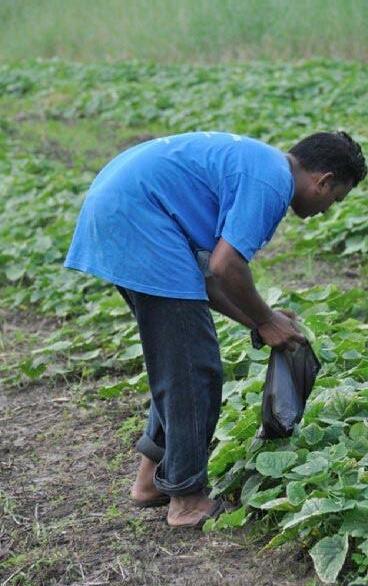
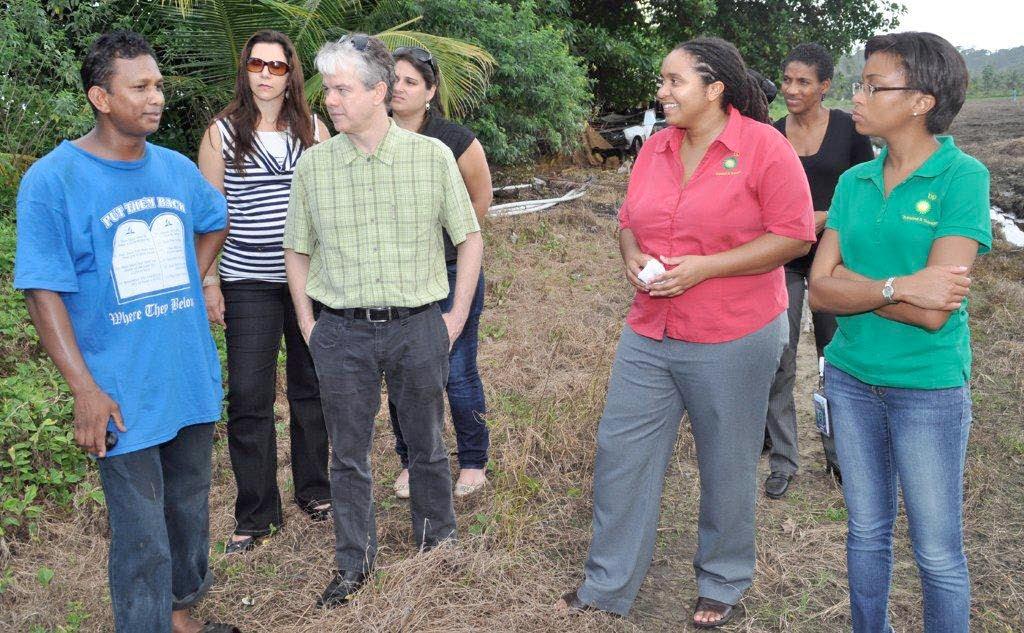
A second focus area of bpTT’s CR is that of Enterprise Development – the enabling of economic diversification and sustainable development and growth through new and innovative approaches. This focus is pursued at both a micro level within the Mayaro community and at a macro, national level.
Since the 1940s, a number of international energy companies had operated in the southeastern coastal region yet ‘employment and a regular income’ remained out of reach for many.
In 2001 a bpTT sponsored study of the Mayaro/Guayaguayare communities confirmed that unemployment levels stood at 29% and that some 40% of persons lived below the poverty line. bpTT acted decisively in its response to the report from the Institute of Business (IOB). The company determined that its home community and environs should benefit from its presence through the wealth and jobs being created, and through skills being developed within the local population. The company pursued a strategy of investing time and talent in addition to the necessary monetary investment. This was a clear shift from the traditional hand-out approach which had dominated the industry for decades.
Consultation with the community led to the development in 2002 of the Mayaro Initiative for Private Enterprise Development (MIPED), the first micro enterprise lending organization established by a non-financial sponsor. Seeded with TT$7.2m, the fund was challenged to stimulate micro-enterprise development and economic diversity through the creation of selfsustaining employment. Via two programmes, MIPED would offer loans to qualified
residents. HOPE – Helping Our People Prosper Economically, would lend up to TT$2,000 and up to TT$100,000 would be available under PROFED – the Programme for Enterprise Development.
By any measure, the programme has met its objectives. Between 2003 and 2012 MIPED has disbursed more than TT$37m to 2,000 entrepreneurs and principal repayments have been above 85%. Enterprises have mushroomed in the areas of fishing, agriculture, food sales, services, retail and distribution and other areas. 2,000 permanent and over 4,000 part-time jobs have been created. As the micro entrepreneurs create employment, rising income changes the face of Mayaro, and the standard of living in the community is also improving visibly. Khan, a farmer, approached MIPED for a TT$5,000 loan
to fund his modest 1-acre farming operation. Today his enterprise has grown to 80 acres and he has plans to extend by another 10 acres. “Getting a loan from MIPED is faster, and easier than any other institution in the area.” As a model for the sustainable development of rural areas, MIPED builds off of the Grameen Bank construct of India and is a successful example of how business working with communities can bring about economic transformation.
The Revenue Management Report 2012
The recognition that the sustainability of bpTT is inextricably linked to the sustainability of Trinidad and Tobago’s economy has prompted what Norm Christie, Regional President of bpTT, describes as the search for “the development of a GPS-like instrument for guiding us to future economic sustainability”. In 2011 the company partnered with the Trade and Development Unit (TEDU) at UWI to host a 3-day conference: Revenue Management in Small Highly Open Hydrocarbon-rich Exporting Economies. Those findings were published and widely shared in 2012 with policy makers, regulatory bodies and key government agencies.
According to the bpTT Insider, commenting on the conference, “In principle, hydrocarbon revenues should provide the resources necessary to achieve sustainable development and poverty reduction, however, the reality is that, most countries possessing mineral wealth (Trinidad and Tobago being no exception) have fallen victim to perverse development outcomes, or what is more popularly known as the resource curse.”
On hand to deliver the Feature Address was Professor Richard Auty, economist and author,
T&T CSR REVIEW 2013 �
MIPED is considered a “best in class” CSR programme, here members of BP Brazil’s Communications and ExternalAffairs department meet a beneficiary of MIPED, looking on are members of bpTT’s Communications and External Affairs Team.
A MIPED beneficiary tends to his watermelon farm.
credited with coining the phrase “resource curse”. It is a term used to describe the adverse economic effects of high rents derived from an abundance of natural resources.
Yet not all countries with rich natural resource endowments are so doomed. Some have avoided pitfalls through the application of Hartwick’s Rule which prescribes the reinvestment of resource rents and that “a constant level of consumption can be sustained if the value of investment equals the value of rents on extracted resources at each point in time.”
The objectives of the conference were therefore twofold, to bring together local, regional and international experts in the field of revenue management in the context of a dominant hydrocarbon sector, to present the ‘best practices’ associated with the management of resource revenues and; enhance the resource revenue management process in Trinidad and Tobago by developing a system of ‘Guidelines for Revenue Management’ based on the presentation of ‘best practice’ policies.
Over 3 days, stakeholders from the business community, industry professionals, decision makers, academia, students, the general public and employees met in 8 sessions to explore themes linked to challenges and/or solutions to revenue management:- the economics of hydrocarbon economies including the fiscal and regulatory regime governing the energy sector; transparency and accountability in hydrocarbon revenue management, macro-economic, sociopolitical and environmental challenges, and the imperative of economic diversification.
The conference sought to address a key issue - “The concern for the diversification of the economic base is lodged in the fact that natural resources are finite. Economies must therefore consider the issue of intergenerational equity when developmental planning is premised on natural resources.”
Among policy recommendations emerging from the conference was that Trinidad needed to diversify its economy applying a two-fold strategy: maximizing the current value of the energy sector, whilst trying to diversify the energy sector. The conference also noted that the country had a long history in the oil and gas business and is in a position to pursue joint
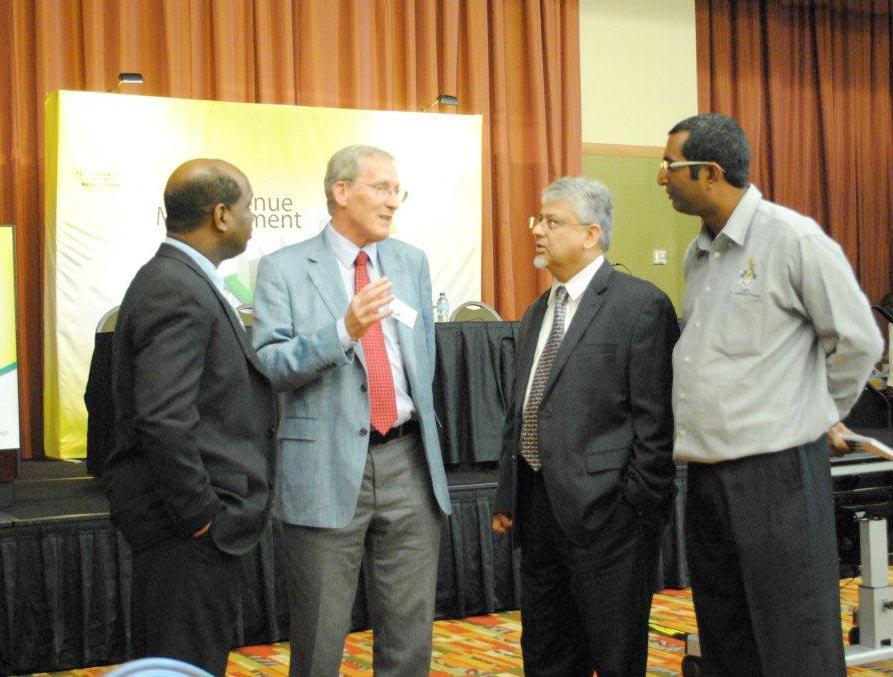
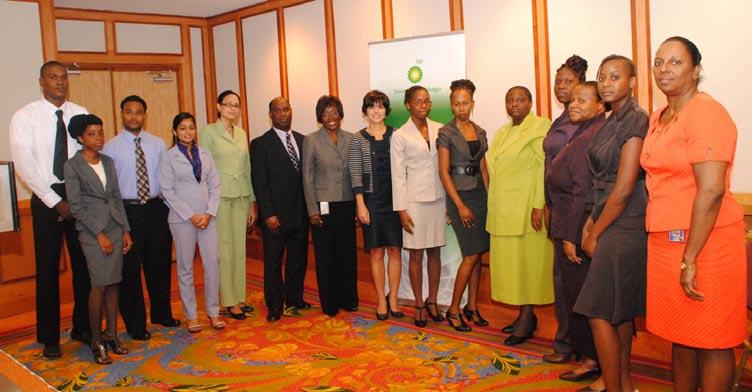
ventures, particularly in emerging international markets. This position is one that Regional President Norm Christie supports. “There are African countries who want to use our experience and expertise in their search for hydrocarbons. The government should now pursue taking positions in third party states; and in return… taking acreage positions of 10%, 5% or 3% interest, insist that our indigenous service industry works in those locations. Our service sector has already demonstrated that it can compete globally within the BP group. That is a form of diversification worth pursuing.”
Norm Christie is optimistic. In assessing the value of the conference, he is keen to build on the dialogue and the ideas exchanged. One
measure of success of the conference would be to see the findings reflected in the 2013-2014 budget and future energy policies. Digging deep to drive economic transformation at the micro and macro levels underscores bpTT’s CR initiatives, Christie is also hopeful that “(t)he energy industry will continue to play a very important role in Trinidad. And we must begin to use the revenue and experience generated from this sector to secure a sustainable future outside of conventional hydrocarbons. We need to move ahead urgently towards true diversification outside of the energy sector. We cannot wait on two generations down the road. The time to do it is now.”
10 T&T CSR REVIEW 2013
1.
2.
Professor Auty (second from left), the featured speaker at the Revenue Management Conference engaged in conversation with Norman Christie, bpTT Regional President, The Honourable Bhoendradatt Tewaire, Minister of Planning and Sustainable Development and Dr. Roger Hosein, Head of the Trade and Economic Development Unit, at UWI. St. Augustine.
Prospects Graduation
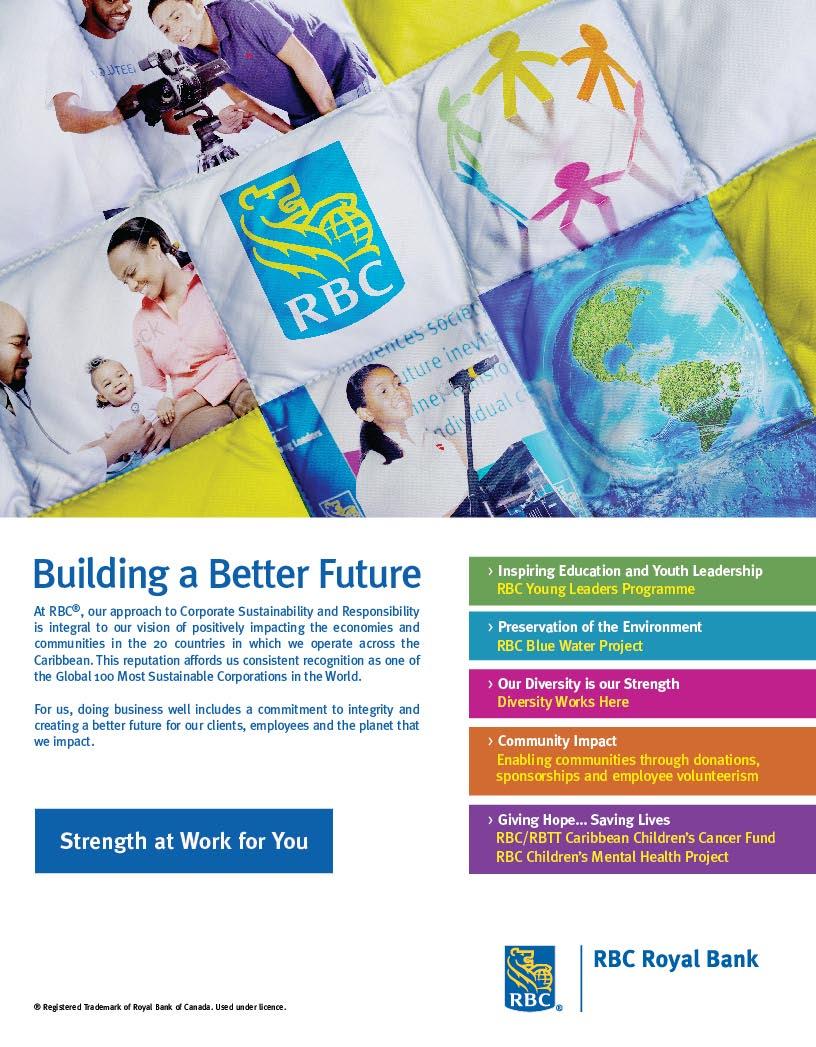
CORPORATE PROFILE
CORPORATE PROFILE
Hyatt Hotels Corporation, headquartered in Chicago, is a leading global hospitality company with a proud heritage of making guests feel more than welcome. Thousands of members of the Hyatt family strive to make a difference in the lives of the guests they encounter every day by providing authentic hospitality. The Company’s subsidiaries manage, franchise, own and develop hotels and resorts under the Hyatt®, Park Hyatt®, Andaz®, Grand Hyatt®, Hyatt Regency®, Hyatt Place® and Hyatt House® brand names and has locations on six continents. Hyatt Residential Group, Inc., a Hyatt Hotels Corporation subsidiary, develops, operates, markets or licenses as Hyatt ResidencesTM and Hyatt Residence ClubTM.
Hyatt Hotels Corporation, headquartered in Chicago, is a leading global hospitality company with a proud heritage of making guests feel more than welcome. Thousands of members the Hyatt family strive to make a difference in the lives of the guests they encounter every day by providing authentic hospitality. The Company’s subsidiaries manage, franchise, own develop hotels resorts under the Hyatt®, Park Hyatt®, Andaz®, Grand Hyatt®, Hyatt Regency®, Hyatt Place® and Hyatt House® brand names and have locations on six continents. Hyatt Residential Group, Inc., a Hyatt Hotels Corporation subsidiary, develops, operates, markets or licenses as Hyatt ResidencesTM and Hyatt Residence ClubTM.
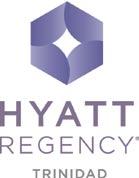
A Culture of CareHYATT Employees Give the Gift of Self
Hyatt encompasses the full spectrum of hotel types, which are conveniently located in urban, suburban, airport, convention and resort destinations around the world. Properties range in size from 200 to more than 2,000 rooms, feature intimate and large meeting spaces, and offer a full range of services and dining options tailored to serve the needs of conventions, business travellers or resort vacationers. Designed as the premier meeting, convention, business, event and leisure travel property. Hyatt Regency Trinidad is a 428-room hotel and is situated in the Port of Spain International Waterfront Development. The versatile event space showcases a 16,000 square-foot Regency Ballroom and a 10,000 square-foot Port of Spain Ballroom with translation facilities. Other guest facilities include one full-service restaurant, a lobby bar and lounge, a sushi bar, rooftop infinity pool, fitness centre and the 9,000 square-foot Spa Esencia.
Hyatt encompasses the full spectrum of hotel types, which are conveniently located in urban, suburban, airport, convention and resort destinations around the world. Properties range in size from more than 2,000 rooms, feature intimate and large spaces, and offer a full range of services and dining tailored to serve the needs of conventions, business travellers or resort vacationers. Designed as the premier meeting, convention, business, event and leisure travel property. Hyatt Regency Trinidad is a 428-room hotel and is situated the Port Waterfront Development. The versatile event space showcases a 16,000 square-foot Regency Ballroom and a 10,000 Port of Spain Ballroom with translation facilities. Other guest facilities include one full-service restaurant, a lobby bar lounge, a sushi bar, rooftop infinity pool, fitness centre the 9,000 square-foot Spa Esencia.
C OMPAN y CSR S TRATEG y
Whether you enter through the employee entrance or as a guest through the main doors, there is a meeting point at the Hyatt Regency Trinidad that’s best described as – CARE. Employees are trained to provide excellent customer service to everyone who enters their doors; but it is the care that they provide to the many people who are outside that distinguishes the guardians of the Hyatt badge. Here employees work collaboratively to identify social causes and then they very often conduct their own fund raising initiatives to support those projects. In some cases, employees even dig into their own pockets to finance their special cause.
Social Responsibility is deeply entrenched in the operations at the Hyatt Regency Trinidad and the hotel has a comprehensive programme to engage employees and associates in what can best be described as a culture of care. That care includes building local capability through training and career development in the hospitality industry, it means promoting healthy lifestyles and it also means preservation of the natural environment.
competitive edge in the quality of support and services that it can provide to investors and business travellers and over the years, the hotel has done just that. Hyatt Regency Trinidad has become the preferred location for conferences, business meetings and leisure travellers to the country. More than promoting tourism and stimulating commerce, the company’s growth is also creating valuable employment.
Hyatt Regency Trinidad is also a strong advocate of shared responsibility. General Manager Russell George believes that making Trinidad & Tobago stronger requires the helping hand of all. He encourages employee engagement in their home communities. “We believe that we have a responsibility to manage our business in a manner that creates value both for us and for our communities”, says George. It is no wonder that the hotel has quickly become one of the best places to work in Trinidad & Tobago. Many people who work in the industry will tell you that the Hyatt Regency Trinidad is where they aspire to work.
Caring for Communities
C OMPAN y CSR S TRATEG y
Hyatt’s global corporate responsibility platform is called Hyatt Thrive. According to their website, it is designed “to help make our communities places where our associates are proud to work, our guests want to visit, our neighbors want to live and owners want to invest. It reflects our belief that no one better understands a community’s most pressing issues – and their solutions – than those who live and work there”. In Trinidad, Hyatt Regency Trinidad’s CSR agenda is entirely driven by its employees. Committee members drawn
Hyatt’s global corporate responsibility platform is called Hyatt Thrive. According to their website, it is designed “to help make our communities places where our associates are proud to work, our guests want to visit, our neighbors want to live and owners want to invest. It reflects our belief that no one better understands a community’s most pressing issues – and their solutions – than those who live and work there”. In Trinidad, Hyatt Regency Trinidad’s CSR agenda is entirely driven by its employees. Committee members drawn from each department select projects that
“Building human capacity and capability is a major focus for Hyatt Regency Trinidad” and as General Manager Russell George explains, each year the hotel trains several nationals to international industry standards to deliver world-class service. As a major business destination, Trinidad needs to retain a sharp
Marketing Manager Neemah Persad-Celestine explains that it is this passion for doing “good” that makes employees of the hotel so generous with their time and service – even after a long day of work is over. “We are a family” she says, “all genuinely concerned about each other as much as we are concerned about the comfort
are designed to alleviate poverty, improve quality of life and build connectivity within their own workplace.
2012 Highlights (T&T)
•
Green Ambassadors – Disaster Relief Efforts
Generating Value – Employee Commitment and Dedication
Reading for a Better Life - Support for ALTA
Signature Charity Event – Part proceeds to United Way Trinidad and Tobago
12 T&T CSR REVIEW 2013
“We believe that we have a responsibility to manage our business in a manner that creates value both for us and for our communities.”
CSR Story
• • •
and welfare of every guest of ours…we care very much about the communities in which we live and work”. From Persad-Celestine’s perspective, it is part of the hotel’s DNA. She says, “We know that a better society out there means a more secure environment for our guests and for our own families. So there is great value in our investment in communities”.
As Russell George explains, “Since 2009, we have partnered with United Way Trinidad and Tobago in funding or manpower to support their tremendous impact in the community.” One such investment of the hotel is the support it gave to ALTA (Adult Literacy Tutors Association) through United Way Trinidad and Tobago. In 2012, through Hyatt’s Community Grant, Hyatt Regency Trinidad was successful in obtaining US$5,000 for ALTA.
Funding for Hyatt Community Grants is provided by Hyatt Hotels Foundation. In 2012, Hyatt Regency Trinidad was among 26 Hyatt properties from around the world which were awarded more than US$300,000 in grants to non-profits in their local communities. Since the program’s inception in 2008, Hyatt hotels have awarded more than US$1,350,000 to nonprofit organizations in 103 communities and 34 countries around the world.


Signature Charity Event
Since 2011, the hotel has hosted an annual allinclusive Carnival fete - LIME, from which part proceeds have been donated to United Way Trinidad and Tobago to assist an NGO in need. The Heroes Foundation was the recipient, where funds were directed to supporting their Youth Development Programme. Part proceeds from the LIME event in 2011 were donated to the Christ-Child Convalescent Home and to the Rainbow Rescue Home for Boys in 2013.
Disaster Relief
In 2012, employees were directly involved in giving support and assistance to 15 organisations, including homes, NGO’s and community projects. In a green-relief project, employees busied themselves during last year’s flash floods which affected many people in the valley areas of North Trinidad. Employees of the Housekeeping and Laundry departments shared how the staff collected barely-used bottles of soap, shampoo and hair conditioner, as well as linens to bring relief to persons who had all their personal belongings submerged by water. They also mobilized to help with the cleaning up in Diego Martin during the emergency.


Persad-Celestine is enthusiastic about the effort. “We were able to give much needed bath and linen hampers to those who had lost everything”. But this was one in yearround volunteerism at the Hyatt. Employee engagement in charitable causes and fundraising activities are on-going throughout the year - with purpose and follow through.
Generating Value takes planning
At Hyatt Regency Trinidad, CSR planning is very much a part of the annual strategic planning process. As a critical aspect of its corporate governance, the hotel requires that its CSR programme is process-driven, measureable and carefully aligned to its business objectives and values. It is very much driven and executed by the employees who are very committed to making a difference. Volunteer and fund-raising activities are on-going throughout the year with purpose and follow-through.
T&T CSR REVIEW 2013 13
The Events Department hand over their donated items to the Mary Jenny Pool Home for Senior Citizens
Spa Therapists and Coordinators on the re-afforestation project in Fondes Amandes
Members of the THRIVE Committee on a visit to the Christ-Child Convalescent Home
Members of the Culinary Team prepare a meal for the Cyril Ross Home
ATLANTIC’S SUSTAINABILITy STRATEGy
Sustainability refers to our intention to create long-term value for our company and shareholders, as well as for employees, communities and the wider nation. At the practical level, sustainability actions are developed to build capability within the company as well as with stakeholders, and include our social investment programmes, environmental initiatives as well as ethical conduct and good governance.
Our sustainability commitment is to lead sustainability in our country and community and we can achieve this through
Responsible environmental stewardship Building capacity through education in the local community
Enabling and using our employees as agents of change via various volunteerism interventions
Developing the supply chain Building strong partnerships
KAy FOCUS AREAS
Sport Education
Local Economic Development Environment
P ROGRAMME OF A CTIVITIES 2012
Point Fortin
Seeds of Hope
Habitat for Humanity Home Covenant
Point Fortin Community Pool
Point Fortin’s Finest Leadership Development Programme
SERVOL Adolescent Development and Skills Programme
Skills Training (NESC)
Agri Business Development Programme
Atlantic/IADB Local Economic Development Plan
WIPA in the Community
Port of Spain
Atlantic/Real Madrid Social Sports Programme
Sport for Life Therapeutic Boys Camp
National
National Primary Schools Cricket League
National Primary Schools Football League
National Primary Schools Track and Field
Championships
Turtle Village Trust
UWI Telehealth
Atlantic Ultimate Field Trip
Sports Ambassador Programme
Athletic Coaching Excellence (ACE)
Sports Ambassador Programme
Athletic Coaching Excellence (ACE)
Moving a Generation Ahead
“Since 2007, our growing engagement with Sustainability has caused us to view this strategic aim as the bedrock of every aspect of our operations and the true cornerstone to our leadership strategy … …. We believe that it is good business and good CSR to operate in a manner that is good for the business but also good for the environment, the economy and the society that we operate in.”
“Our business performance is only one measure of our corporate performance. We recognize that as a significant corporate entity in Point Fortin and in Trinidad and Tobago, we are expected to demonstrate corporate social responsibility (CSR) at a level that surpasses all stakeholder expectations,” says Darlow. For Atlantic, the commitment to sustainability began with an acknowledgement that the quality of its relationships with all of its stakeholders, its governance structure, its management of the environment as well as its social investments all impact its ‘license to operate’.
Sustainability governance
Atlantic’s approach to the management and measurement of its sustainability activities is a highly evolved one which cascades from its Sustainability Commitment: a guiding vision for the conduct of its activities. In addition, a Sustainability Governance Framework is employed to create that all important alignment of CSR with core business processes, to manage sustainability issues and ensure that goals are achieved.

Atlantic gives oversight of and accountability for its Sustainability Programme to a Sustainability Committee. The committee has been established within specific Terms of Reference and provides oversight of policy and strategy. The Sustainability Programme in itself is designed to drive on going annual and project commitments to social investment programmes. At the same time, it identifies new opportunities
for involvement and mitigates any risk that might arise.
The Governance Framework provides the boundaries for consistent, transparent and ethical decision-making in relation to the five areas of Atlantic’s Sustainability Commitment: Responsible environmental stewardship, Building capacity through education in the local community
Enabling and using employees as agents of change via various volunteerism interventions
Developing the supply chain Building strong partnerships
Programme delivery further focuses on employees, the environment, the community and suppliers. The Committee facilitates the evaluation of the various elements of the programme and its performance versus plan.
Measuring Sustainability
Items within the Sustainability Programme themselves have Key Performance Indicators (KPIs) described and yardsticks by which success is to be measured are clearly identified. Measuring sustainability activity allows Atlantic to gauge progress in the selected area and more importantly, to gather data which creates a basis for corrective or other action.
Mindful perhaps that what gets rewarded gets done, Atlantic’s corporate performance contracts include targets for sustainability performance among others. The Company
14 T&T CSR REVIEW 2013
• • • • • • • • •
• • • • •
CSR Story
This is how Atlantic’s CEO – Nigel Darlow summarises an approach to sustainability that has itself sustained successful operations over a 14 year period, and its position as of one of the world’s largest LNG producers.
has also been prepared to scrutinise its own sustainability performance against that of similar operators. For some four years the Company has been involved in a self diagnosis process to assess the quality of its sustainability management against seven Ethos CSR Indicators. The outcome is then independently evaluated by The Ethos Institute, a report is subsequently provided to the company. In 2011 Atlantic’s sustainability performance has been independently assessed as on par with top performers in the Latin America Group when Ethos Indicators pertaining to values, transparency and governance and interaction with its community and suppliers are considered.
Sustainability Programmes
Atlantic’s Sustainability Programmes are conducted annually, starting in its home community of Point Fortin, extending to Port of Spain and to the wider national community
In the end, the carefully structured approach: statements of commitment, sustainability management systems and their measurement all come together to power the effectiveness of programmes in the local community and in Trinidad and Tobago. From an extensive menu of sustainability activity, the following
are living examples that speak to just how the measurement of sustainability can sharpen focus to deliver sustainable interventions
The key focus areas of Atlantic’s sustainability programme in the community and at the national level are : Sport, Education, Local Economic Development and Environment
Focus on Sport
Physical fitness and health, youth development, the building of social capacity and cohesion, crime reduction, the regeneration of local communities are just some of the benefits of sport. And these are some of the reasons for Atlantic’s involvement in Sport in the schools of Point Fortin and in the national arena. Atlantic maintains a ten year relationship with thousands of students who participate annually in the National Primary Cricket, National Primary Football and National Primary Track and Field Championships which the company solely sponsors. With the support the West Indies Players Association (WIPA) and a cadre of home grown coaches, the cricket and football programmes have begun to sustain sport both at the community level and at the national level where young champions have gone on to join national teams.


Other sport interventions have a decidedly social focus: a 2008 initiative Sport for Life attracts participants with a ball and bat then introduces boys to the world of computers, literacy and numeracy. The programme facilitators carefully track the progress on academic achievement. Atlantic has also supported the construction of a facility for hosting the programme which had impacted more than 500 boys to date. A 2011

T&T CSR REVIEW 2013 1�
Atlantic National Primary School Football Finals - Tobago
Atlantic National Primary School Sports
Atlantic National Primary School Cricket Finals
collaboration with The Real Madrid Foundation has established a youth development and football training initiative for underprivileged children between the ages of seven and fourteen selected from schools in Port of Spain and environs. Participants also gain exposure to a foreign language, Spanish as well as life management skills and values that contribute to the strengthening of the social and moral fabric of the society. In its first year, the programme reached 80 young persons.
Focus on Education
“We decided almost from our very beginning that one of the things that will define us as a company is a commitment to the development of people. By this we mean not only the development of our employees – who we consider our number one constituent – but also the development of our neighbours: the people of Point Fortin and our community,” says Atlantic.
Atlantic’s education programmes seek to build local capacity among young people from the primary to post-secondary level and in both academic and vocational areas. 13 years since inception, a scholarship programme to recognize Point Fortin’s Finest (ten top achievers in the annual national SEA examinations) is already paying rich dividends. The programme gives financial support for the students’ secondary education and may be extended to those transitioning to tertiary level education. Annual vacation camps and “world of work” experiences have been created to enhance the scholarship. Of 106 participants to date, a 91% transition to tertiary education among the group is higher than the national average. University graduates in medicine, business, computer science,
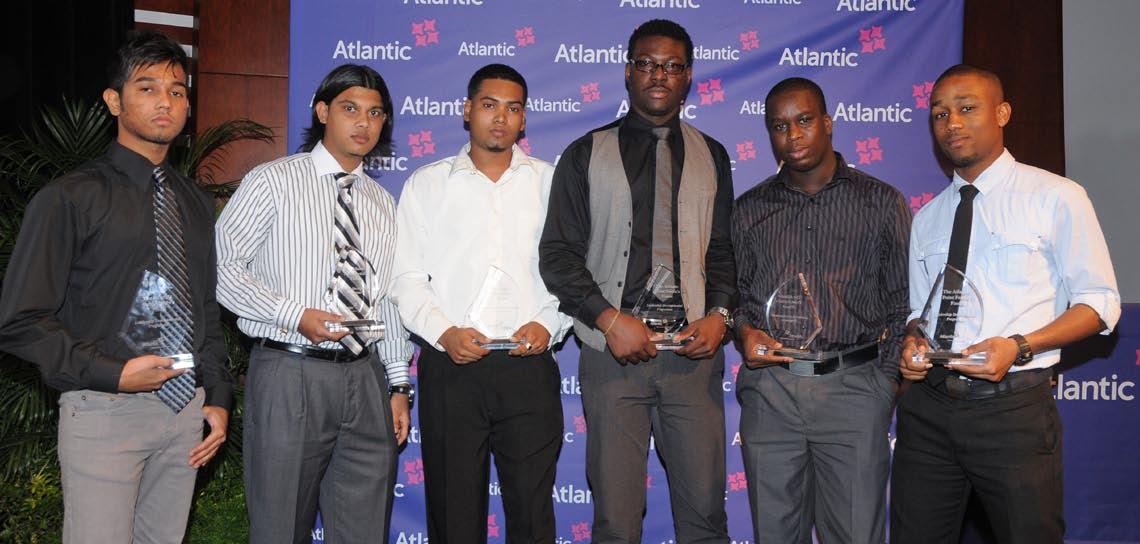
geology, engineering and agriculture have emerged to boost the stock of qualified persons in the community.
Among the first of its sustainability interventions in education in the Point Fortin community was Atlantic’s 2002 partnership with the National Energy Skills Centre (NESC) to offer training to young persons of the community in a variety of practical and technical areas such as welding, building construction technology, small engine repairs, tile laying, computer skills. The programme has improved the employability of participants and many have gone on to become self employed. In 2007 Atlantic also partnered with SERVOL in an Adolescent Development Programme to conduct three courses each year to enhance the skills of young persons in the areas of computer repairs, computer literacy and beauty culture.
The Atlantic Ultimate Field Trip, is Atlantic’s educational partnership with Giant Screen Entertainment Limited (franchise holder for IMAX locally). This partnership started in August 2011 and is targeted to primary and secondary school children from across Trinidad and Tobago. To date over 30,000 students have participated in the Atlantic Ultimate Field Trip. Visits were made by schools from over 70 different locations across the country and over 250 different schools.
As the official sole educational sponsor, Atlantic’s investment facilitates the screening of educational documentaries on current issues such as the impact of climate change and wildlife poaching. Our sponsorship also provides support for school visits, particularly where there may be a financial need, and where students would have to commute over long distances.
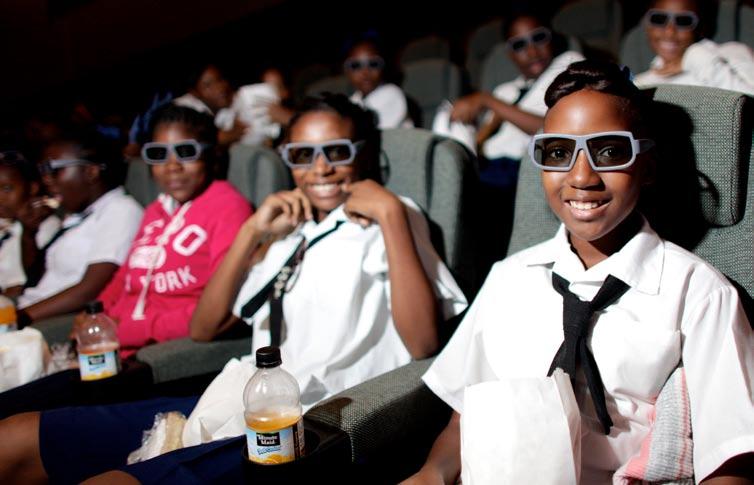
1� T&T CSR REVIEW 2013
Atlantic IMAX - to the artic
Pont Fortin’s Finest - the 10th anniversary
Focus on Local Area Development
Since 1996, Atlantic has been the largest foreign direct investment not only in the south western peninsula but in Trinidad and Tobago. The area population of some 30,000 has consistently experienced poverty and unemployment levels that are above the national average. While Point Fortin and environs have been positively impacted by training and education programmes as well as others, Atlantic has turned its focus to the creation of more sustainable interventions with the potential to enhance the social and economic development of the region.
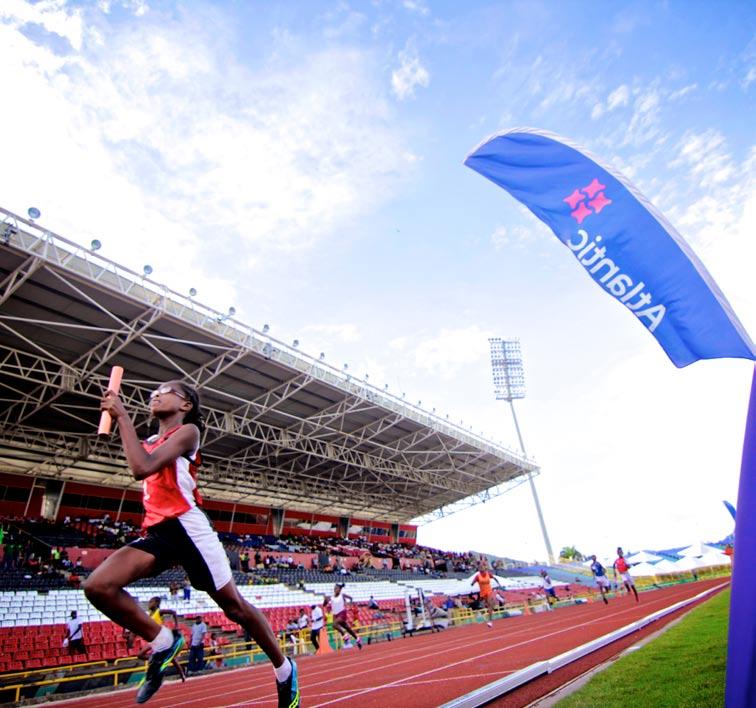
Atlantic in 2011 approached the Multilateral Investment Fund (MIF) of the Inter-American Development Bank (IADB) to partner in a project: Developing a Local Economic Development (LED) Framework for Regions with Extractive Industries. The aim of the project is to define sustainable interventions that build institutional capacity for local area development, develop new or expanded business opportunities in key non energy sectors such as fishing, agriculture and tourism. Another expected outcome is the support of human capital development and the employability of at risk and marginalized groups. Most importantly, the project aims to create and transfer knowledge, results and best practices on LED to key stakeholders.
Focus on the Environment
Atlantic’s Environmental Management System (EMS) is a part of its management practice to develop and implement related policy while managing environmental aspects. Atlantic has maintained ISO 14001: 2004 certification since 2001 and was recertified after extensive audits in 2011. In the same year, a cross functional team developed and implemented an Environmental Action Plan to drive overall performance in key areas: greenhouse gas and other emissions, communication issues, solid and liquid waste.
This environmental concern is extended in the community annually through a programme of activities that demonstrate Atlantic’s support for the preservation of a clean and managed environment. Supported by a vibrant team of volunteers - the initiatives focus on actions to promote ecosystem management, minimising the depletion of non renewable resources and promoting awareness of biodiversity, the environment and food production among students.
“Seeds of Hope” is a six year collaboration between Atlantic, the 4 H Clubs of 32 schools and the Ministry of Food Production, Land and Marine Affairs to demonstrate the benefits of agricultural entrepreneurship in the context of sound environmental practice. The programme
has reached more than 1,000 primary and secondary school students to date.
Turtle Village Trust (TVT)
Our ongoing commitment to ensuring we leave a sustainable future for generations to come is reflected in our approach to environmental conservation and awareness. Our support of sea turtle conservation through our sponsorship of the National Sea Turtle Tagging and Monitoring Programme under the Turtle Village Trust is one example of our aim to promote environmental stewardship.
“Turtle Village Trust is an association of community groups with a common objective, to conserve leatherback turtles and protect their nesting beaches. An important part of the effort was the monitoring programme. Community groups were trained to patrol specific beaches during the nesting season; and to tag nesting turtles. Most of these beaches are in north east Trinidad or Tobago.
Over three years, hundreds of turtles were tagged, and thousands of hatchlings were seen returning to the sea.
Atlantic sponsored the monitoring programme, and its extension beyond the beach to the offshore monitoring of the other sea turtle species – greens and hawksbills. Offshore monitoring was conducted in the waters around Tobago resulting in additional information to
support the move towards legislation in 2011 to protect all sea turtles in Trinidad and Tobago waters.
Sustainability Reporting
For the past 8 years Atlantic has undertaken sustainability reporting of its achievements against a Sustainability Action Plan. The Sustainability Report is structured using the Global Reporting Initiative (GRI) guidelines and is aimed at key stakeholders, which include shareholders, employees, business partners, government, suppliers, business partners, industry associations and the local community. The Report is independently audited.
Through a voluntary process of self challenge, sustainability reporting, openness to the external audit of both the community and professional auditors, and a commitment to act on recognized gaps discerned through various feedback mechanisms, Atlantic maintains robustness to its sustainability management.
With the full support of its shareholders, Atlantic’s commitment to sustainability runs through the fibre of an organization clearly focused on continuous improvement. Atlantic CEO, Nigel Darlow, underscores this, “Embedding sustainability is a journey….sustainability at Atlantic is not only about our own business. It is also about delivering benefit for future generations.”
T&T CSR REVIEW 2013 1�
CORPORATE PROFILE
With more than 100 years of heritage serving the region, RBC operates under the banner of RBC and RBTT with a presence in 20 countries, 117 combined branches, and close to 6,400 employees serving more than one million clients. As one of the Caribbean’s leading diversified financial services companies, RBC provides personal and commercial banking, wealth management, corporate and investment banking, insurance and trust and asset management services to a wide range of clients, including individuals, small businesses, general commercial entities, regional and multinational corporations and governments.
CSR STRATEGy
RBC demonstrates a leading corporate citizenship strategy that is based on our vision for building stronger communities. This approach is known as the RBC Community Blueprint, which allows us to support a wide range of community initiatives through donations, sponsorships and employee volunteer activities. Within our Caribbean business, RBC’s corporate citizenship initiatives are directed at strengthening our operational integrity, creating rewarding workplaces, building vibrant communities and contributing to a thriving marketplace and a prosperous economy. Our investments across the region through charitable donations and sponsorship programmes reinforce our presence and commitment to being an active corporate citizen and are focused in the following areas:
Education and youth development
Health and wellness
Social services
Amateur sport and renewal of playing spaces
Arts and culture with a focus on emerging artists
Environment and climate change with a focus on water
Diversity and inclusion
2012 H I g HLI g HTS
Education and youth Development
RBC Young Leaders Programme
The Environment
RBC Blue Water Project
Transformational Philanthropy RBC Puts its Strength to Work in the Community
RBC prides itself in doing business in a way that brings benefit to both to the national community and to the organization. The company is deeply committed to providing financial services responsibly and ethically. With an employee base of over 80,000, RBC touches lives in over 50 countries every day. Says CEO, Suresh Sookoo, “We are conscious of the impact banks have on the lives of people and national development across the region. We are therefore committed to ensuring that we deliver business with integrity and a keen sense of responsibility to our communities”.
Prioritizing youth
A key focus for the financial giant is the development of the nation’s youth. AnnaMaria Kurbanali, Regional Manager – Corporate Responsibility, explains that the company’s regional investments are wide given that it operates in some 20 Caribbean territories. However, as part of their strategic focus, youth development for them means investing in a stronger, more capable and well-equipped community. Priority Programmes for RBC in the Caribbean are:
RBC Young Leaders
RBC/RBTT Caribbean Children’s Cancer Fund
RBC Blue Water ProjectTM
RBC Children’s Mental Health Project
RBC Emerging Artists Support Programme
RBC Employee Volunteer Programme
young Leaders transform society
But it is the flagship programme Young Leaders that Kurbanali is most passionate about. The RBC Young Leaders has been in operation for over 32 years and has been helping young people develop leadership and critical thinking skills through a range of projects while contributing to social transformation.
The mandate of Young Leaders is “to help young people develop leadership skills, appreciate teamwork in the pursuit of a common goal, foster care for the community and the environment, promote thrift toward strengthening the social, moral, and economic well-being of the community and implement sustainable programmes that have meaningful and wide-ranging impact.”
According to Kurbanali, many of the initiatives developed by RBC Young Leaders have become sustainable programmes that continue to thrive today, including school cafeterias and libraries, among many others. There are more than 150,000 RBC Young Leader Ambassadors throughout the region who have taken part in the annual leadership programme since inception in 1981.
The Young Leaders Project continues to serve as an incubator for youth seeking to enhance leadership and project management skills, while at the same time providing valuable information and knowledge sharing in issues affecting the region. Participants also gain practical experience in the areas of finance and budgeting and the importance of saving. The 2012/2013 theme is “Be the Change”.
Says Kurbanali, “RBC has chosen to pursue a path of ‘transformational philanthropy’, where we provide support for difficult or emerging social and environmental issues”. Another significant area of focus for the RBC CSR team is - the RBC Blue Water Project.
Blue Water makes a big impact
The RBC Blue Water Project is classified as one of RBC’s investments that is ‘having a bigger impact and making a real difference in the lives of people’. Simply put, the project is a 10-year global charitable commitment of CAD $50 million to help provide access to drinkable, swimmable, fishable water, now and for future generations.
1� T&T CSR REVIEW 2013
• • • • • • •
• • • • • •
CSR Story
Objectives of the project are threefold:Reducing our own water footprint Embarking on education and awareness programmes for employees and clients to promote sustainable water use and create an understanding of the value and vulnerability of our water resources. Sponsoring events and activities related to education, awareness and collaboration in the cause of water stewardship
According to UN Organisation UN Water, 11% of the global population, or 783 million people, are still without access improved sources of drinking water. (JMP21012) The research also indicates that globally, diarrhoea is the leading cause of illness and death, and 88 per cent of diarrhoeal deaths are due to a lack of access to sanitation facilities, together with inadequate availability of water for hygiene and unsafe drinking water.
The Global Analysis & Assessment undertaken by the UN in 2012 explains that “resourcing of the water, sanitation and hygiene sector is relatively low priority compared to other sectors. In many countries, policies
and programmes underemphasise adequate financing and human resource development to sustain the existing infrastructure and to expand access to sanitation, drinking-water and hygiene services (UN Water Global).
The 2007 launch of the RBC Blue Water pushed the local organisation more deeply into the areas of environmental protection and preservation. Since its inception a number of regional partnership projects have been implemented. In 2009, RBC sponsored Water
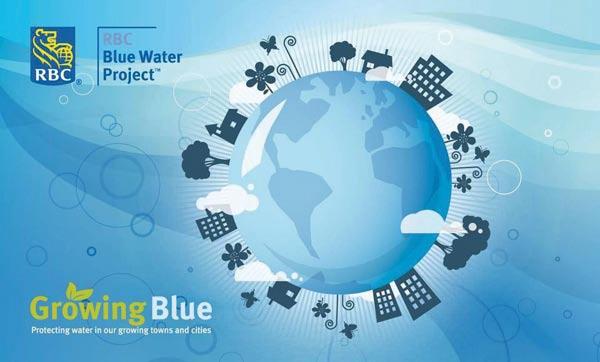
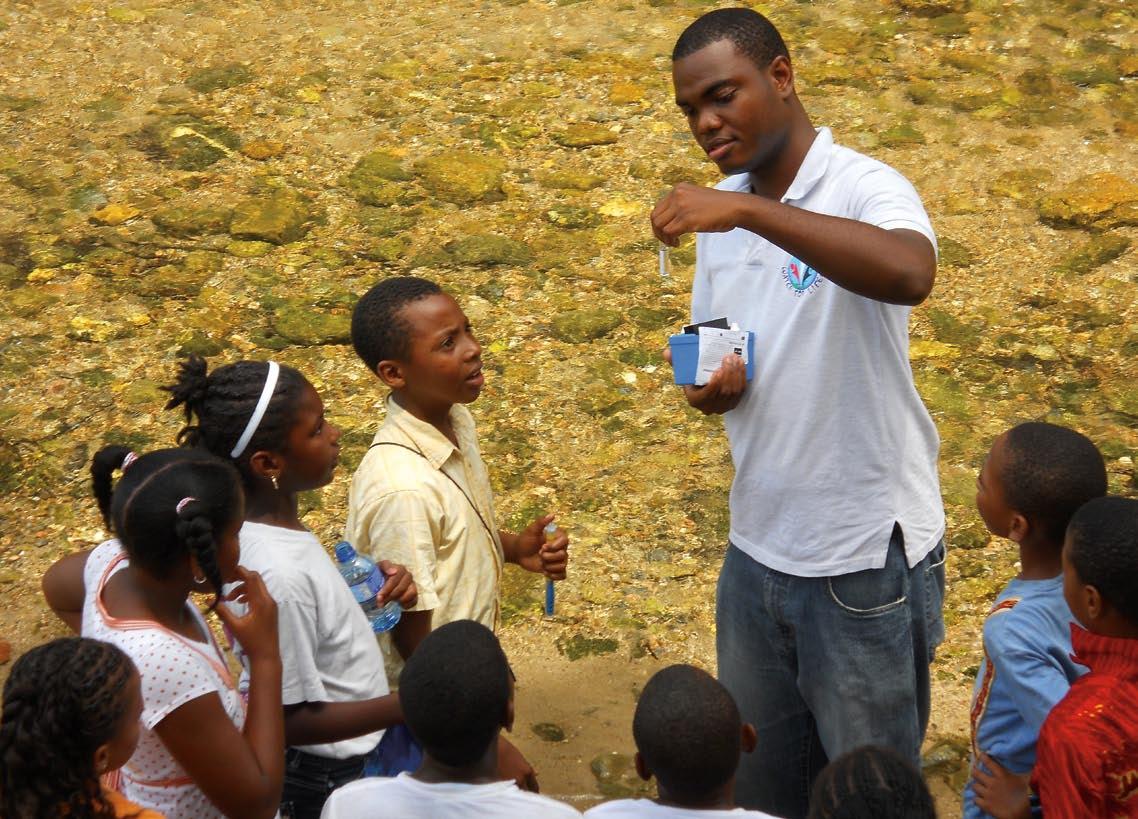
for Life: The Trinidad and Tobago Initiative, a three-year renewable grant for USD $300,000 to provide educational intervention to various local communities Trinidad & Tobago.
Building on this knowledge sharing and awareness campaign, RBC invested last year, a further USD $60,000 in Caribbean Natural Resources Institute (Canari) to host sessions focused on capacity-building for watershed management stakeholders in Trinidad and Tobago. Participants from various community
T&T CSR REVIEW 2013 1�
• • •
Above: The RBC Blue Water Community Makeover is the 2013 RBC Blue Water Day campaign to encourage the protection water by creating green spaces, cleaning up streets and shorelines and learning about water issues.
Above: A group of children from the Matelot community participate in a water-testing activity sponsored by the RBC Blue Water Project.
Below: Members of the panel for the discussion, The Business of Water Innovation - (l.- r.) Alexandra Cousteau, National Geographic Emerging Explorer, Dr. Jennie Ward Robinson, Executive Director, Institute for Public and Water Research, Kenny Broad, National Geographic Explorer and Scientist, John Stollmeyer, Wa Samaki Ecosystems and facilitator Nicole Duke-Westfield, RBC’s Regional ManagerEmployee Communications.
groups and other key stakeholders involved in managing local watersheds were provided with tools to assist with maximising synergies.
RBC has a longstanding commitment to environmental sustainability, and ...water is fundamental to the sustainability of all life on our planet. We believe that access to water will be one of the most significant environmental and economic issues facing the world in the coming decades.
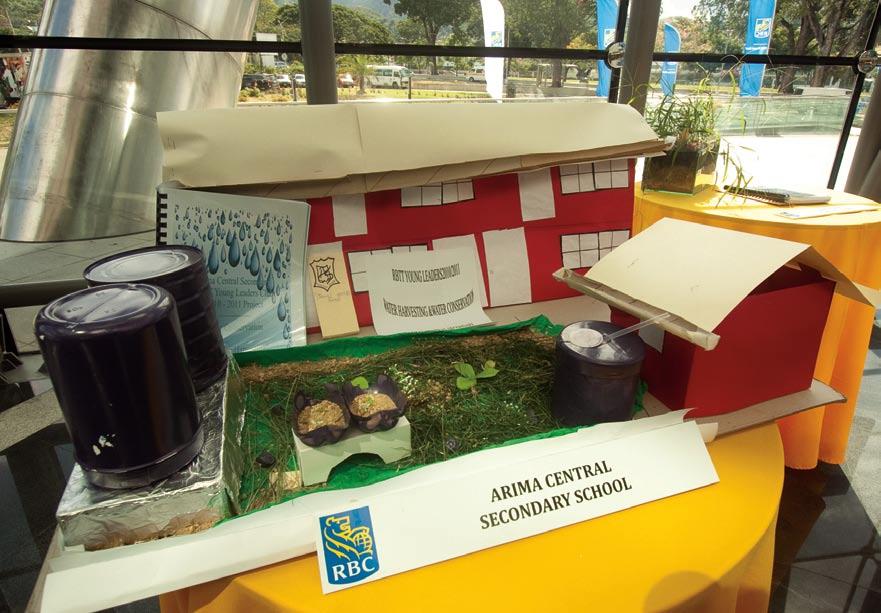
This is even more relevant for us in Trinidad and Tobago. In the October 2011 Economic Commission for the Caribbean & Latin America (ECLAC) study, researchers determined that Trinidad and Tobago is particularly vulnerable to the consequences of climate change, such as the rise in sea levels, increased flooding, the increased frequency and intensity of hurricanes, hillside erosion and the loss of coastal habitats. Projected increase in air temperature is likely to cause an increase in sea levels with resulting inundation of coastal areas, salination of soil, and increases in the incidence of waterborne diseases. As temperature increases, there is also expected to be loss of available surface water and a reduction in the recharge of groundwater reserves in aquifers.
It is for reasons such as these that RBC globally will observe RBC Blue Water Day on June 14 and has committed to help protect water in growing towns and cities. That means funding projects that improve control and management of rain water, raise awareness about or use low-
impact design or natural systems to control rain water, encourage more efficient use of water, and protect or restore urban waterways.
The potential impact of water shortages on RBC locations is more severe in some countries based on differing water distribution infrastructures or the amount of water remaining in their local reservoirs. Rationing of water has occurred in some countries. But as most buildings have water tanks on-site, the impact to date has been minimal.
“Part of our role as a financial services company” says CEO, Suresh Sookoo, “is to ensure we understand the full scope of risks and opportunities facing our clients, especially when it comes to the provision of credit. Clients who
depend on water for their operations, such as oil and gas and manufacturing, could face financial and operational risks if they do not have access to clean water. This is not only a risk for our clients, but poses a threat to the communities in which we live and work, and to economic development across the region”.
RBC understands that it is the right time for our company look at business and social issues in a new way. As the company’s CSR philosophy emphasises, “We recognise that today’s clients, employees, communities and shareholders expect much more from companies, and we will continue to take advantage of opportunities to create shared, sustainable value across the Caribbean”.
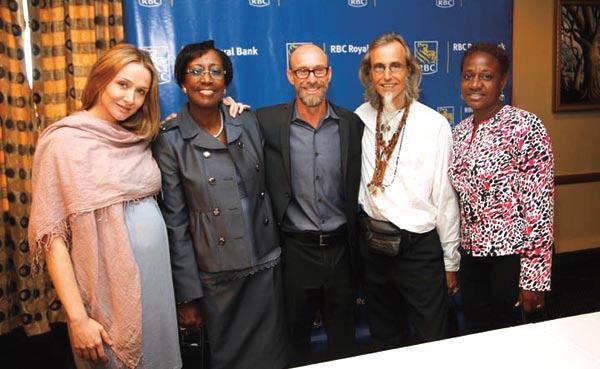
20 T&T CSR REVIEW 2013
Left: One of the many RBC Young Leaders Projects submitted by secondary school students under the theme, “Water Beyond the Surface, Sustaining Life, Securing our Future.”

CSR POLICY blink|bmobile is proud to be the leading corporate citizen in the telecommunications sector and to stand shoulder to shoulder with other likeminded citizens from all walks of life who give of their time, talent and resources to shape the future together. The company shares a special connection with the people of Trinidad and Tobago and takes its role as a good corporate citizen very seriously – that is, not just to give financing to good causes, but to focus its capacity, capabilities and time to make sure that its community activities make a real difference in the lives of citizens. Via the blink|bmobile Foundation the company aims to contribute to the positive development of the nation’s youth. Whether it is in business, sports, education, health or culture, the company focuses on adding value, sharing its skills and supporting those things that are important in our communities.
2012 F OC u S A REAS blink|bmobile in its commitment to the nation’s youth and its pledge to work with others for “shaping the future together”, has partnered with various NGOs, CBOs and other goodwill organizations as they worked on bettering Trinidad and Tobago. The blink|bmobile Foundation has proudly aligned itself with initiatives that focus on sustainable development of the country’s youth through four pillars:-
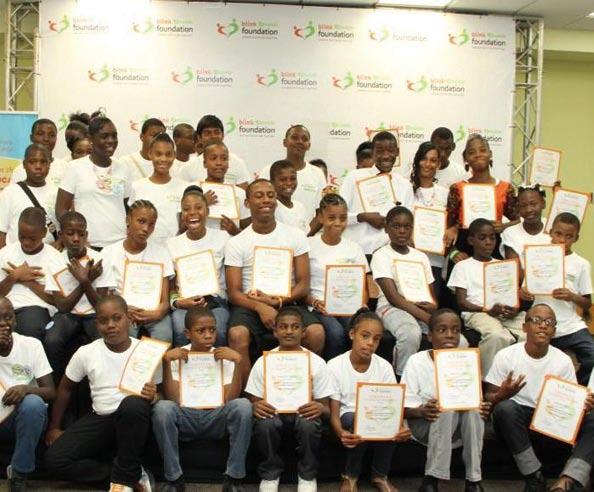
Helping to Shape the Future TogetherBLINK|BMobile Uses Technology for Change
The fastest growing customer base for blink|bmobile is that of youth 16-25 years of age and that is due in large measure to the rapid transition to digital media for communication and the demand for instant access to information. According to the PEW Research Centre, “Smartphone adoption among American teens has increased substantially and mobile access to the internet is pervasive”. For instance, the Centre states that a nationally representative survey in 2012 indicated that “one in four teens are “cell-mostly” internet users, who say they mostly go online using their phone and not using some other device such as a desktop or laptop computer. In Trinidad, there are similar indicators, and this accounts in large measure for the explosion of the blink|bmobile brand which is easily one of the most recognizable and prominent brands in the country. The
brand is defined as young, hip and technology savvy. The blink|bmoible Foundation is building purposefully on this image by aligning its CSR programme to youth with a strong focus on health and sports, culture and education.
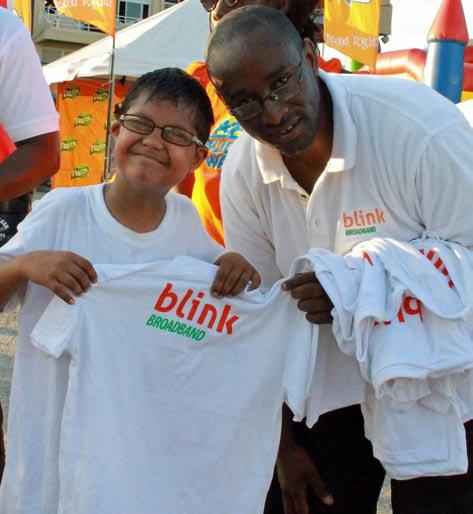
Innovating Communication
The blink I bmobile Foundation is also seeking to bridge the digital divide that prevents many organizations from harnessing the benefits of modern technology. A part of its CSR activity is very much focused on equipping groups with the proper technology to get their jobs done effectively. blink|bmobile provides refurbished computers as well as new electronic equipment to Community Based Organisations (CBOs). Innovative Parenting Support (IPS) is one group which has benefitted from the Foundation’s efforts. IPS helps parents to be effective in their

22 T&T CSR REVIEW 2013
Sports Health Culture 1. 2. 3. 4.
Education
CSR Story
Some of the campers proudly display their Certificates of Participation for the blink bmobile Foundation's Easter Vacation Life Skills Camp
parenting role; informs and guides them about child development and encourages parents to continue personal development.
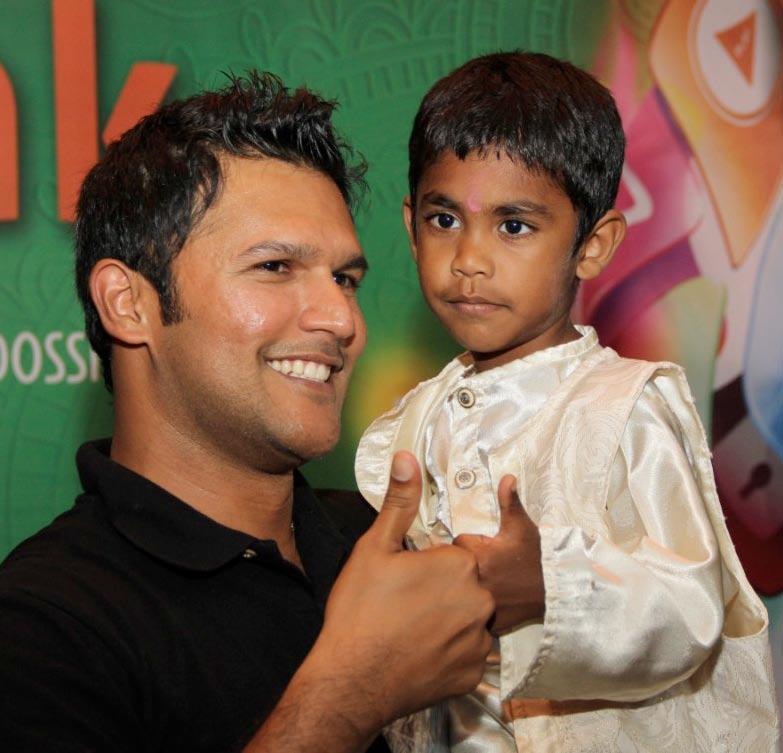
On the Move
In 2012, the Foundation looked at other ways outside of technology to get organisations the right resources to deliver change. As part of its eco-conscious efforts, the Foundation donates previously-owned and operated TSTT vehicles for worthwhile causes. The Foundation recognizes that lack of mobility often hampers the reach and progress of many community and nonprofit groups and so it makes former company vehicles available where possible to assist some critical programmes such as the ones conducted by the Social Life Justice Foundation. The Social Life Justice Foundation was established five years ago to bring communications technology to at-risk youths in rural areas including Matelot, Carlsen Field and Mayaro. Through its TGN (The Good News) Media, young people are trained in videography, reporting and video editing. The group also provides jobs for those trained.
Sporting Talent
The Foundation understands that sports is not simply a recreational activity; it is one of the cornerstones on which blink|bmobile invests in the men and women who make up the community of new leaders. The blink I bmobile North Coast Games is hosted annually in order to give youth in rural communities an opportunity to be exposed to large scale competition and
prepare them for future success. The blink I bmobile National Secondary Schools Swim Meet and the blink I bmobile Victoria Education District Sports Association Track and Field Championships also provide youngsters with a forum to showcase their skills against the best of their peers and develop their confidence
In 2012, the Foundation also supported the Njisane Phillips Junior Cycle Meet. Head of Public Relations and External Affairs, Camille Salandy explained that: “ Sport is a channel that facilitates the holistic development of the youth in our society; Njisane and the entire Trinidad & Tobago Olympic team have collectively demonstrated at the London Olympics, that our country is filled with immense talent and we are therefore proud to support initiatives like this which reinforce the ambition of these young people”
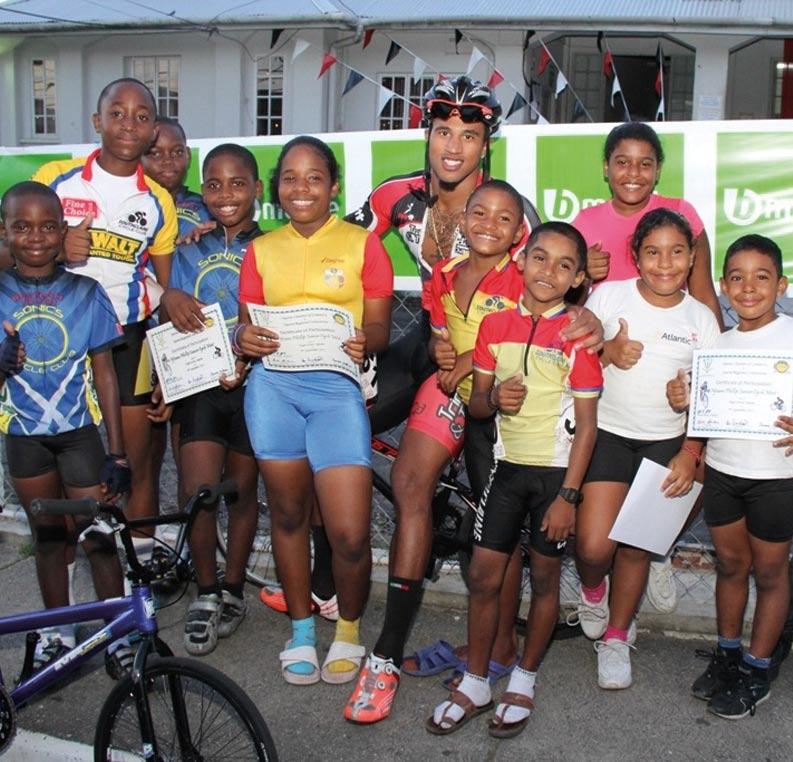
Technology for Relief
Anjanie Ramesar-Soom, Manager - Corporate & Community Affairs says, “Helping those in the business of helping others is a principle of the Foundation”. This principle often guides decisions on how the Foundation will invest and this was the main reason why the Foundation provided support for the local arm of Red Cross in their Hurricane Sandy relief efforts by facilitating an “SMS text-to-donate” service on the Red Cross’s behalf. Similarly it supported the Heroes Foundation since their Mentorship Workshops and Concert to raise funds, was important to the organization.
The Foundation also promotes enhancing the educational opportunities available to the future of the nation. The employees of blink I bmobile proudly share in this vision as well and rally together annually under the umbrella of the Foundation for the staff Book Buddy Drive where employees fill book lists of hundreds of young people from children’s institutions across the country. The Foundation has also hosted the blink | bmobile Foundation’s Vacation Life Skills Camp during the school vacation for adolescents from children homes in order to help prepare them for the world of work and a better quality life . Events like the Malabar Youth Symposium which aimed at providing educational options and career guidance to the community youths were also assisted by the Foundation under the educational pillar
Initiatives that focus on providing a forum for youth to experience the local culture have also been critical. Therefore, supporting the work of Indian Caribbean Museum and projects like the Primary School Ballroom Competition proved to be an ideal fit for the Foundation
Ramesar-Soom is proud of the Foundation’s work. As she explains, “the blink I bmobile Foundation is always eager to work on projects that share our vision for an informed, highly skilled and well-connected Trinidad & Tobago. By supporting youth development, we believe that the Foundation is on the right track”.
T&T CSR REVIEW 2013 23
All smiles - Junior cyclists show off their certificates with a happy Njisane Phillip
A moment with Darren Ganga
C ORPORATE P ROFILE
BG Trinidad & Tobago (BG T&T) has been in operation since 1989 and is the only international energy company in Trinidad and Tobago with upstream operations both onshore and offshore – offshore east coast & north coast, onshore Central Block in Moruga and equity in all 4 trains at Atlantic LNG. BG supplies natural gas to the domestic market and to Atlantic LNG for export.
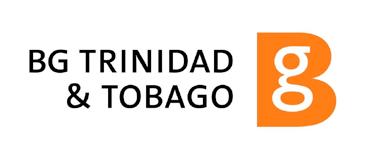
CSR S TRATEG y
The responsibility for delivering sustainable development lies primarily with governments. But BG Group is committed to contributing to this goal by supporting the social, economic and environmental development priorities of our host countries and host communities. This commitment is expressed in our Business Principles. Key areas of focus are:
Strengthening Education/training
Local content (employment and contactor development)
Capacity building of community groups
2012 F OC u S A REAS
Local employment policy and plan for BTIC project
Community empowerment programme (CB)
Compensation of affected fishermen due to seismic acquisition
Support for the MLI programme in East Port of Spain, in partnership with the Ministry of National Security; Collaboration with bpTT and Atlantic on sponsorship of Nature Nurture programme, a programme designed to provide socio-emotional healing to boys who experienced the murder of a male relative
Strengthening Communities - BGTT Uses a Self-Help Approach to Capacity Building
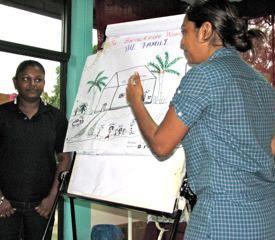
For almost 25 years BG T&T has conducted a programme of corporate responsibility investing in NGO activity, education, sports, arts and culture. Since 2008, however, BG Group has moved to refocus and standardize its social performance framework and set itself a target for implementing its Social Performance (SP) Standard across all operated businesses. The company’s commitment to sustainability, and the protection of its license to operate, is based on the application of its Business Principles: safety, environmental stewardship, ethical conduct, the development of employees and the long-term future of the communities where the company operates.
A long-term approach to social transformation
Beginning in 2010, BG Group rolled out a revised Social Performance Framework and this was extended to the Trinidad and Tobago operations among others. BG T&T moved to develop a 35 year SP Plan and to design social investment projects that were aligned to these standards, for execution in its host community. “A key challenge, the company acknowledges,” says Leslie Bowrin, Head of Social Performance at BG T&T,“ is generating long- term socio-economic benefits that address long-term local needs in a sustainable manner, without creating a culture of dependency or conflict.”
In 2009, BG T&T announced the development of the Baraka and Baraka East discoveries and related compression and tie-in project at the Central Block onshore facility. The advent of the project would heighten the need for appropriate socio-economic responses in a host community wracked by the closure of the sugar industry:
the consequent loss of income and demand for employment, an increase in domestic problems and alcoholism. All of this, against a background of rural underdevelopment and limited opportunities. The new project could give rise to a level of expectation for economic returns to the community that would be unsustainable in the future.
With the same tenacity that drives its business, BG T&T brought a calculated approach to the issue of human development and capacity building. The company was committed to ensuring that the community develops the ability to sustain itself through personal initiative with the requisite support. To inform the choice of interventions, BG T&T elected to undertake a socio-economic baseline assessment to understand the potential impact of its planned operation and how it could respond in a manner consistent with the expectations of the community and in accordance with its own values. Independent consultants who undertook the assessment recommended a number of possible areas for action. Some of these focused on youth development and the resolution of family issues which, if addressed, had the potential to strengthen the fabric of the community.
Change begins with the family
Based on its history of social interventions in rural communities, BG T&T selected the Toco Foundation to collaboratively engage the community in determining a set of interventions for consideration and implementation. The Toco Foundation is a multicultural community-based/ non–governmental organization (CBNGO) with
24 T&T CSR REVIEW 2013
• • • • • • • • •
“Many of BG Group’s operations are located in areas with complex social developmental and economic challenges. We therefore work to ensure that neighbouring communities benefit from our presence on an enduring basis.”
Sir Frank Chapman. Chief Executive, BG Group.
Barrackpore participants expressing views on the family
CSR Story
more than 17 years of experience dedicated to the preservation of the natural and social environment on the North East coast of Trinidad. Identified as a primary source of social action in the community through the empowerment of individuals, families and groups, it works through proven project methodologies which reflect the needs of the community.
With a focus on the St. Mary’s and Barrackpore communities, the Toco Foundation undertook a baseline assessment and subsequently made recommendations outlined in a document: “Creating Windows: An Intervention for Change”. Of some six possible interventions, two based on existing, tried and tested programmes, were selected for implementation over a 3 year period.
The first of these, Inreach, a Re-engineering Parenting Programme (IRPP) used home based methodologies to address family life issues. The IRPP programme’s primary goal was to reduce the vulnerability and low parenting skills among families in St. Mary’s and Barrackpore. To achieve this, it identified concrete actions for strengthening parenting skills, and for addressing the loss of enthusiasm and withdrawal among youth in the communities. The programme also sought to develop community mobilization projects to strengthen conflict resolution and
community action; and to enhance Income Generating Activities (IGA) within families to enable them to meet their needs.
Primarily a home based programme, it was delivered through agents who visited selected homes. These agents held interventions with families in an effort to encourage them to bring about positive behavioural change within the family structure.
50 homes in each of the identified communities were carefully engaged for the IRPP. Intervention agents, themselves from the community, volunteered for training under the guidance of professionals. At the end of training, volunteers who demonstrated the required skills and attributes were selected to work with those homes where householders had agreed to undertake the intervention. Agents not selected for this particular duty went on to support other community projects.
2012 – Here come the Gatekeepers
A second programme was The Gatekeepers, which focussed on Approaching Governance from the standpoint of Social Action - Building responsibility in the male personality. The Gatekeepers’ initiative targeted men primarily, and the objective of the Foundation was “to extract from the male personality composite
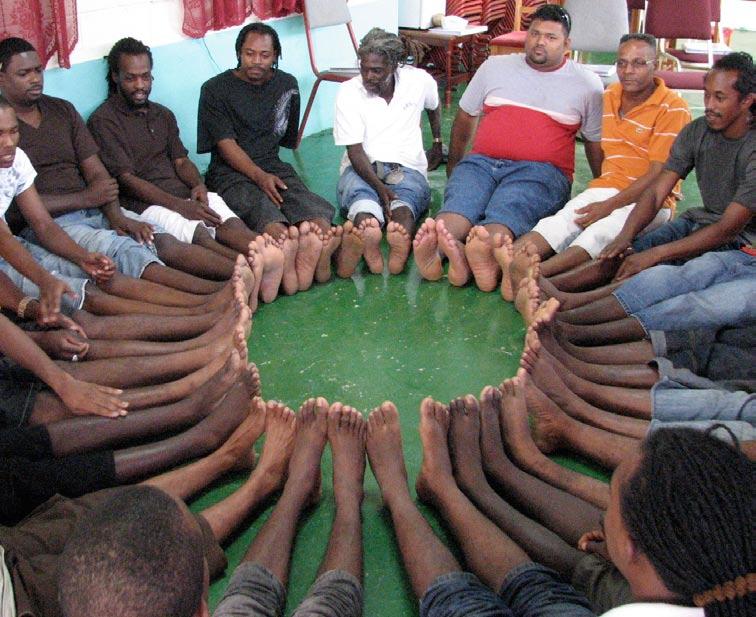
strengths and weaknesses, (…) referencing them to social action that can enhance community cohesion”.
The programme managers took “a holistic and multi-disciplinary approach in the context of human development – (in) the development of livelihoods and greater quality of life for community well-being, encompassing (issues of) governance, health, education, infrastructure, economics, human rights, environment, crime and violence, the drug trade and issues associated with these as it impinges on community and family life.”
One expected outcome of The Gatekeepers’ programme was the initiation of a community action programme using male leadership as the engaging tool for community well-being. In this regard, the green shoots of success are already apparent after the first 3 years. The men have started a welding programme and a sport academy to provide training in football for youth in the area. The Gatekeepers have even begun to work with the IRPP. This programme is also being reviewed.
Overall, the self-help approach (albeit necessarily facilitated) adopted by BG T&T appears to be working. Three years following its inception change is coming to St. Mary’s and Barrackpore. An assessment of the intervention is being undertaken against the achievement of a series of agreed activities and objectively verifiable indicators of success. Motivated by their work with families in the IRPP, some of the community-based agents have sought higher levels of formal training in social work. There is evidence of slow but certain healing among some of the families that participated in the interventions, since people are taking charge.
“It is critical to note,” says the Toco Foundation, “that this is not a one year project or a ‘one and done’ activity but one that takes into consideration that behavioural change and societal change require time to test results, as well as evaluate activities”. “In this regard we think that experience and intent can best be monitored by the established mechanisms and procedures for monitoring the project’s operations to ensure the activities remain as planned. In this way the company can ensure that the project remains directed towards stated objectives and that appropriate corrective actions are being taken to deliver the right results.”
T&T CSR REVIEW 2013 2�
St Mary's Village Moruga Gatekeepers participate in training programme
C ORPORATE P ROFILE
One of the largest and most successful indigenous banks in the English-speaking Caribbean. Republic Bank Group employs over 4,200 staff members in the Caribbean. At the financial year ending September 30, 2012, the Group’s total asset base stood at US$8.1 billion and earned new profit US$183 million after tax. Republic Bank is the largest credit card operator in Trinidad and Tobago, with assets under management of over US$4.1 billion. The Bank’s Trust and Asset Management Division is the most experienced in the country. Its banking services reach the length and breadth of Trinidad and Tobago, with 40 branches and 112 ABM’s, as well as state of the art internet and telephone banking, which allow customers to conduct their business 24/7 from any part of the world.
CSR S TRATEG y
We firmly believe that we have a part to play in helping struggling communities to enhance the quality of life for themselves and future generations and in building a system of ethics that will endure well into the future. Our Power to Make a Difference Programme is the primary mechanism through which we achieve this objective.
2012 F OC u S A REAS:
The development of young people through education, sports and the arts
Poverty alleviation through training programmes for “at risk” youth and the provision of facilities for elderly members of communities
Helping differently-abled persons and groups find their place in this world. We use the mechanism of training and provision of physical facilities to help them to become more self-sufficient and to themselves contribute to the society of which they are a part.
Planning, Precision and Proficiency - Engineering CSR Delivery at Republic
Beyond Philanthropy
In 2003, under the leadership of Anna-Maria Garcia-Brooks, General Manager Group Marketing and Communications, Republic embarked on a review, refocus and strategic planning exercise to align its CSR focus with the Bank’s business management practices. The adoption of this highly structured management approach to the delivery of Republic’s CSR programming was intended to enhance the quality and timeliness of responses to the many NGOs and citizens seeking corporate support of their efforts to address the pressing needs of the communities in which they operated.
At the heart of the structured approach is the soft centre of a caring corporate response in recognition of a social contract which speaks to the responsibility of business to the needs of the community that has shaped Garcia-Brooks’ design of the face of Republic in the community.
“We are inspired by those who have suffered abuse, abandonment and profound poverty, yet have overcome these challenges and have gone on to help others….Working with and through NGOs and CBOs made us more effective and better equipped to empower those already in the trenches with the tools to ‘make a difference.”
The Power to Make a Difference was launched in 2003. It adopted a 5 year business planning approach:
Year 1 – Design
Year 2 – Implement
Year 3 – Monitor
Year 4 – Assess
Year 5 – Modify
The Plan calls for focus on three specific areas of need:
The development of young people through education, sport and the arts
Poverty alleviation through training programmes for at risk youth and the provision of facilities for elderly members of communities
Helping differently-abled persons and groups find their place in this world. We use the mechanism of training and provision of physical facilities to help them to become more self-sufficient and to themselves contribute to the society of which they are a part.
Focus ensures that available resources both human and financial can be brought to bear on the selected areas to bring about lasting impact.
Four Pillars: Power to Care, Power to Help, Power to Learn and Power to Succeed further streamline projects for consideration from among some 500 requests received annually.
The Power of Partnership
The 2003-2008 Plan focused on Power to Help/Poverty Alleviation and Republic initially committed an unprecedented investment of TT$40m. The addition of major projects would see that figure rise to TT$52m over the 5-year period. TT$25.4m went to youth empowerment programmes, TT$19.9m to social programmes in the areas of healthcare, and youth development.
TT$6.7 was channelled to projects that sought to build an entrepreneurial spirit among young
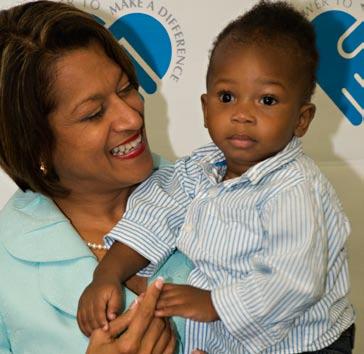
2� T&T CSR
2013
REVIEW
• • •
• • •
“Republic Bank recognises that building communities goes far beyond sporadic donations. It is about social investment and a genuine long term commitment to partner with like-minded organizations to change mind-sets and provide opportunities for persons to learn, achieve and prosper.”
Ronald F. de C. Harford, Chairman of Republic Bank, champions the bank’s CSR philosophy which has guided its social performance for more than 170 years.
CSR Story
Hope of a Miracle Foundation
persons. A programme of construction of much needed homes for senior citizens: The St Vincent de Paul Republic Bank Home for the Aged, The Salvation Army Home for the Elderly, The Society des of Amantes de Jesus and the L’Hospice Home for Elderly Women, attracted an investment of TT$5.3m.
Republic has discovered how corporations can drive effective CSR programmes across myriad disciplines unrelated to their core business – the power of partnership.
Republic’s winning strategy has been to partner with registered charities, non-profit organizations and other reputable agencies, relying on subject matter expertise, roots in the community and tested mechanisms to deliver targeted and successful projects. Where management capability has been lacking, Republic has brought considerable corporate management skills to bear on improving project management, accounting and resourcing. Skilled professionals from the community participate on advisory boards to bring real world insights and objectivity to project selection, design and execution. They also work with international agencies and local NGOs such as the Hope of a Miracle Foundation, the Helen Bhagwansingh Diabetes Education Research and Prevention Institute (DERPI), and Transplant Links.
Acting in response of a looming health crisis evident in the onset of diabetes in schoolaged children, a 2009 partnership with DERPI screened 60,000 primary school students, one third of whom needed some type of attention. The impact of this is that awareness of the disease has increased among households nationally, and actions such as revised nutrition plans and even treatment have either halted
Foundation for Enhancement and Enrichment of Life (FEEL)
the onset of the disease or saved lives through timely intervention.
An international partnership with Transplant Links - U.K. based surgery teams working pro bono to undertake kidney transplants for children in Trinidad and Tobago since 2009 is the only such offering in the Caribbean. 13 children have had successful transplants so far and the Republic CSR team measures success one precious little life at a time and multiplies this by the countless years pulled back from dim futures. Hope of a Miracle, a locally based NGO supported by Hispanic Women living in Trinidad, has secured funding for 20 critically ill children to receive treatment abroad for specialty areas not addressed locally.
Power to Care
September 2013 marks the end of a second 5year phase. This phase was dedicated to Power to Care which sought to empower the Differently Abled community. To deliver on this programme, which is probably Trinidad and Tobago’s most
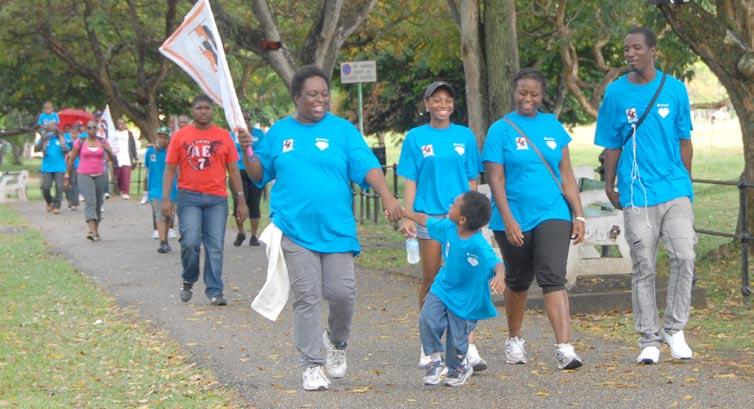
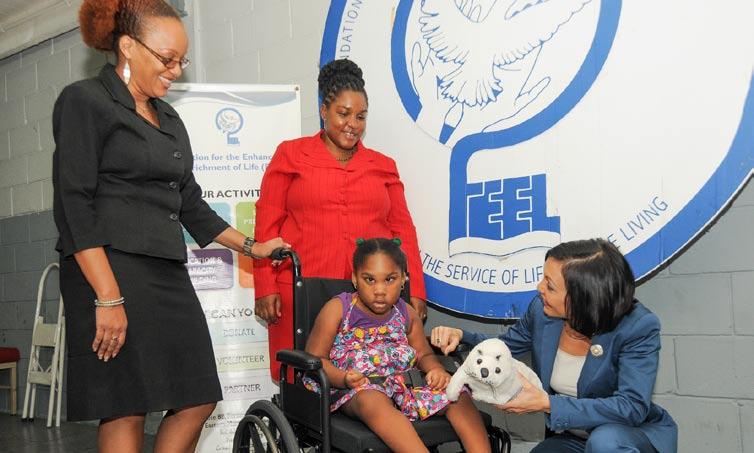
expansive programme of social performance, Republic earmarked TT$100m. In 2012 alone, Republic has supported about 130 organizations. The process of selection of an organization is a robust one: registration with the Board of Inland Revenue, comprehensive plans and supporting budgets are required, a joint panel of Republic executives and external professionals decides. Site visits are not uncommon if only to have a first-hand appreciation of the proposal. Timelines for the submission of proposals must be observed.
Successful Phase 2 NGOs include the Autistic Society of Trinidad and Tobago and its drive to provide Therapy and Parent Training. The project creates awareness among teachers and parents and highlights the early symptoms of autism. In Trinidad some 20,000 persons are known to be affected by autism and the programme facilitates appropriate psychosocial responses. The Adult Literacy Teachers’ Association (ALTA), which has been at the forefront of adult literacy coaching for many years has been able to expand its programmes to reach over 5,000 persons, due to the intervention of Republic Bank.
Nadia Williams, Social Investment Officer believes, ‘The sustainable impact of what we do is to empower society’s doers, building capabilities and ensuring the long-term ability of these organizations to provide quality social support to maintain the fabric of society. Sometimes our brand identity and corporate reputation are brought to bear on a considered association and this can enhance the ability of our partners and gain the support of other donors. Next step for us as we approach Phase 3, is to enhance our techniques and approaches to measurement of the impact on both the company and the society of the programmes we support.’
T&T CSR REVIEW 2013 2�
Walking for autism
So, what kind of return does Republic expect on investment in CSR? Garcia-Brooks remains focused on the heart of the matter, “While we acknowledge and respond to public expectations of our social performance, our philosophy on CSR is driven more by our recognition of the existence of a social contract that requires us to do the right thing. As we
create closer alignment between our CSR activities and our business processes, we are aware of the many benefits: greater efficiency in our delivery of CSR that positively impacts our partners, enhancement of the capabilities of our partners which increases the potential for more sustainable programmes (and the resulting long-term benefit to society), more
effective deployment of financial resources, high motivation and engagement levels of our staff, and the maintenance of public trust that is invaluable to a quality relationship with our stakeholders. But in the end, the biggest return of all, is the knowledge that we could make a difference – and we did!”
Projects undertaken in 2012/2013 fiscal year
POWER TO CARE
Arts Insight - ‘Through Art There is Realisation’ programme National Centre for Persons with Disabilities - resource upgrade of the assessment unit
Olive’s House - construction of the multi-purpose hall
The Cotton Tree Foundation - Bathroom facilities for Differently-abled
Access
L.I.F.E. Centre - Construction of a school for Autistic children
Persons Associated with Visual Impairment - Stepping Out Programme
St. Ann’s Cascade Motivational Programme - Sponsorship of remedial classes
Autistic Society of Trinidad and Tobago - Therapy sessions
Republic Bank Make a Difference Fund for Sick Children - partnership with Hope of a Miracle Foundation, Helen Bhagwansingh Diabetes, Education, Research & Prevention Institute and Transplant Links
Dyslexia Association - Visualising and Verbalising Training for Teachers
Cancer Society - Edufest & Walk against Cancer
Eternal Light Community - Goshen Home for Women (roof repairs)
POWER TO HELP
St Joseph’s Convent - Retreat and Holistic Development Centre –Construction of Conference Hall
Church of the Nazarene - Construction of the Multipurpose Community Building
Eternal Light & Word of Life Communities - Repairs to the Goshen
Home
Habitat for Humanity - Construction of homes
New Life Ministries Drug Rehabilitation Centre - Facility Upgrade
Providence Girls’ Catholic School - Expansion of ‘A’ Level facilities
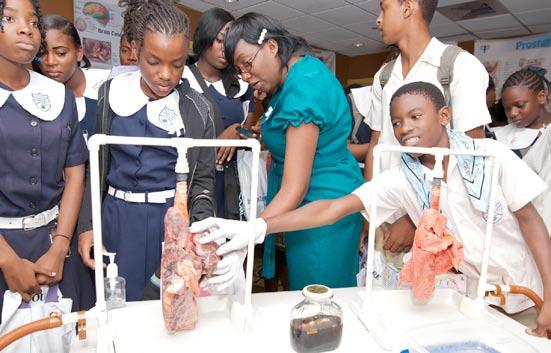
South East Port Of Spain Cultural Workshop Inc. - Upgrade of facilities
T & T Transparency Institute (TTTI - Youth against Corruption Today programme
Vision on Mission - Rehabilitation Centre for Female Ex-offenders
Loveuntil Foundation - Peer pressure student intervention programme
POWER TO LEARN
Emancipation Support Committee - National African Quiz & Spoken Word Competition
Sacred Heart Girls’ RC School - Reaching Every Child
St. Andrews Private School - Special Needs Education Workshop
Adult Literacy Teachers Association - Remedial Classes
Sanch Electronix - development of the Pete the Pan Stick software programme
Love Movement & Berkeley Music Scholarship - investment in a Youth Outreach Programme & provision of music scholarship
Butler Institute of Learning and Labour - investment into a remedial studies programme
Sanatan Dharma Maha Sabha - Baal Vikaas Vihaar
Cotton Tree Foundation - investment into a homework centre programme
POWER TO SuCCEED
Angels on Earth Foundation - Purchase of a bus
Naparima College - Purchase of a Bus
Presentation College San Fernando - School Refurbishment
Tackveeyatul Islamic Association - Warrenville T.I.A. Primary School
HERO Film Ltd - Ulric Cross: A Hero for All Time - documentary
Marlins Swim Club - Upgrade of pools
Republic Bank Exodus - Sponsorship of band
Republic Bank Arrows Basketball Team
Republic Bank Laventille Basketball league
Republic Bank Laventille Netball League
Republic Cup Youth Football Tournament
Republic Cup Youth Football Clinics
Jane Young Golf
Starting New at Golf (SNAG) Clinics
Caribbean Amateur Junior Golf Championship - Sponsorship of the National Team
Republic Cup Football Coaches Seminar
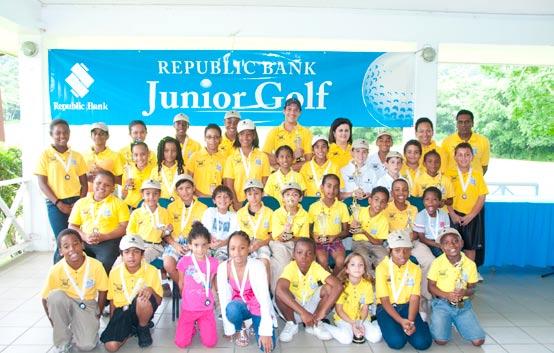
2� T&T CSR REVIEW 2013
EDUFest Tobago
• • • • • • • • • • • • • • • • • • • • • •
• • • • • • • • • • • • • • • • • • • • • • • • •
Junior golf tournament

T&T CSR REVIEW 2013 2� n n n n n n
C ORPORATE P ROFILE
Established in 1975 by the Government of Trinidad and Tobago (GOTT), The National Gas Company of Trinidad and Tobago (NGC) plays a key role in the development of the local natural gas-based energy sector. In 2013, after 38 years in the gas-based energy business, NGC is a diversified group of companies comprising the NGC parent, subsidiary and associated companies whose operations dominate major segments of the local natural gas value chain.
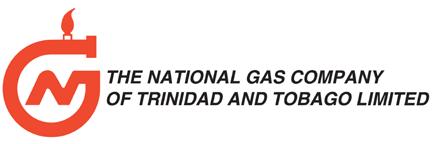
Our core activities include:
Offshore gas compression in the Teak and Poui Fields;
Transmission, sale and distribution of natural gas to gas-based industry;
Gas pipeline construction, operation and maintenance;
Industrial site development; Port and marine infrastructure development and services;
Upstream gas and oil production in the Teak/Samaan/Poui (TSP) marine fields; NGL production facilities; and, LNG production and marketing.
In 2012, NGC’s gas sales were 1,629 Million of standard cubic feet of gas per day (MMscf/d) with total assets of US$1.4 billion and after tax profit in excess of US$ 611 Million.
Our vision: NGC’s Vision is to be a valued partner in the global energy business. With a financially secure position, NGC is leveraging its significant local experience and robust financial condition to pursue global natural gas and related energy business opportunities. In this regard, NGC will offer technical expertise and seek investment opportunities in the activities of pipeline construction and operation, NGL production, gas transmission and distribution, gas compression, industrial estate management and the marketing of gas-based products. NGC is currently in discussion with a number of newly emerging gas economies and welcomes partnerships with foreign and local companies, particularly energy service companies, as we seek to build and promote the T&T Brand to the world.
CSR STRATEGy
NGC has introduced an innovative Community Economic Development programme which seeks to utilize the physical, human, social and cultural assets of the community to promote economic growth and self-reliance. This is a distinctive feature of NGC’s approach to CSR and community engagement.
Pillars of Change: NGC is Partnering National Development
Among national business institutions in the energy sector, the programme of Corporate Social Responsibility (CSR) conducted by The National Gas Company of Trinidad and Tobago (NGC) is best described as a flag bearer for national development. The state-owned, independently operated company launched an active philanthropy, community relations and community engagement programme twenty-two years ago with the formation of a Community Relations Department within its Point Lisas operations. This act was in recognition of a need for NGC to play a more prominent role in the development of society.
Sustainable economic development in a developing country such as ours depends on education, poverty alleviation, job creation, and the management of a national economy that is driven by the energy sector. NGC’s outreach began with a focus on the communities impacted by its extensive pipeline network which distributes natural gas to the energy hubs of Trinidad. A major consideration at the time was understandably risk mitigation and related community-based social investment. The installation of NGC’s “Project 2000” pipeline was challenged by community-led work-stoppages. For the first time in NGC’s history, demands by local communities for jobs and community investment in exchange for “passing a pipeline through their backyards” had emerged as a major risk to projects and even some of NGC’s operations. The Company’s community relations strategy would therefore evolve to meet these
challenges encountered.
NGC channelled more of its resources to the development of socio-economic interventions that targeted the poor and the socially disadvantaged and tightened the framework of community engagement in response to the largely legitimate expectations in its so called pipeline communities. NGC focused on building sustainable relationships and communities via its sponsorship of training modules that fostered job creation and employment.
With significant experience garnered at the micro-community level, NGC has subsequently expanded its outlook to the macro or national level. The Company partners with groups and organizations to develop programmes which are designed to tackle some of the burning socioeconomic issues which are facing the Trinidad and Tobago society including: rising unemployment, crime and juvenile delinquency.
NGC narrowed the focus of a previously broad-based approach by establishing five pillars of support: Community Economic Development, Community Engagement, Youth Development, Reforestation, Contributions and Sponsorships.
Pillar 1: Community Economic Development (CED)
Skills Training
In contributing to national development, Community Economic Development (CED) leads in capacity-building in the communities within which it is conducted. In 2012, an Emergency Medical Technician (EMT-B) course was conducted in Mayaro and its environs. According to NGC’s Manager, Corporate Communications – Charmaine Mohamed, “The programme is in alignment with our commitment to safety in all our gas-based operations and environments that are close to our critical facilities by enriching, as far as possible, the quality of their safety resources. NGC was therefore keen to provide training for eight students in life-saving and life preserving for rescue situations.”
30 T&T CSR REVIEW 2013
• • • • • • • •
•
CSR Story
FOCuS AREAS Community Economic Development; Community Engagement; Youth Development; Reforestation; Contributions and Sponsorships.
• • •
•
The more recent Tobago Pipeline and NorthEast Offshore (NEO) Pipeline Projects have brought with it increased attention to Tobago. In collaboration with Metal Industries Company Limited (MIC), NGC will sponsor the Tobago Plant Maintenance Scholarship Programme – a full-time training programme for up to twenty (20) young Tobagonians between the ages of 17-25 years for a one year period, and include an apprenticeship component. Trainees are provided with hands-on, cutting-edge industrial and plant maintenance experience in preparation for potential job opportunities at NGC’s Tobago Gas-Inlet Facility at the Cove EcoIndustrial Estate and Business Park at Lowlands, Tobago. NGC trains not only to meet its own human resource needs, but is cognizant of its contribution to the skills’ development bank for other plant maintenance opportunities that may arise at Cove.
A Building Construction Technology (BCT) programme has been undertaken in collaboration with the National Energy Skills Centre (NESC) and the Division of Education of the Tobago House of Assembly (THA) for twenty (20) young Tobagonians between the ages of 1725 years. The 9-month programme commenced in July 2012 and designed to provide the necessary practical and theoretical training to individuals seeking employment, as well as persons already employed in the construction sector. Here again, NGC sees the development of capability and competence at this level as the building of a resource base of skilled workers with the potential to be upgraded to foreman, supervisory and higher levels of responsibility within the construction industry. This was done in two cycles - one in July and one in December. Again in partnership with NESC and the Department of Marine Resources and Fisheries, NGC sponsored two (2) Tobago Outboard Boat Engine Repairs programmes that targeted some forty (40) boat owners, sailors, fisher folk and other persons who were interested in learning the fundamentals of outboard marine engine repairs and maintenance. NGC held consultations with the Department of Marine Resources and Fisheries before launching this training effort conducted in Goldsborough and Buccoo respectively. This sponsorship aims to build the capacity of the Tobago fishing community and to strengthen existing relationships with the Tobago fisher folk. It also supports the safety aspect of NGC’s sponsorship of the Tobago Commercial Fishing Competition,
which is held in June each year.
The Bethel Empowerment Skills Training (BEST) agricultural programme seeks to impact the economy of Trinidad and Tobago by reviving the local agriculture industry in Tobago. It aims to develop Tobago’s youth by eradicating dependency and fostering entrepreneurship and innovation. It is anticipated that the project will derive significant, measurable socio-economic benefits, and serve as a stepping stone to sustainable economic growth for the island as a whole.
A one-year programme at Sherwood Park teaches short crop production to fifty (50) trainees who will produce crops that are in demand by the hotels, restaurants and markets in Tobago. Another site in Plymouth was equipped as a processing centre for fresh seasoning, tomatoes, flavouring and sweet peppers and produce from the Sherwood Park site. NGC will, in conjunction with the National Entrepreneurship Development Company Limited (NEDCO), provide training to fill any competency gaps that may exist in the group.
Pillar 2: Community Engagement Community Awareness and Emergency Response (CAER)
Emergency preparedness is given maximum priority for a company such as NGC that handles and transports natural gas. Driven by NGC’s “duty of care” for communities impacted by its pipeline construction and operational activities, the CAER programme provides communities and schools located close to critical installations
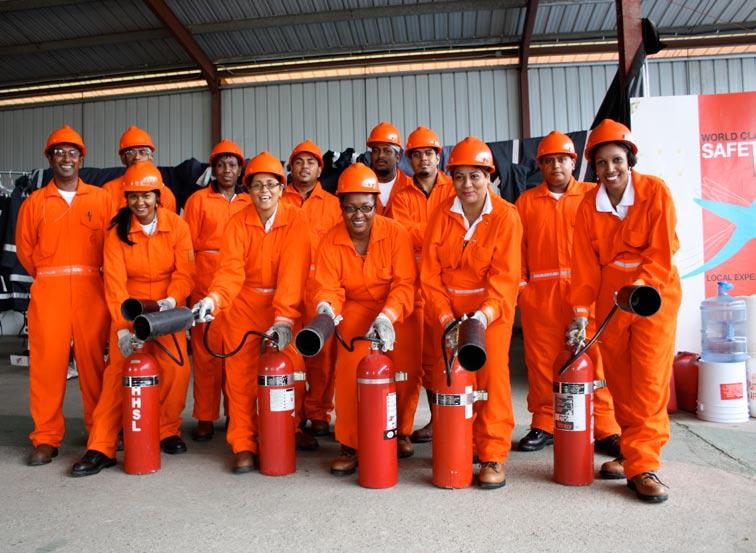
with information on natural gas safety, the inherent risks, mitigation measures and response techniques in the event there is an unforeseen natural gas-related emergency. NGC visits schools and communities and provides safety assessments, follow up drills, provision of safety equipment, such as fire extinguishers, muster signs and air horns, and teacher training workshops which comprise basic Fire-Fighting, First Aid and CPR.
In 2003, during the construction of the 56-inch-diameter Cross-Island Pipeline (CIP), the Beachfield Upstream Development (BUD) Slug catcher and marine pipeline, and Union Industrial Estate Projects, NGC initiated a Community Awareness Programme that involved the creation of mobile communication centres as bases for local outreach programmes that provided points of contact for one-toone discussion and a convenient way for communities to voice their concerns when they arose. A Community newsletter – Beyond the Pipeline – was produced and widely distributed in communities in Trinidad and Tobago.
Indeed, NGC, in partnership with various regional corporations, and Office of Disaster Preparedness and Management, has invited Disaster Management Teams (DMTs) to attend lectures about the gas industry and to form Community Emergency Response Trained (CERT) Volunteers at the community level. The CERT Volunteers are trained by Trinidad and Tobago Voluntary Emergency Response Trainers (TTVERT) over five-day periods. The course has included modules in Disaster Medical
T&T CSR REVIEW 2013 31
Community awareness and emergency response
Operations, Fire Safety, Search and Rescue, CERT Organization, Disaster Psychology, Terrorism and a Disaster Simulation Exercise /Drill.
Natural Gas Literacy Programme
The natural gas literacy/public education programme is driven by the link NGC sees between its role as an industry developer and the creation of informed publics ranging from primary school to the tertiary level.
NGC is committed to the development and implementation of a natural gas literacy programme that targets all age groups. At the secondary school level, the Gas Rush Game Competition was launched at the National Institute of Higher Education, Research, Science and Technology (NIHERST) 2008 SciTechKnoFest. It is designed to teach the fundamentals of natural gas to secondary school students in a fun, yet meaningful way.
The Company also strengthened its programme targeting tertiary-level students by partnering with the University of Trinidad and Tobago (UTT) in a workshop programme first hosted by NGC in 2006. Each workshop comprises three, one-week modules of presentations, demonstrations and field trips which provide students with a basic tertiarylevel understanding of the natural gas industry. In 2012, 153 students participated in the programme.
In keeping with its objective of taking natural gas to Tobago, NGC installed an Information Booth at the Gulf City Lowlands Mall so that residents could receive information about the Tobago Pipeline Project and have any concerns relayed to and addressed by NGC’s Project Team. Over 1500 persons visited the information booth
in 2009. This outreach also included natural gas presentations which were made to groups and schools throughout Tobago.
As the Tobago community is new territory to NGC, the Company participated at the NIHERST/ THA Science Fair for primary and secondary students where it presented learning modules on natural gas and its properties, safety and the environment, and the Tobago Pipeline Project. In November, NGC hosted an exhibit booth targeting the general public in the Scarborough area. General information about natural gas and the environment and the Tobago project was provided to over 150 persons.
A Natural Gas Lesson Plan has been developed for primary schools. NGC created two characters Monkey and Iguana, after learning that these were the two most common animals seen along its Rights of Way. The Monkey and Iguana Natural Gas Lesson Plan targets standards 2 and 3 primary school children. The two animals are used to provide important messages on gas safety and the uses of gas, to name a few. Plans are in train to initiate the roll out of the lesson plans to primary school teachers in all the eight (8) education districts of Trinidad and Tobago.
Facilities Development
NGC continues to pursue a programme of facilities development and upgrade as a crucial aspect of its policy of constructing, renewing and/or upgrading facilities in communities throughout Trinidad and Tobago. NGC’s construction and refurbishment works have focused on facilities used for education and training, the arts, recreation, sport, community gathering and social services. These structures are designed to provide communities with improved infrastructure and amenities. In
most cases, the projects are carried out in collaboration with governmental agencies and other stakeholders in the villages and communities. In 2012, a number of projects were executed in partnership with relevant stakeholders, regional corporations and the Ministry of Sport and Youth Affairs. Five critical projects were undertaken:
The construction of the NGC Couva Joylanders Pan Theatre, Railway Road, Couva;
The upgrade and extension of the Caldrac Recreation Club, California;
The upgrade of the YTC Gymnasium, Arouca;
Leo Thompson Recreation Ground, Gasparillo – Phase 1;
Operation Smile in White Lands, Poonah, lower Williamsville (temporary accommodation).
In 2013, more attention will be given to recreation, social and cultural facilities in keeping with an objective to improve the quality of life in communities.
Pillar 3: youth Development
Youth Development through sports has sought to promote healthy lifestyles amongst young people who may be tempted by crime if not involved in positive activities such as sport. The company has therefore been the mainstay of support for the Primary Schools Track and Field Games in Moruga, St. Patrick and Caroni.
One programme which is of particular interest having been developed internally, is the NGC Right on Track Coaching Caravan. This is a science-based, developmental programme that exposes boys and girls, 8-19 years old to the skill sets needed in Track and Field and Basketball. The track and field component was sanctioned by the North America, Central America and Caribbean Athletic Association (NACAC) and introduced in four countries of the Eastern Caribbean.
Since 2012, NGC has been a sponsor of the Trinidad and Tobago Cricket Team and the official T20 Partner of the Trinidad and Tobago Cricket Board and its developmental programmes. Of major significance is the wider objective of NGC’s partnership which is to develop cricket at the youth club and national levels.
NGC sponsors four (4) Police Youth Clubs in Couva, La Brea, Beetham and Laventille Road.
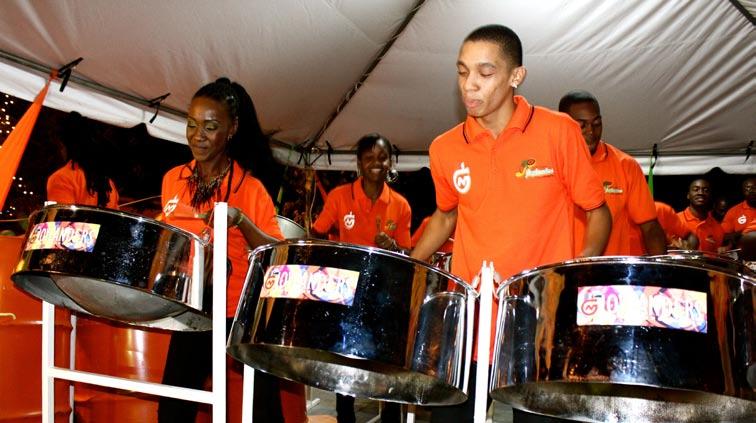
32 T&T CSR REVIEW 2013
• • • • •
NGC Couva Joylanders Pan Complex
These clubs service “high risk” communities whose residents may be of low socio-economic status. Support is considered as one step to empower young residents through their involvement in uplifting activities offered by the clubs such as capacity building workshops.
Pillar 4: Reforestation
In keeping with a “No Net Loss” forest principle, the company embarked on a reforestation programme in July of 2005 to offset the forest cover removed during three major projects. Approximately 100 hectares of forest were cleared to accommodate the 56-inch-diameter, Cross-Island Pipeline Project (CIPP) and the Beachfield Upstream Development Project (BUD) (85 ha CIPP and 15 ha BUD), and approximately 200 hectares of primary and secondary forests were cleared to facilitate the construction of the Union Industrial Estate.
NGC therefore embarked on a ten (10) year ‘ex situ’ reforestation programme aimed at rehabilitating 105 hectares of critically degraded forest within a 2.5 km radius of the CIPP and BUD project sites, as well as 210 hectares of similarly degraded forest in the Morne L’Enfer Forest Reserve, Parrylands - a total of 315 hectares.
Pillar 5: Contributions and Sponsorships
In 2012, monetary investments have been directed by NGC to projects that have meaningful impact on lives both at the community and national levels. For-example:
In Education – (a) ‘Reading to Learn’ Programme designed to improve literacy in the primary schools of Beetham, Morvant, Laventille and Tobago; (b) the continued sponsorship of the NIHERST National Science Centre; (c) the signing of an MOU with the University of the West Indies, St. Augustine for a professional chair in Innovation and Entrepreneurship. The initial
period of assistance is for five (5) years with an option to renew;
In Human and Social Development - support for Couva Children’s Home and Crisis Nursery, the maintenance of Deeds of Covenant to various institutions to sustain their activities in the provision of social services, literacy, and education in communities throughout Trinidad and Tobago;
In Arts and Culture - financial contributions during the Carnival season to 39 unsponsored steelbands, sponsorship of the acclaimed Lydian Singers and the St. Augustine Chamber Orchestra. NGC routinely assists the Tobago Heritage Festival, Trinidad and Tobago Film Festival, the San Fernando Junior Arts Festival (SANFEST), the NGC Bocas Lit Fest, and the fourday Pan Trinbago SteelFesTT launched in 2012 to commemorate the country’s 50th Anniversary of Independence.
In 2012, NGC sponsored the NGC Couva Joylanders and the NGC La Brea Nightingales
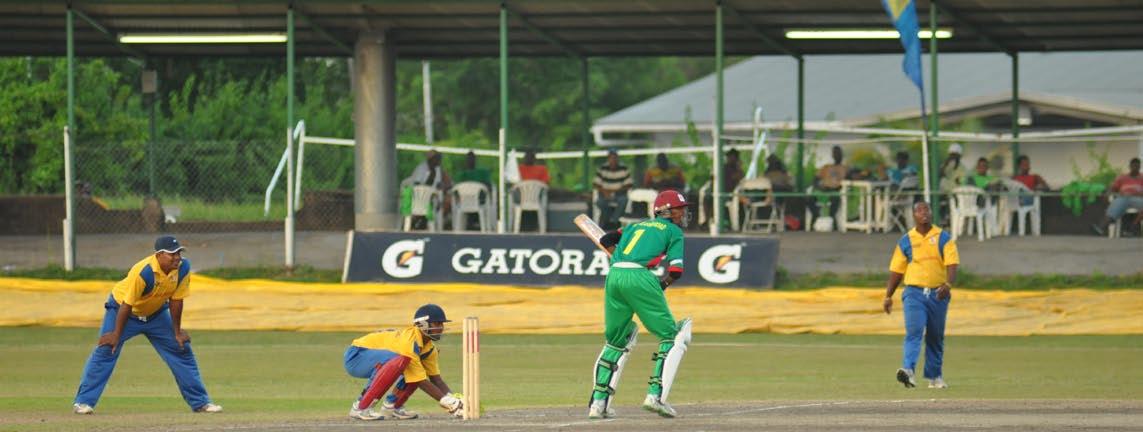
Steel Orchestras. The sponsorship will encompass capacity building and music literacy in 2013, as well as create sustainable modern organizations that can ultimately manage their own affairs, increase social capital in the communities and be good ambassadors for NGC, and, by extension, the pan fraternity.
By electing to be a partner in national development, NGC acknowledges that successful businesses, perhaps those that are statesponsored, must align their goals and initiatives with the social, economic and developmental goals of the nation as a whole. NGC’s Triple Bottom Line approach has impacted the People of its internal and external communities; the Planet through its adherence to sustainable environment practices; and through the astute management of its Profit, which brings not only fair returns to a stakeholder that is ultimately the people of Trinidad and Tobago, but adds further value through extensive financial investment in social programmes that underscore national development.

T&T CSR REVIEW 2013 33 Cricket
Steelfest 2012
CORPORATE PROFILE
Nestlé is a multi-national Company which has evolved over the past 140 years, into the world’s No. 1 Food, Nutrition, Health and Wellness Company dedicating much of its resources to product innovation in an effort to meet consumer’s needs both from a taste as well as a nutrition standpoint. Its early beginnings involve one of its founders, Mr. Henri Nestlé, a chemist and inventor by profession, who produced the first Infant Formula (Farine Lactée) in 1867, at a time when infant mortality was increasing at an alarming rate.
Good Food Good Life is Nestlé’s corporate motto, one which governs its core focus of ensuring that in every part of the world where the Company operates, Nestlé plays a role in enhancing the quality of the consumer’s life every day, everywhere through its products and the development and execution of activities and opportunities for consumers to learn healthy eating habits for themselves and future generations to come.
As part of Nestlé’s long term corporate strategy for success, the Company is committed to creating value for its shareholders and society by doing business in ways that specifically help address global and local issues in the areas nutrition, water and rural development. For Nestlé, Creating Shared Value means proactively identifying opportunities to link its core business activities to action on related social issues.
For Nestlé there is no higher priority than enhancing the quality of life of our consumers by providing tastier and healthier food and beverage choices.
Nestlé Trinidad and Tobago Limited (NTTL) is governed by the same principles of Creating Shared Value as set out by its global operations. Over the past 50 years the Nestlé Valsayn Factory has continued to ensure the highest quality and taste of its locally manufactured products and through its on-going initiatives and programmes, supports local authorities to ensure the longterm health and wellbeing of consumers in Trinidad and Tobago.
Creating Shared Value
- Nestlé 2012 Highlights Trinidad and Tobago
Obesity in Trinidad and Tobago and for many parts of the Caribbean is growing at alarming rates. In the National Risk Factor Survey (STEPS) conducted in 2011, it was found that 55% of the population were overweight or obese, over 40% did not get sufficient physical exercise, 91% eat less than the recommended 5 servings of fruit and vegetables daily and 50% of persons aged 24-64 years had 3 or more risk factors for noncommunicable diseases. In addition to this it was noted that 25% of secondary school-aged children were overweight or obese, as a result of which we have significant increases in the prevalence of Diabetes among this age group.
There is a clear linkage between Obesity and Non-Communicable Diseases (NCDs) such as high blood pressure, high cholesterol and cardiovascular diseases and the most common causes being “genetic factors, lack of physical activity, unhealthy eating patterns, or a combination of these factors”.
According to Denise d’Abadie, Manager of Consumer Relations and Public Affairs at Nestlé Trinidad & Tobago Limited, “Obesity can be tackled through targeted education and support mechanisms for adopting a healthy lifestyle including a good balanced diet, regular exercise and stress reduction”.
Nestlé prides itself as the World’s leading Nutrition, Health and Wellness Company and this distinction is reflected in the company’s CSV programmes. The Company believes that societies should benefit wherever it operates both in a social sense as well as an economic sense. Creating Shared Value is pervasive throughout Nestlé’s operations and governs the way the company does business. Here in Trinidad & Tobago, Nestlé understands that in doing business right it must be “in tune with and responsive to the social, environmental, economic and cultural aspirations of its consumers, whilst ensuring…shareholders a reasonable return on their investment”.
Following the Nestlé global best practices, Nestlé Trinidad & Tobago Limited has consolidated its CSV strategy into three key areas of sustainability – Nutrition, Water and Rural Development. This includes investing in public education programmes which heighten awareness of the benefits of eating healthy, exercise and mental health giving consumers the basic tools to leading a healthy lifestyle. Multiple channels are utilized in the company’s ongoing wellness advocacy. Conferences, mobile units, in-school educational programmes, events and social media, all help in the delivery of comprehensive programmes which promote, educate, and incentivize healthy lifestyles.
The Nestlé Wellness Caravan in T&T
First, what exactly is a Wellness Caravan? Denise d’Abadie comments, “ The Nestlé Wellness Caravan is a mobile unit that offers communities free BMI and Body Fat% testing supported by free one- on-one on consultation with certified nutritionists. The primary objective of this initiative is to reach out to consumers, giving them the opportunity to avail themselves of trusted information which will motivate them to lead a healthy lifestyle for them and their families”.
The Wellness Caravan uses 5 simple steps as its core to Healthy Living – Eat Healthy, Control Portions, Be Active, Check Health and Be Happy, offering consumers a holistic approach to living a healthy lifestyle. As Denise d’Abadie explains “there is a proven correlation between healthy lifestyles and longevity, mental performance and happy, healthy people”. Silvan Muller, Country Manager NTTL, emphasizes this point and why nutritional education is so important to the company, “At Nestlé, providing nutritional solutions to all segments of the society is central to our Creating Shared Value agenda. As he further explains, our commitment is to improve “the quality of life and…the health and wellness
34 T&T CSR REVIEW 2013
CSR Story
of our consumers”. The Nestlé Wellness Caravan is closely aligned to the ambitious objectives of the ‘Fight the Fat Campaign’ of the Ministry of Health whose mission is to reduce the prevalence of non-communicable diseases including HIV/Aids, Obesity, Heart Disease, Diabetes and Osteoporosis.
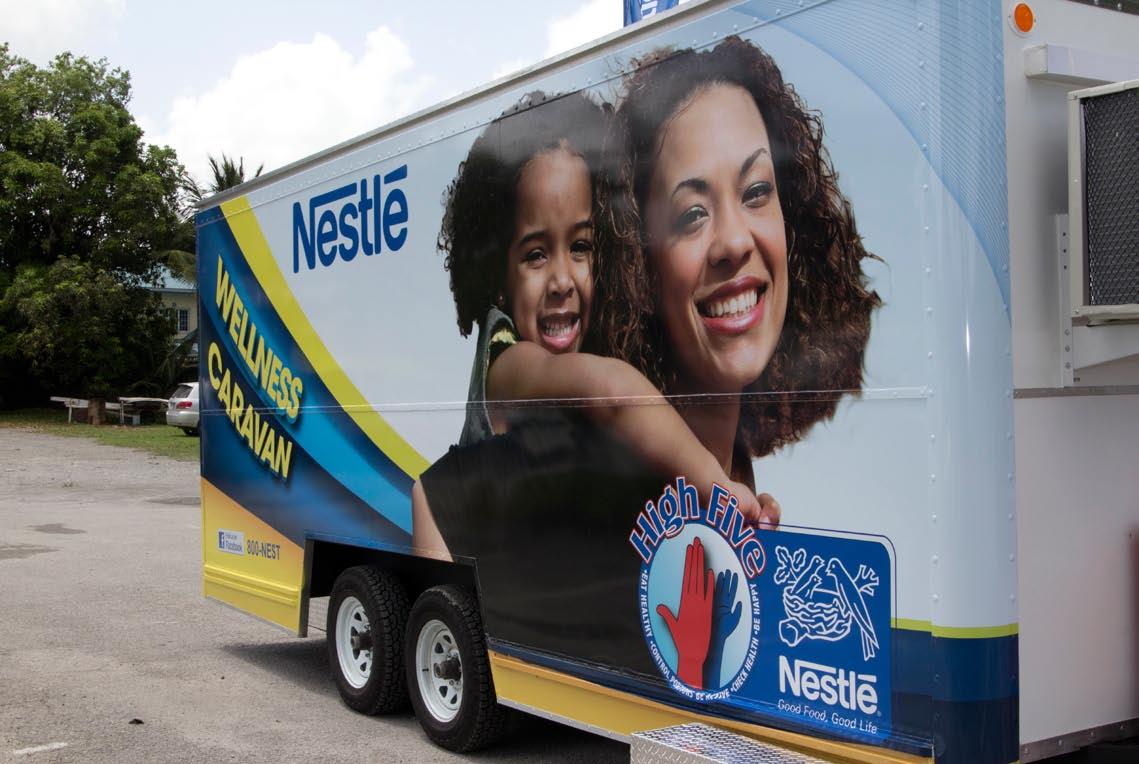
Breakfast – the most important meal of the Day
As part of Nestlé’s ongoing commitment to educating consumers on the basic elements of leading a healthy lifestyle, the Nestlé Breakfast Initiative, which has been consistently delivering its message in supermarkets for many years, is specifically targeted to consumers who believe
that skipping breakfast will help them lose weight. Not so, according to Nestlé nutritionist, Shaunelle Mieres. “Breakfast is the most important meal of the day and should provide you with 25% of your daily energy requirements. Having 3 meals every day is critical to healthy eating and living and can help consumers
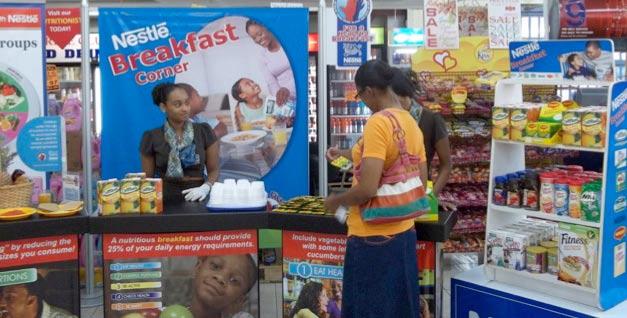
T&T CSR REVIEW 2013 3�
The Wellness Caravan
Nestlé Breakfast Corner
regularize their weight in a healthy manner.”
As such the Nestlé Breakfast Initiative provides consumers with easy breakfast ideas with the aid of certified nutritionists who take the time to explain the many different benefits of having breakfast daily – another testament to Nestlé’s commitment to ensuring healthy eating habits among the TT population.
Putting healthy eating habits on the Curriculum
With an increasing prevalence of Diabetes amongst school children in Trinidad and Tobago, the Nestlé Healthy Kids Global Programme was introduced, as a pilot project, to 3 primary schools in Trinidad with the specific objective of inculcating the basic elements of health living amongst the children.
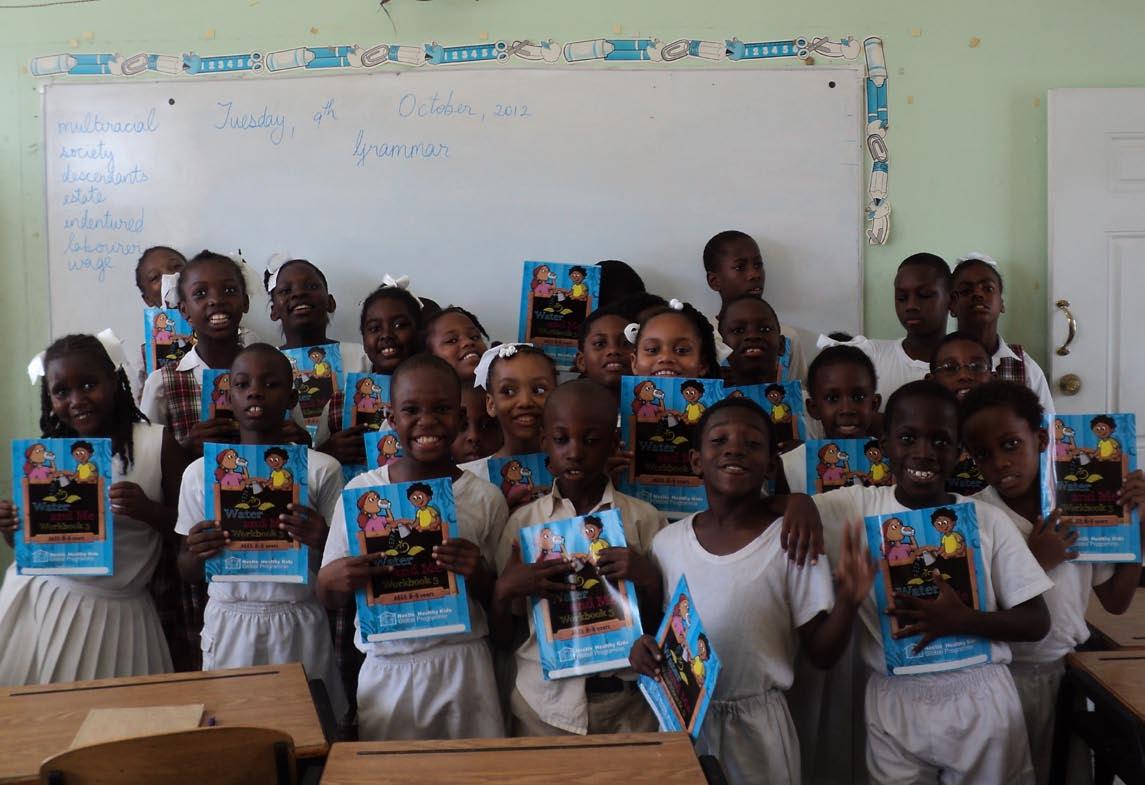
This three-year programme includes six educational modules delivered to children between the ages of 6 and 12 years by their teachers and focuses on the basic principles in healthy eating, active living, basic hygiene and disease prevention. The programme uses worksheets and goal cards to reinforce the modules. In an effort to reinforce the message as home, parents are integrated into the programme through interactive sessions with nutritionists at Parent Teacher meetings and are kept updated on the key messages of the programme through ongoing newsletters.
Nestlé’s operations have, in many ways, become inextricably linked with nutrition because of programmes such as this.
Early education can generate requisite shifts in eating habits and can help save an entire generation from lifestyle diseases associated
with poor diet and inactivity. The company believes that reaching out to children at an early cognitive stage of their lives, can have a lasting positive effect on their health. Although the programme is global, there are unique local features reflective of idiosyncrasies of each locale. Nutritional guidelines must take cognisance of foods that are easily available, seasonal fruits and vegetables and the peculiar health issues of each population. Before a new “Healthy Kids” programme is developed therefore, it goes through a pilot or test phase and tracks and monitors proposed interventions and gaps to ensure its suitability for the community. Strategic partnerships with government, community organisations, and professional bodies in athletics and nutrition, is how Nestlé works collaboratively to deliver its programmes.
3� T&T CSR REVIEW 2013
As an extension to this programme Nestlé sponsors an annual One Day Summer Camp at its Valsayn facilities where school-aged children are taught the basics of leading a healthy lifestyle through interactive fun activities which also encourage physical exercise as a critical part of leading an healthy lifestyle.
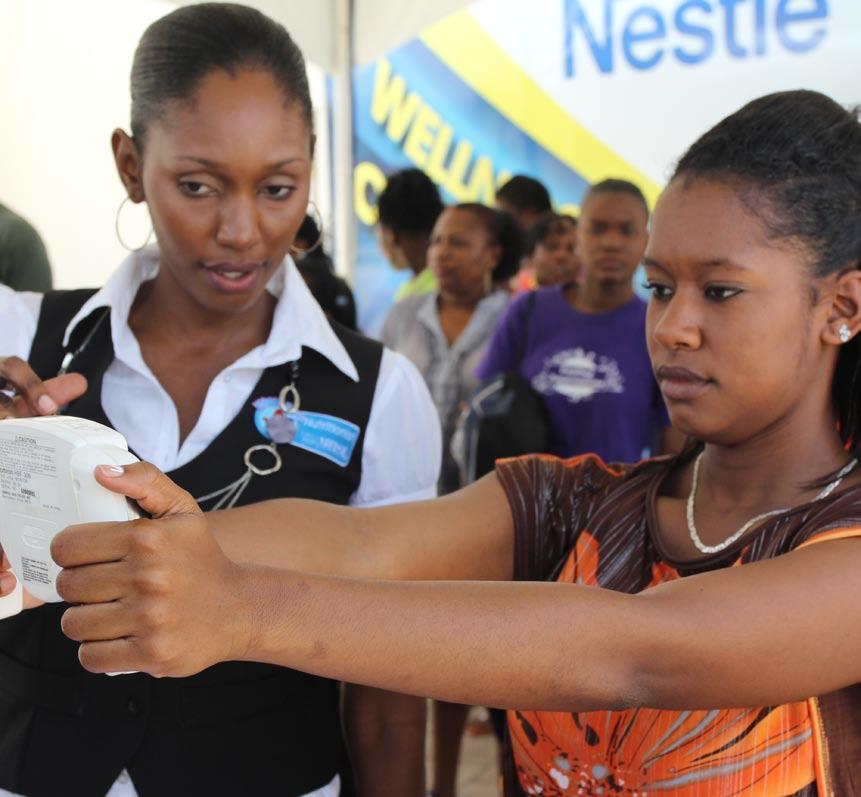
The Nestlé Brand Distinction
Nestlé’s CEO Paul Bulcke, acknowledges that Nestlé has created brand distinction through its wellness agenda. Last year, in his report on the company’s fiscal performance, Bulcke shared that “Our nutrition, health and wellness agenda continued to bring enhanced benefits for consumers, greater brand differentiation in the market place, and increased value for shareholders”. Good nutrition at Nestlé is clearly good both for business and for society.
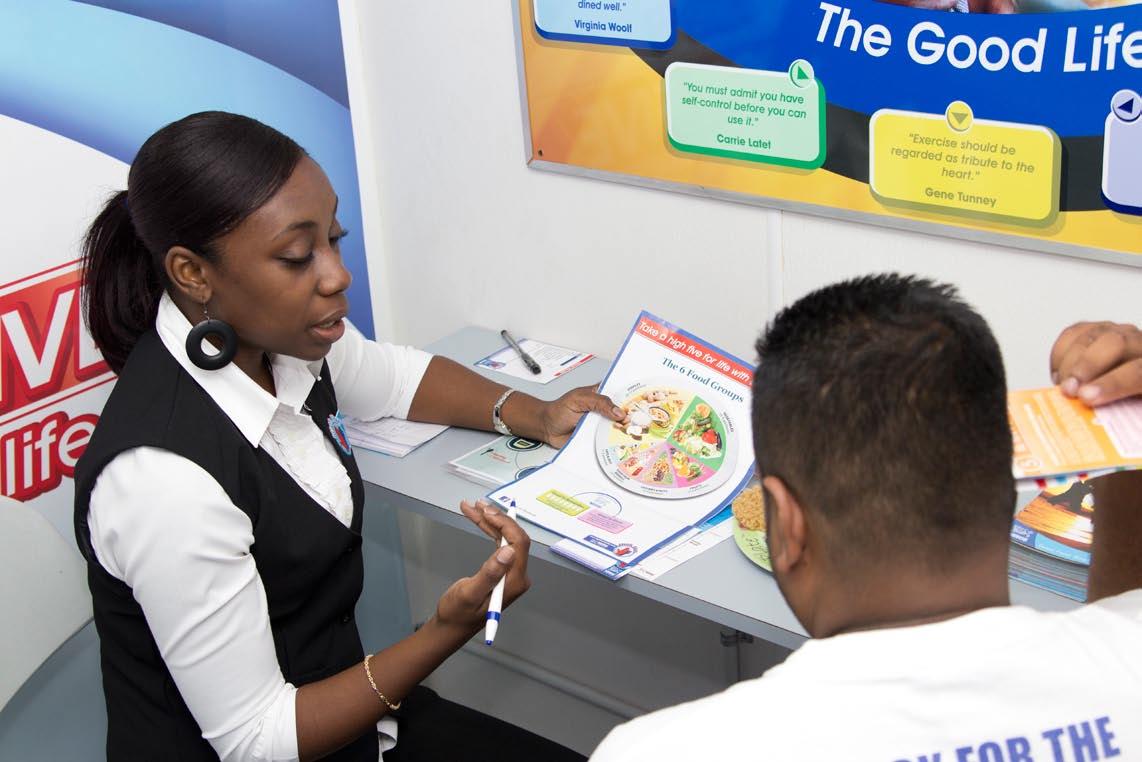
Measuring the consumer’s body fat percetnage
T&T CSR REVIEW 2013 3�
C ORPORATE P ROFILE
Methanex’s operation in Trinidad and Tobago represents 2.7 million tonnes of methanol per year, making this an important production centre in the organization’s network. Methanex Trinidad Limited has been managing and operating the 2-plant facility situated on the Point Lisas Industrial Estate in central Trinidad since May 01, 2006. The company exports 100 percent of its methanol production, contributing to Trinidad and Tobago’s position as the world’s leading exporter of methanol. The Methanex-owned Titan Plant has an annual production capacity of 900,000 tonnes. The Atlas facility features one of the largest single train methanol plants in the world, with an annual production capacity of 1.8 million tonnes per year.
CSR S TRATEG y
Methanex Trinidad’s active Social Responsibility engagement is delivering long term value for local communities, its employees whose volunteerism is a big part of the company’s community outreach, and other stakeholders. Maintaining a focus on Responsible Care and leadership development, the company is creating and supporting programmes that contribute to the sustainable well-being of its fence line and national communities.
2012 F OC u S A REAS
Responsible Care (safety, health, environment and community outreach) Education Partnership with Employees
Leading Responsibly - Methanex Trinidad Focuses on Value Creation
Within seven years of its operation, Methanex Trinidad Limited has already established itself on the local landscape as an employer of choice and a responsible corporate citizen. In 2009 and 2010, the Energy Chamber of Trinidad and Tobago’s “Recognizing the Value of People” CSR Leadership Awards were won by this young company. The Trinidad facility was also recognized by its parent company, Canada-based Methanex Corporation, for the best Responsible Care performance among the organization’s global manufacturing facilities in 2010. A year later, Methanex Trinidad posted the highest scores for Employee Engagement, leading the Manufacturing group with an unprecedented result of 74%. More recently, in 2012, the local team earned accolades from the American Chamber of Commerce of Trinidad and Tobago for its Responsible Care management system in relation to plant turnarounds, as well as the demonstrated commitment to a work ethic of safety, health and environmental compliance.
In its strategy to engage the Trinidad and Tobago community, Methanex Trinidad has integrated principles of the global enterprise which speaks to standards of Responsible Care which guide Methanex’s operations worldwide. What has emerged is a distinctively crafted vision and applications to improve standards and practices for better worker safety and health, environmental compliance, process and product safety, emergency preparedness and community outreach. Methanex Trinidad’s vision for community outreach, backed by an investment of some TT $7.6 million over the last seven years, is largely driven by employees and an active programme of volunteerism.
Winning Employee Engagement
The focus on Partnership with Employees has contributed to a win-win for both employees and the wider community. A holistic approach that blends international cross-fertilization opportunities with a concern for employee wellness and empowerment can be credited
to high levels of employee engagement that bolstered the growth of volunteerism at Methanex Trinidad. In 2008, an independent survey of employee attitudes in the fledgling company showed a low score of 33% (out of a possible 100%). This was met with deep corporate introspection. Initiatives to enhance the workplace experience, employee welfare (e.g. onsite Medical Centre, Cafeteria and meal subsidy, Wellness Centre), internal communication and the development of employees resulted in a 41% increase, taking the employee engagement score to 74% three years later.
The Company believes that its attention to the development of people, both within and outside of the company, has delivered results by which its sustainability impact can be assessed. “The engagement score is one example that reflects our proactive role in the community, the way we turn our commitment into action. Volunteerism gives meaning to employees’ performance and workplace interaction because it builds leadership skills, teamwork and a special camaraderie that grows through social interaction. Very importantly, their values are aligned with those of the organization. This synergy makes volunteering easy; it makes devoting their 9/80 days off to community-giving an easy choice,” says Charles Percy, Managing Director and CEO of Methanex Trinidad Limited.
Conceptualised by Kassie Seeteram, a Senior Process Plant Operator, the ‘Mentoring Our Children’ programme took root in 2007. It began as a response to clearly perceived differences in the academic performance of students in less privileged schools located in fence line communities, when compared to that of students attending the more established and better resourced institutions. Five years and 56 students later, the programme has grown from the initial two schools - Carapichaima and Couva Junior Secondary - to include Preysal

3� T&T CSR REVIEW 2013
• • •
CSR Story
‘Mentoring Our Children’ graduation
High and Waterloo High. This initiative is encouraging young students to think about the opportunities that can come through good education, sound values and responsible choices.
Volunteerism Builds Skills, Communities
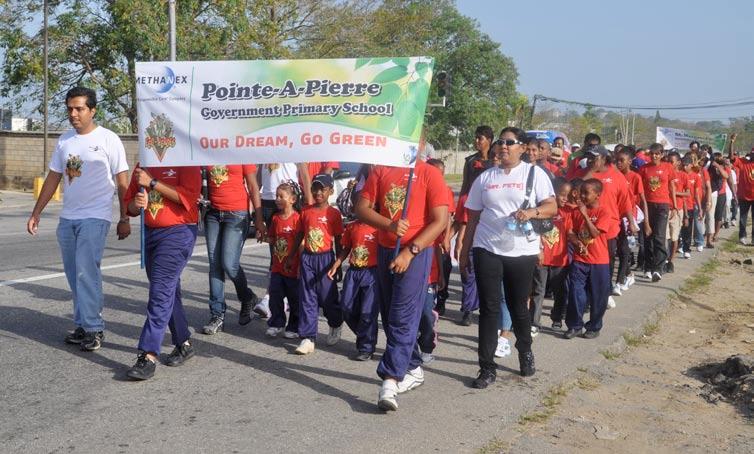
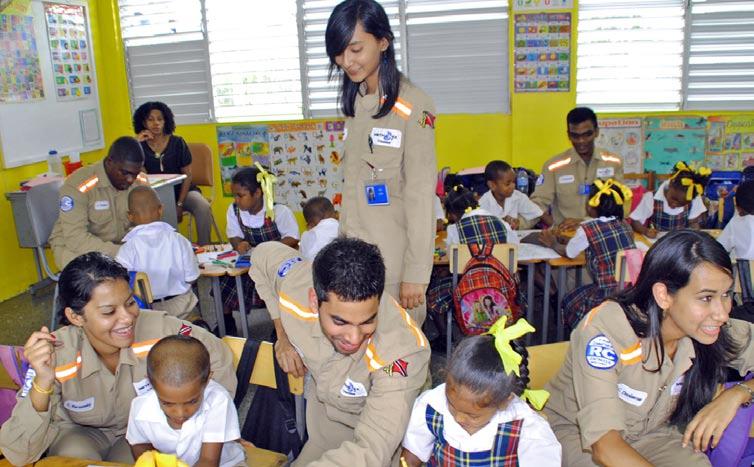
Through partnering with employees in voluntary service, Methanex seeks to build on the sense of social responsibility that already exists among its employees. Volunteerism strengthens the trust among the company, its employees and the community. It also provides, at no cost, some of the management expertise necessary for the success and sustainability of community projects. As an investment, it pays off through a return of the deepening of employee skills and the development of leadership qualities.
Among employee volunteers are Project Management Professionals who provide coaching, via workshops, to principals of the partner schools in the company’s Eco Heroes project, to develop scopes for and manage the mandatory environmental projects.
Endorsed by the Ministry of Education, Eco Heroes is a Methanex signature project based on annual walkathon fundraisers in which primary schools participate. Students raise funds which Methanex matches up to TT $10,000 per school. In three years since the initial 2009 walkathon, Eco Heroes has raised over TT $500,000 to assist 22 schools. Sixteen schools have completed projects ranging from playground upgrades and outdoor classrooms to library enhancements, establishment of music rooms and gardening projects. Education Ministry’s Clare Telemaque, School Supervisor III says, “The Eco Heroes initiative has shown students that with every improvement to their schools, they can be the ones to bring about positive change.”
In 2012 alone, Methanex employees logged a total of 688 volunteer hours: 323.5 hours on the Mentoring Our Children programme and 224.5 on the Eco Heroes initiative. Methanex hopes to seed a national culture of volunteerism; the company operates a Vacation Internship and Graduates in Training (GIT) programme with a volunteerism component. Interns are challenged to undertake a needs’ analysis of the community which then becomes the basis for the development and implementation of a project. Interns raise their own funds for
the project which is matched by Methanex. In 2012 the group selected the enhancement of library facilities and refurbishment of the infants’ wing of the Couva South Government Primary School. Methanex matched a record TT $17,000 raised by the team of 13 GITs and Interns who planned and executed the project during the school’s August vacation break.
Next Steps - Metrics
The ‘Mentoring Our Children’ and Eco Heroes projects continue to develop a quality process: there is commitment to social responsibility and a clear link to core CSR values of education. While in the Mentoring programme the issue of underperformance of disadvantaged students has been identified, there is admittedly room for the gathering of more information to support a more complete scoping of the project to give further consideration to content and the inclusion of other student profiles.
This is currently receiving the attention of the project team managers. Beyond appraisal reports produced by schools that show improvement in the performance of students involved in ‘Mentoring our Children’, programme managers are seeking to develop a set of criteria that show sustainability and the meeting of the expectations of the community.
There are plans to extend the Eco Heroes project nationally and to support teacher training in environmental learning, plastic recycling and renewable energy projects. This outlook strengthens the sustainability of the impact of the programme. An important consideration for Methanex is to observe the correlation between employee volunteering and the development of leadership and good citizenship skills for deployment to the society at large and which can add meaning to sustainability goals.
T&T CSR REVIEW 2013 3�
Community outreach
Methanex Eco Heroes walkathon
C ORPORATE P ROFILE
The Power Generation Company Of Trinidad And Tobago Limited (PowerGen), was established on December 23rd, 1994 and is a joint venture company. The shareholders of the Company are The Trinidad and Tobago Electricity Commission(T&TEC) (51%), Maru Energy Trinidad, LLC of Marietta, Georgia (39%) and Amoco Trinidad Power Resources Corporation, (BP’s power subsidiary), of Houston, Texas (10%). The main function of PowerGen is to generate power for supply in bulk form to T&TEC who in turn breaks the power down to lower voltages for distribution to their industrial, commercial and residential customers. PowerGen owns, operates and maintains the three power stations at Port-of-Spain, Point Lisas, and Penal, with a total installed capacity of 1386 megawatts, consisting of 23 generating units.
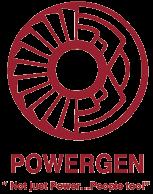
C OMPAN y CSR S TRATEG y
PowerGen’s corporate philanthropic policy is: “Youth Development Through Sport and Education”. This is a core value of the Company and employee volunteerism supports this value.
CSR
S TRATE g IC F OC u S
The company contributes annually to education and training at a national level through its Schools’ Art Competition and its support of University and Technical/ Vocational Scholarships, as well as Scholarships for Primary School students. The company also sponsors the only annual National Special Children’s sports day; and is the single largest contributor to youth cricket in the form of the PowerGen Secondary Schools‘ Cricket League.
2012 H IGHLIGHTS (T&T)
Powerful Minds - Making the Million Dollar Mark in Scholarships
Sporting Minds – Secondary Schools’ Cricket League and Special Children’s Fun Day
Artful Minds – The PowerGen Art Wall
Igniting Young MindsPowerGen is a Canvas for Youth Development
PowerGen seeks to ignite young minds to develop and pursue their natural talents to achieve success in various areas of sport and education. Speaking about her company’s vision for youth, HR & Corporate Communications Manager Sonya Lequay says, “CSR for us is a passion, it’s not just about social responsibility”. Lequay explains that throughout the organisation’s three locations in Port of Spain, Point Lisas and Penal, many employees are deeply involved at the community level in giving back to the society in many ways. Technicians, electricians, engineers, senior management and staff at all levels are giving skills and expertise to repair and raise funds for homes and care institutions, provide food, and even extend neighbourly assistance when there are natural disasters.
At the end of last year, many members of staff worked tirelessly in the pre-holiday season sourcing food items and gifts as they prepared in a very personal way to host a Children’s Christmas Treat at the Penal power station and for their Christmas pilgrimage to some 90 homes to share joy, spend some time and connect with those who had many other things on their minds – the least of them, celebration. This is just one of the many community related activities that employee volunteers spearhead to help the less fortunate in the various neighbouring communities.
Sporting Minds
The company’s CSR programme provides great value for its brand. If asked what does PowerGen do in the community, most people will likely respond with “cricket”. And that’s because for nearly two decades, the company has invested heavily in youth cricket and can single-handedly lay claim to helping to form and shape some of the nation’s best youth cricketers. Certainly well-known names such as Daren Ganga and the Bravo brothers have all been beneficiaries of the PowerGen Secondary Schools’ Cricket League.
In a recent interview with a leading national newspaper, the Manager of the PowerGen Cricket team, Chaitram Ramjitsingh, said, “We have a very good cricket clinic at PowerGen and we have a number of good young players coming out every year.” He added, “We want to give them the best opportunity to get out into the field and play cricket and we see this tournament as a major step for them”. Over the years several PowerGen Team members have gone on to play regionally and internationally, making a career of the sport. One such is Samuel Badree who has been lauded internationally as the most economical bowler in T20 cricket.
In 2012 PowerGen celebrated the 20th anniversary of its annual Special Children’s Fun Day. Over 30 schools from Trinidad and Tobago, and one school visiting from Barbados, participated in a fun filled day of sporting activity on the grounds of the Penal Power station. The children also enjoyed a performance by calypsonian Nadia Batson, getting even the quietest child to participate according to their individual abilities. PowerGen is committed to ensuring that this event remains an annual highlight for the nation’s special children as an avenue for the recognition and development of their sporting ability.
Powerful Minds
The theme of PowerGen’s Scholarships Awards Programme is “Partnering to generate powerful minds through education”. The programme is designed to advance knowledge and expertise in the areas of science and technology and is executed through a number of annual bursaries in specific areas of learning. Every year the company disburses scholarships in Engineering, Sciences and technical training with institutional partners - the University of the West Indies (UWI), and the Youth Training and Employment Partnership Programme (YTEPP). YTEPP focuses on Technical/ Vocational Education and Training in some 12 occupational areas.
40 T&T CSR REVIEW 2013
• • •
CSR Story
At UWI, scholarship recipients are expected to demonstrate a sustained high standard of academic performance in addition to serving as positive role models to other young people in their communities and maintaining a passion for excellence. To date, PowerGen has provided over 70 scholarships to students at the UWI St. Augustine Campus.
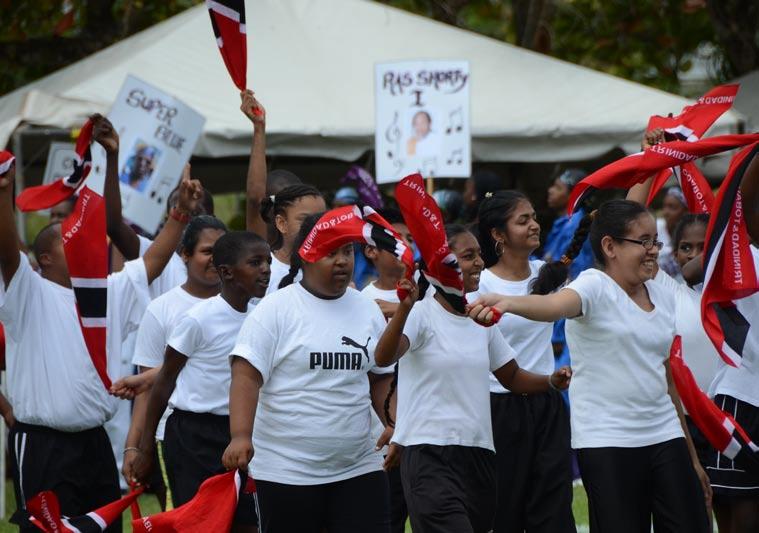
PowerGen also treasures its partnership with the National Centre for Persons with Disabilities (NCPD). Through scholarships and funding for academic and vocational training, PowerGen also endeavours to assist young persons with disabilities to realise their full potential and make their individual contribution to the national community.
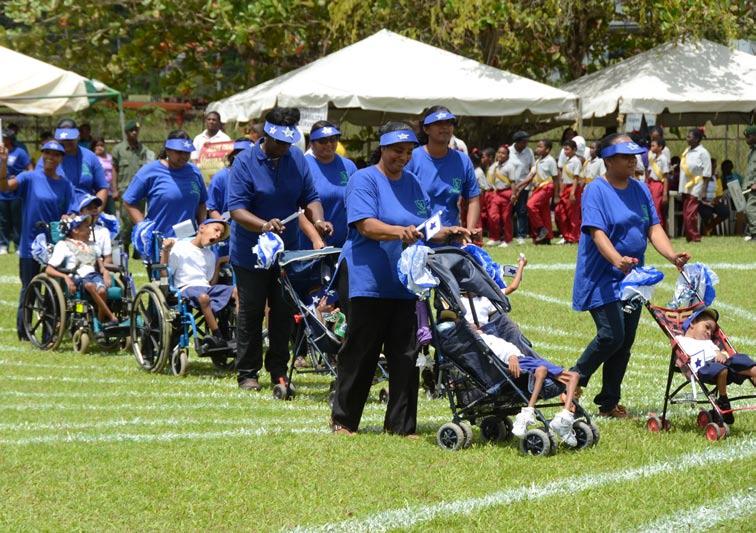
Since 2000, through its education partnerships and scholarship programme, PowerGen’s investment in the academic and vocational development of our nation’s youth has exceeded the million dollar mark.
Artful Minds
In 2011 PowerGen launched a new programme – The PowerGen Schools’ Art Competition and PowerGen Art Wall. The 2012 instalment of this programme, held ahead of the nation’s 50th anniversary celebrations, targeted all primary, secondary and special schools throughout Trinidad and Tobago inviting submissions from students to celebrate our country, our culture and our people under the theme “Sweet Sweet T&T – Celebrating Our Golden Jubilee”. The competition attracted over 50 students.
Creating a bold, new look for its perimeter walls, PowerGen’s Port of Spain facility has
become a canvas for art – a kind of people’s gallery in open, public spaces. If one takes a drive along Wrightson Road in Port of Spain, huge displays, many 10ft by 10ft, depict a myriad of local imagery ranging from steel pans, to seascapes and landscapes, carnival and festivals, folklore and a number of abstracts. Entries were judged in three categories – Special Education, Primary and Secondary Schools. Glendon Crepin of the Autistic Society of Trinidad and Tobago, was one of the finalists selected by the judges. Crepin’s piece featured on our cover, depicts the fusion of local cultures through his selection of musical instruments - the steelpan, African drum, and sitar.
Architects for Change, an international organization that promotes culture as a resource
for generating sustainable development, believes that engagement in cultural expressions such as music, art and literature “can help the world’s youth while focusing on self-sufficiency instead of charity”. According to Architects for Change, “by introducing young people to the cultural wealth that surrounds them and giving them an education, we can provide them with the key tools they need for their development and freedom”. Director of Human Resources and Administration at PowerGen, Dr. Hyacinth Guy supports this view. As she explains, “the art competition can be seen as yet another opportunity for the commoditization of indigenous culture, and a real alternative source of income for young entrepreneurs.”
As a vehicle of expression, the art work has provided some deep insights into the lives and experiences of our nation’s youth. Some of the work is traditional and reflects some common themes which reinforce local culture and identity. However, some pieces draw us into the very complex world of adolescence and the sometimes traumatic transition that this phase presents.
The PowerGen brand is strong and so too is the power it gives to the many youth of our nation as they pursue their dreams and aspirations. The company’s programmes in education and sport continue to provide critical skills and better opportunities for a brighter future. With solid support from PowerGen and armed with an energising “can-do” attitude, artful minds, sporting minds and powerful minds are forging their way forward for sustainability and viable economic growth.
T&T CSR REVIEW 2013 41
Community Engagement
Comprises Natural Gas education programmes, emergency response training to create first responders in any emergency and facilities development.
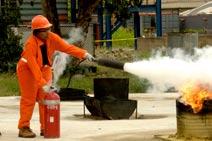
Youth Development

We invest in cricket, track & field, and recently in the opportunities provided at the Police Youth Clubs at La Brea, Couva, Beetham and Laventille Road.

Real Energy Comes From Connecting Our Resources
Reforestation

Our “No net loss” programme replants forests degraded due to NGC’s pipeline construction activities.

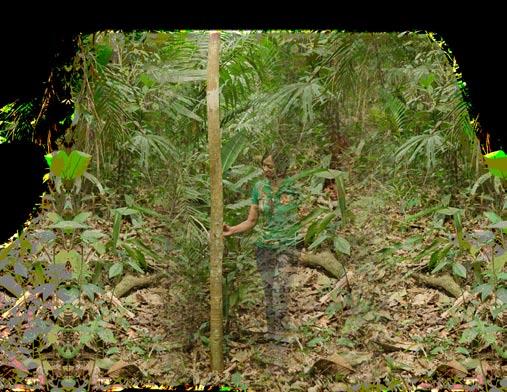
Contributions & Sponsorships


We contribute to education, human and social development, arts and culture activities such as NGC Bocas LitFest, SteelFesTT, The Lydians, NGC Couva Joylanders and NGC La Brea Nightingales.
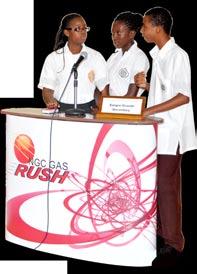
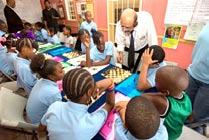
Community Economic Development
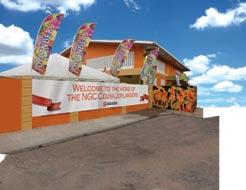
For the development of sustainable communities via training modules to foster job creation.
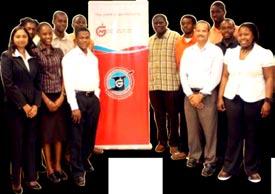

One kind of our Nation’s wealth lies below the surface. It’s what NGC’s business is all about.
Then there is wealth above ground, visible in many triumphs of our citizens. NGC’s robust corporate social responsibility strategy helps people live lives rich in opportunity and motivation. Our close ties to numerous projects have given vital support to our Nation’s youth, the arts, capacity building via training and education, reforestation, natural gas emergency training and literacy programmes.
Real national growth is multi-faceted. It’s not just about economic—but also societal—development. We are proud when a new steelband centre energizes a community; we feel joy for every young person whose future is transformed by our helping hand. T: (868) 636-4662/4680 | F: (868) 679-2384

• • • •
VIRTUAL EDITORS© PROFESSIONAL EDITING & WRITING SERVICES

Your very own 24-hour on-demand editing & writing service is just a click away!

Virtual Editors© is a team of ten professional writers and editors from a wide range of disciplines and working from various global locations to respond to all your writing and editorial needs.
With years of academic and corporate experience, our writers guarantee the best possible standards of work when you do business with us.
There is no need to meet in person since all transactions are handled virtually.

No contracts required
All enquiries treated with absolute confidentiality
Payments are made directly to our accounts or by bankers-cheque 24-hour turn around on most projects
http://www.facebook.com/VirtualEditors
Email: virtualeditors@yahoo.com
Phone: 1.868.687.ED1T (687.3318)
It’s almost 1:00 pm on Saturday afternoon and I’m heading to St. James to meet two young women for lunch. We’re meeting at a popular pizza restaurant because that’s what Adasha likes to eat – moreover, it’s a convenient meeting point for us. Adasha and Patricia are sisters whom I first met at a Christmas gathering at the St. Jude’s School for Girls where I volunteer. On that occasion they came to share their life story with current residents at the School and how much their stay at the institution saved their lives.
This meeting was just as teary-eyed for us as the first. At the Christmas dinner in 2010, the girls recounted their dramatic entry into the School and the sudden end of their world as they knew it. Born to a drug addict mother,

OUR LIFE STORY The Journey to and from St. Jude’s
By Donna P. Ramsammy
the girls were two of six sisters who struggled for basic necessities from the time they could remember until they each found help from some good Samaritans. For Adasha and Patricia, that help came circuitously through a series of interventions. Recounting those moments for me over lunch was somewhat painful as it opened up long closed wounds. It also meant that for the first time they were making very public, aspects of their lives that were once very private. I asked them if they were sure they wanted to do this because from here on people will see them differently. Colleagues who knew nothing about their past will now gain an insight they have never shared before. But the young women are adamant. They want people to know that whatever help is given to
44 T&T CSR REVIEW 2013
CSR Feature
Photos by: Andre Neufville
places like St. Jude’s, that help provides more than food, shelter or supplies – it transforms lives like theirs. And in this instance, a little investment has paid off in a big way.
Of all their childhood memories, it is the long periods of being left alone that stands out most. Their mother would disappear for days when she went off on a drug binge. Often she left no food behind. There was no electricity, no running water, no stove and no neighbours for miles. On one of those occasions, Patricia recounts making a pumpkin leaf pelau on a coal-pot stove for her and her baby sister. She would have been about eight years old at the time and Adasha six. She had actually learnt to cook from watching her mother. Because there were some good days when she would be home and stable. Patricia watched eagerly as she cooked lunch or made roast bake for breakfast and these lessons served her well on the days when her mother would disappear. In her sober moments she would be deeply apologetic about their recurring abandonment, her addiction and the conditions they were forced to live in.
Often they changed homes, moving with their mother whenever she found a new partner. It created tremendous insecurities and vulnerabilities for the girls and they had to quickly learn how to navigate the peculiar circumstances they often found themselves in. The girls made a pact to always look out for each other and to protect each other no matter what. That closeness persists to today. There is an obvious affection and concern in the way they address each other. They easily share every detail of their lives with the ease and intimacy reflective of a very close bond.
Patricia is just two years older and she recalls running away on a number of occasions – always with Adasha in tow. After nights of sleeping in someone’s gallery or hanging out where they could get a meal, they would return to the bleak and empty house in the hope that their mother had returned. They lived in Pt. Fortin for most of that period – except for a two month period when an older sister asked someone she presumed to be Adasha’s father to take the two girls in. The excitement of moving to Port of Spain soon gave way to anxiety as they realized that this guy had no intentions of caring for them in a fatherly way. A hurried intervention took them back to Pt. Fortin to the home of a friend of their mother’s, an old church-going man whom we
shall call Mr. B. for this story. Mr. B was barely able to care for them but his home provided a safe space for the two girls. By now the eldest was renting, the second eldest was living by our maternal grandmother and her husband and the two other teenagers were living with their father. He was financially unable to take two more in; and the eldest sister had no means to support them as she was out working most of the day and trying to make her own ends meet. But both young women remember her for always being there and looking out for them. She would send money for their mother to help take care of the two girls and to send them to school, but she rarely visited.
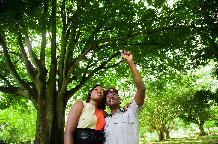
One afternoon, one of the teenage sisters turned up at their door-step to look for them. It was one of those times their mother was away for a long time and the girls were unkempt and hungry. She was distraught to see their living conditions and moved to tears as she recalled her own past experiences living with her mother. Their mother had her first pregnancy when she was just sixteen years old and it was all downhill from there. It troubled their sisters deeply that the girls were in and out of school – often absent for days. She decided to report the issue to the Pt. Fortin police. They were very good in responding. They dropped by often and they kept a lookout for the girls. Once they even brought Christmas gifts for them.
On one of her returns, the girls informed their mother that the teachers kept asking about her and wanted to know why they were absent so often. Her response was to take them out of school so that the school would
think they had moved. On that occasion they were out of school for almost two years. The girls missed school terribly. It was the one means of connecting with other kids their age, it provided a physical outlet through sporting activities and they yearned to learn more about books.
Adasha was a brilliant student her sister says proudly. She excelled in everything she did – that is until the day she was made a ward of the court. The extroverted girl retreated and then shut down. She was nine years old at the time and in her memory, that day is filled with confusion and trauma. They had run away again the night before and a series of events led them to the Pt. Fortin police station where they knew they would find a familiar and friendly face. This time the police knew that something had to be done about the girls. They determined that they must find them secure, long-term shelter. No one they knew was in a position –either financially or practically, to take them in. The courts searched for their mother, placing them temporarily in Hope Centre while they tried to find her. The young women recall an outpouring of warmth and care at this home. It was one of those rare happy periods for them. For Patricia, it was the first time she had a birthday party. They went to the cinema, to the beach and even shopping. She recalls it was one of those precious moments of feeling “normal”. It is a lasting memory locked away in the mental treasure trove of good feelings. They wished they could stay there forever. But that all came to a crashing end as they were hauled before the courts at a new hearing. Although their mother was located, it was
T&T CSR REVIEW 2013 4�
determined that she could not find a suitable home to care properly for them. The Hope Centre was for children five to eleven years of age and Patricia could not stay on because she turned eleven that year. They couldn’t bear to be separated. They were made wards of the courts and sent to the St. Jude Home for Girls in Port of Spain. Within months, that assignment was made permanent. They would have to stay there for the rest of their childhood - until they each turned eighteen. Patricia was now eleven and Adasha nine. The girls were in a state of confusion. For Adasha depression set in and then a deep anger. She began acting out and became uncontrollable. Her behaviour forced a dreaded separation. She had to leave the dorm she shared with Patricia and about 15 other girls who were considered to be stable and doing well. Her new dorm had strict supervision and enforced the discipline she needed to stabilize again.
Patricia tells me, “I cried every night for her. It broke my heart to not be near her”. At the time she did not understand that the separation was also for her good. Patricia had started to excel academically and became very focused on making something of her life. The Principal and staff at the School realized that her need to parent Adasha was taking a toll on her and interfering in both their development. Adasha was given a new outlet. She was introduced to cricket and netball. She describes that as a lifesaver. In the meantime Patricia buried her head in her books, consoling herself with being able to do Adasha’s laundry for her and chatting over dinner. Patricia was one of the few privileged girls who was allowed into the library at night because everyone knew she was not going to run away or get into trouble. She was a model student. During the day she went to St. Martin’s School, which like St. Jude’s, was run by the Carmelite nuns. There she pursued CXC and CAPE exams. Curiously, it was her mother who was her driver. She says very often her mother would repeatedly say to herself, “If I could have I would have listened to my mother and go to school”. She says she made the connection that school had to be a good thing and she wanted that so she wouldn’t be like her mother. Both girls enjoyed school but had a lingering desire to experience the ,normalcy’ of their classmates who often went home to a family and a number of exciting things to do, while they hurried back to the dorm.
Patricia credits her Math teacher Mr. Rajesh Sinanan for where she is today. He identified a natural affinity for Math and pushed her harder and harder until she herself recognized that her unusual ability with figures was special. As she was coming to the end of the sixth-form, Mr. Sinanan selected her and two other girls and taught them after school and holidays to make sure they passed the final exams. One day he called them aside and told them that the GATE programme was going to be introduced. He wanted them all to apply and said he was confident they would all be selected. His hard work and their dedication paid off. Patricia was accepted to UWI and pursued a B.Sc. in Accounting. Her good fortune didn’t stop there. She attended the UWI career fair in her final term and met with representatives of Ernst & young for the first time. She applied to every accounting firm that week. Ernst & young called her to an interview. She cried during that interview because for the first time she had to disclose where she went to school and where she had lived as a student. She tried to disguise her past as best as she could.
It was May 16th 2009, the date that her life changed forever. She was called by Ernst & young and told she was selected for the job. The rest is history. She quickly pursued a series

of professional exams, attaining the highest level of accreditation the ACCA in just 2 years. Today at twenty-six, she holds the position of Audit Senior following a promotion in October of 2012. She has just undertaken a trainthe-trainer’s Methodology Instructors Skills Course which she believes will be helpful in her next goal – that of becoming a manager. She declares proudly, “I always achieve what I set my mind to”. She believes that if she could overcome her past to reach this far, that nothing is impossible.
Adasha also has a lot to be grateful for. Her natural sporting prowess took her to the national netball team. “It was Ms. Gaskin who first got me interested in sports”, she says. “When I look back, I am ever so grateful…that was what helped me to find my balance”. She was also quite good at cricket but it is netball that took her places. Through netball and being part of divisional and national teams she toured many Caribbean Islands and even went to the Cook Islands in 2009. That was the same year her knee gave way after an unfortunate landing on a badly constructed court at the Jean Pierre Complex. She is currently on a waiting list at Mount Hope for laparoscopic surgery after which she hopes to be back in the game.
4� T&T CSR REVIEW 2013
Often the young women reflect on those days at “Jude’s” as they fondly call it. It was a tremendous freedom to not have to worry about food or safety. Three square meals, a warm bed and access to daily schooling were more than they had dreamed of. But beyond the necessities, they got love and caring support. Sister Joan Charlarie and the Carmelite nuns became part of a bigger family – one they grew to cherish and lean on.
When Patricia was old enough to leave St. Jude’s, her older sister was there to welcome her and offer her the ease of transition – a privilege that most girls at St. Jude’s never have. Graduates of the School often return to the dysfunction and instability that they escaped in the first place. The outcomes are not always great. St. Jude’s is now looking to refurbish an existing building to provide transition housing for girls who have reached the age of eighteen and preparing for the world of work. Apart from access to the secondary school system, St. Jude’s offers a number of certificate training programmes in Hair & Beauty, Culinary Arts, Dressmaking, Book-Binding, First-Aid as well as Art, Dance and Drama classes. Some of the girls are able to secure employment on leaving, but they need support to build up income to

truly function independently. An eighteen to twenty-four month transition will help greatly in getting them started. What’s more, they can still have access to the St. Jude’s family to help them navigate the realities of being outside again. The transition home is going to rely heavily on the generosity of corporate sponsors in the construction and build-out phases.
Adasha was just as fortunate as her older sister. Her older sister was her transition support. As Patricia’s job helped to catapult her into independent and self-sufficient woman, soon the two were able to move out on their own. Patricia saw Adasha through vigorous training for entry into the Fire Services. She is one of three women assigned to the Engineering Department of the Fire Services. The thirty-eight men on the team treat them as equals she says. But she also admits to being a bit defensive. She attributes this to having to be tough all during her childhood to protect herself “from being taken advantage of”. Today, the twenty-four year-old young woman has a new goal – that of counselling. Given her real life experiences and her deep understanding of human nature which was cultivated through numerous encounters with residents of the School, it seems like an ideal role for Adasha.
At the time of writing, their fifty-nine year old mother is still on drugs but for Patricia and Adasha there is no bitterness or remorse. They know that her drug habit hides a painful past that she finds difficult to cope with. So they are patient. Their mother now lives with their grandfather not very far away from Patricia’s home and they see her often and provide financial support. Life has been difficult for them all but because of St. Jude’s and the generosity of corporate sponsors, these two very special young women have a lot to be thankful for. We laugh together as they credit God and their guardian angels for saving them from many dangers and pitfalls. The years ahead are going to be happy years – so says Patricia. And as she herself admits, if she puts her mind to it – it’s going to happen.
For how you can volunteer or contribute to the St. Jude’s School for Girls contact Ms. Dumas at dcdumas@hotmail.com
T&T CSR REVIEW 2013 4�
IT TAKES A VILLAGE How Corporate Investment is Securing Family Life
By Barbara King
nor control. Support (TTIPS) celebrates its eighteenth anniversary in September 2013. Founded in 1995, the organization was born out of the awareness that many parents and caregivers, like that mother, were making critical errors in parenting, simply because that was all they knew. Marina Torres, a Child Development and Education Specialist, Marilyn Atherley (now Robb) and I connected through our work with and passion for children. We shared a distress at the way “different” children were treated by their well-meaning parents. Marilyn and I were faced with the results daily in our classrooms and Marina in her practice.
One morning at a primary school assembly, a mother interrupted the assembly to call out her son in front of the school of about 200 children. He was a lively, bright, charming boy who was very active, but bored by school. When he approached her, a belt appeared in her hand and she proceeded to let him know: “If you don’t listen you go feel!” She followed each word with a stinging lash across his buttocks and legs. The onlookers were so stunned we were paralyzed. The boy did not cry. Those lashes hurt, but he refused to cry. There was clearly an internal battle raging as he fought with the burning pain. But the humiliation in his eyes was unmistakable.
That mother was not a bad mother. Not an evil stepmother, simply an exhausted, overwhelmed single parent with a boy-child she could neither understand nor control. She had tried everything she knew to get this ‘harden’ boy to be like other good, studious boys and had failed. He seemed destined for failure and ultimately jail in her eyes.
The child’s crime was that he did not learn like other children. He could not sit still for long periods of time listening to a teacher just talking. He shuffled, fiddled, daydreamed and played with pencils, tore pages out of his books to make planes and things that moved. He needed to move! His mother and teachers could not understand that. They did not have the information or the tools to support him.
Witnessing that incident, almost 20 years ago, provided for me the impetus to take action.
and
Parenting Support Newsletter
To inform parents about current understanding of child development and modern parenting techniques, we started the production of the Parenting Support Newsletter. I put together the layout on a Mac Classic, Marina and Marilyn Xeroxed two hundred copies and distributed to friends, schools and anyone who was interested, with the direction to copy it and pass it on. Eighteen years later we are ParentingTT, still registered as TTIPS. Based in Arima, the services and programmes have evolved in response to client requests and to our own parenting experiences and include counselling, presentations to PTAs and groups, interactive workshops, parenting courses and community building projects. However, the organization still holds true to its mission to empower and inform innovative parenting.
Through the support and nurturing of international trusts - the Canadian High Commission’s Fund for Local Initiatives and the J.B. Fernandes Trust 1 - a registered non-profit
entity has been created. The employees have been trained, guided and coached to function as a small business. In 2012 the organization reached more than 800 men women and children directly, through interactive presentations and workshops and counselling services. Add the newsletter distribution and that number reaches more than 12,000.
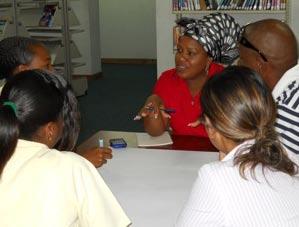
Filling a gap
Like many Civil Society organizations, ParentingTT clearly serves an urgent need in our society. The clientele consists primarily of parents from lower and middle-income families; mostly women and children, some in the throes of stress, abuse, poverty or relationship chaos, with the accompanying emotional pain and distress. Many of them are stable, working mothers and fathers who want to ensure that nothing gets in the way of their child succeeding in the education system.
ParentingTT sought to address a gap in the social services provided by successive governments. The government services that exist are overwhelmed and buckling under the load. The organization’s work addresses an urgent national concern – that of creating wholesome, supportive home environments for children; to reduce the number of distorted and damaged human beings that have been emerging as adults from modern-day families of all classes, creeds and races. The clients are respectable parents who want to heal and help their families. There are many persons under such financial stress that they cannot afford professional services. To have a child assessed by a professional at a cost of $3000 or more is out of their reach, so the child loses.
4� T&T CSR REVIEW 2013
Trinidad
Tobago Innovative Parenting
That mother was not a bad mother. not an evil stepmother. Simply an exhausted, overwhelmed single parent with a boy-child she could neither understand
CSR Feature
Parent, student and teacher sessions at Beetham Gardens
Funding challenges
The cost or providing our services to families has been assisted largely by foreign agencies like the J.B. Fernandes Trust, the European Union, foreign embassies and UNDP, that have committed to building capacity and professionalizing the Civil Society sector through the provision of education and training in non-profit management. The Ministry of the People and Social Development has provided ParentingTT with a small subvention in recent years. Many Civil Society Organizations today are as efficient, or more so, than some small and medium-sized businesses. The major challenges are in finding the financial support to deliver the services to the people who need or want them most, in promoting the services, and providing the widescale public education that could reduce social, emotional and economic problems.
Blanchisseuse and British Gas
The Corporate sector has contributed in small ways over the years by sponsoring attendees at the annual vacation camp, BP paid for newsletters to be distributed in Guayaguayare, Lever Brothers partnered with their campaign to encourage play, and others have made small donations. In 2012 British Gas partnered with ParentingTT to take a bold step in supporting children and families in a two-year project centred on the Blanchissuese Secondary school. This project is the first of its kind and involved educational assessments for the entire school population, counselling for the students who need it, mentoring for fifty students, peer helper training, teacher training and a community building project aimed at building on the strengths of the North Coast parents and communities.
Marina Torres, coordinator of the student assessments says: “We began the Social Emotional Literacy and Diagnostic programme at Blanchisseusse in October 2012 with both excitement and trepidation. II wondered if I knew what I was getting into. Here was I with a group of psychology graduates, all fired up to make a difference in the lives of students whom we were told had not been living up to their full potential.”
The funding by BG has allowed ParentingTT to create and purchase important materials that help to make the sessions lively and interesting and also provide the necessary visual stimulation to facilitate students’ learning and interest. It
has funded transportation to the school so that facilitators could arrive rested and refreshed, which allows them to see more students, and for longer periods.
Providing parenting
ParentingTT’s facilitators are stepping in to provide coaching, nurturing and relationship modelling that parents have been unable to provide for various reasons. The students are getting positive attention, being taught to recognize and manage their emotions, to function effectively in relationships and to resolve conflicts harmoniously. They are taking these lessons into their homes. Recently, the facilitators are seeing parents who are challenged by their children’s behaviours encouraging their children to seek assistance with counselling . Some are seeking help for themselves.
Corrine Bartholomew, who coordinates the mentoring project, says: “Working with the children at BSS has been like planting a garden; you know each seed has the capability and potential to become a fully grown tree but they must be carefully nurtured with the right ingredients. That’s what we do - provide the right mix of what they need to thrive. When I first arrived, the children were a bit reticent in allowing me into their world but over a few weeks they’ve come to trust and look forward to the visit. They have shared their hopes
and dreams, frustrations and fears and more importantly they have expressed that they feel safe in doing so.”
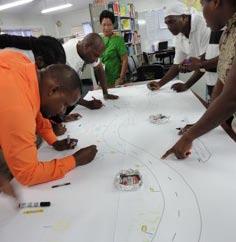
The students are looking forward to having mentors as many of these children have very unstable family lives, and the mentoring project offers them the opportunity for the consistent, supportive relationship with an adult, perhaps for the first time. “The kids are always very excited to see us when we arrive and as word spreads, more and more are signing on. Even the “difficult” kids! I see the blossoming of these children and it makes me proud to be a part of an organization that is instrumental in the positive growth of our nation’s youth.“
ParentingTT’s next bold step is the production of a national Conscious Parenting allmedia campaign intended to broaden the access to parenting skills and support. The campaign will highlight the positive parenting practices used in the nation and encourage parents to act consciously. Funding is critical, so ParentingTT invites you to share in the satisfaction and sense of accomplishment in seeing lives changed for the better.
Barbara King is Certified Professional Facilitator and Director of ParentingTT
T&T CSR REVIEW 2013 4�
Email Barbara at baking@tstt.net.tt
Drawing the vision
MORE THAN A MEAL
The Living Water Community is Changing Lives
By Paul Charles
The Living Water Community, founded in 1975 by friends Rhonda Maingot and Rose Jackman to initially feed the poor and homeless, has expanded its humanitarian outreach over the last four decades to respond to the mounting social challenges in Trinidad and Tobago. Though best known for its food programmes, the Community has a very broad outreach.
The organization, headquartered on Frederick Street in the heart of the capital city, Port of Spain, has grown to include 500 members and has extended its missions to other countries including Saba, St Eustatius, St Lucia and Barbados. It also networks and supports
383 Community Based Organisations (CBO’s) and Non-Governmental Organisations (NGO’s).
Formally registered in 1981 as a non-profit, charitable organization, its raison d’etre is to reach out to the marginalized, dispossessed and disadvantaged people. Although deeply rooted in Christianity, Living Waters’ outreach programmes assist people in need regardless of ethnicity, religion, gender, age, disability or social background.
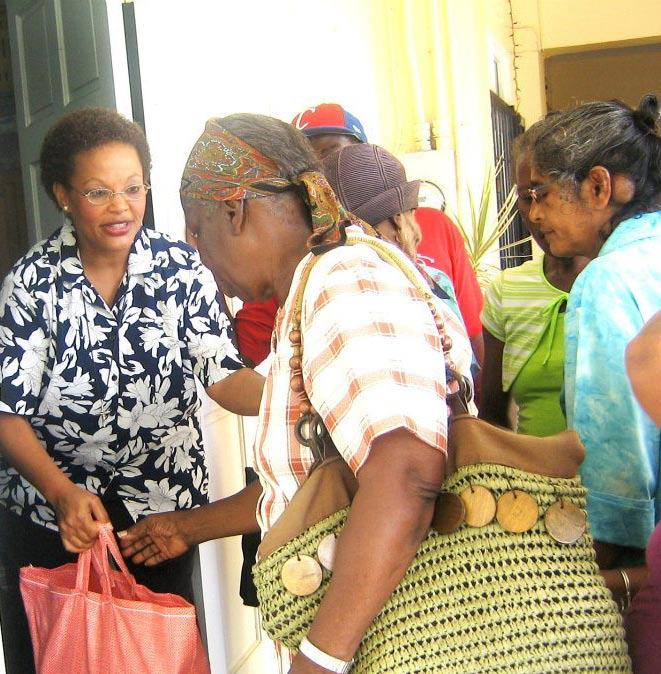
“We are a family, we live together, support each other and have made a commitment to the Church (and) out of this comes our social work and our responsibility to help the dispossessed,”
said Lilius Milne, a full time administrator, who joined the Community in 1978, and continues to be part of the driving force within the organisation.
In Trinidad and Tobago, Living Water has more than 100 full time employees – including nurses, therapists and guidance counsellors who work alongside scores of volunteers to care for persons afflicted with HIV/AIDS and terminal cancer. They also house and shelter battered women and homeless young men and rehabilitate substance abusers.
To adequately satisfy their numerous outreach programmes, it’s no wonder that Ms.
�0 T&T CSR REVIEW 2013
“Our food bank provides 300 needy families with groceries. More often than not, it’s a grandmother with no means of earning looking after a group of children. Ideally, we try to go beyond just giving; we try to help transform lives whether it’s through apprenticeship or counselling.”
(Lilius Milne – LWC Administrator)
CSR Feature
Disributing hampers to the poor at Nazareth House Christmas party.
Milne identifies “money” as the number one need of the Living Water Community.
Almost all the Community’s funding comes from charity – donations of cash and/or food; deeds of covenant (from private citizens and companies) and a relentless, ongoing suite of annual fund-raising initiatives: a family fair, wine and cheese events and a praise-a-ton that seeks pledges to fund the costly operation of its television station. Trinity Communications Network (TCN), the Community’s television station also owes its existence to individuals who volunteer their time and technical expertise.
While there is a body of committed support, resources are always limited and there is seemingly no end to the competing sets of need the Community has to address and balance. From all the expressions of goodwill, both in cash and kind, Ms. Milne could not cite an example of a company or corporation that has
offered to provide technical and administrative assistance.
“We do have examples of volunteerism from companies, particularly around Christmas, but most of the corporate support is through funding,” she added.
In a country plagued with many social ills, the opportunity for wider corporate partnership remains begging.
Is the Living Water Community winning? After some thought, Ms. Milne said, “Yes, I think so. Every day we see something good ... people turning around their lives; getting back on their feet.”
She cited two examples: comedian, radio and television host, Errol Fabien, who overcame his addiction to cocaine at the New Life Ministries as did former journalist, now Government Information Services Limited Managing Director, Andy Johnson.
“We have several examples of persons whose lives have been transformed and are now contributing to society – some have gone on to get degrees at University and have come back to work with us as therapists. “One of our boys from Marian House is now a shift supervisor at Carib Glass; another working on a cruise ship,” the administrator remarked.
Ms. Milne takes inspiration from the successes despite the many daily challenges. “Our food bank provides 300 needy families with groceries. More often than not, it’s a grandmother with no means of earning looking after a group of children. Ideally, we try to go beyond just giving; we try to help transform lives whether it’s through apprenticeship or counseling,” she said, satisfied that at the end of the day many lives were touched by the assistance given to them.
MINISTRIES OF LIVING WATER COMMUNITy
Hospice
A 16-bed facility in Port of Spain for terminally ill patients with cancer. This facility caters to socially deprived patients who are without access to home care.
Mercy Home
An 11-bed facility to care for persons with HIV/ AIDS. Through nursing and medical care, some of the patients return to a normal life while others are cared for until the end.
Caring Center and soup kitchen
Provides breakfast and lunch, bathing facilities and change of clothing for the homeless in the Port of Spain. More than 100 persons access the center daily.
Drug Rehabilitation Centres (New Life Ministries)
Established in 1986, the centers offer a threemonth residential program, followed by a 21month after-care programme. At present this is done at Mount St. Benedict rehabilitation center, Palo Seco Center for Women, and in the prison system for inmates with addiction problems, who are nearing the end of their sentence; a transition house, family counseling, and prevention programme.
Home for Rehabilitation of youths (Marian House)
A second-chance home for up to 30 youths (1521 years old). They live at this Center and, based on their development needs, are prepared to achieve their life’s goals and become part of mainstream society.
Home for abandoned and/or abused infants and children (Our Lady of the Wayside) Accommodates up to 25 infants or children whose families are in crisis and need a secure and caring environment.
Food-Bank and warehouse
In association with Food for the Poor of Deerfield Beach, Florida, cargo containers of basic food and household items are stored in the Living Water Community’s warehouse and distributed to/by 303 Community-Based Organisations (CBO’s) and Non-Government Organisations (NGO’s) throughout Trinidad and Tobago. Individual families also receive food hampers weekly.
Ministry fo Refugees and Asylum Seekers
Living Water Community is the Honorary Liaison Office for the United Nations High Commission for Refugees (UNCHR) and provides basic screening on their behalf. Also the Community provide assistance (including housing) until they
are relocated. Presently, approximately 500 such persons are in Trinidad and Tobago.
Trinity Communications Network
Living Water also operates a television and video production studio. It attempts to foster authentic Christian values that lead to the development of the whole person and the transformation of our society.
Nazareth House - San Fernando
In July 2011, the Living Water Community’s Nazareth House in San Fernando, opened a home for the elderly in Siparia. The building was donated by W.A.N.D. (Women in Action for the Needy), a women’s organisation also working to assist the destitute and needy by raising funds to help Communities like Living Water. The facility can accommodate 13 persons and is administered by a retired, registered nurse and covenanted member of the Community.
Paul Charles is a former journalist and communications specialist in the finance and energy sectors. He is currently Director with Beach House Media & Carnival TV. You can reach Paul at wpaulcharles@gmail.com See www. carnivaltv.net
T&T CSR REVIEW 2013 �1
DAVID J. DULAL-WHITEWAY with
 By Donna P. Ramsammy
By Donna P. Ramsammy
Interview
Photos by: Andre Neufville
As part of a planned series featuring “The Conscious CEO”, the T&T CSR Review is talking with CEOs who are committed to social responsibility. In this edition, we speak with David DulalWhiteway, Managing Director of Republic Bank Ltd.
By the end of 2012, after twelve months of intense collaboration with NGOs and community groups, his bank had given away 20 million dollars to organizations which he believes are doing serious work to help the less privileged and the more vulnerable members of our society.

By all comparisons, Republic Bank is one of the country’s biggest investors in social responsibility programmes in Trinidad and Tobago and has been so for a number of years. David Dulal-Whiteway is proud of the work his bank is doing, but he is also equally proud that it is not something that they boast about publicly. In fact, the T&T CSR Review had to convince him that sharing his CSR programme and the very disciplined approach they have to corporate giving, was worth sharing as a model for other companies to emulate. Dulal-Whiteway says giving is ingrained in his psyche and is also very much within Republic’s DNA. He chuckles, and a wide, warm grin lights up his face as I counter - “So you two are well matched!”
David Dulal-Whiteway is one of eight (8) children born to his mother, Myra and father George. “I am a country boy at heart”, he says. This is why life for him is one big community. He sees the bank as a community, his customers as a community and everyone else as just a bigger community to which we all belong. His first recollection of self-giving was at his parish church, ‘Christ the King’ in San Fernando. “Giving” he says, “was nurtured from childhood. My mother was very involved with the church. There was no sexton, just my mother who volunteered her time. So every morning I went with her as she opened up the church. I helped her to clean, put flowers in place and ring the bell for Mass... I also served at Mass. It was part of my daily routine.” It was his mother too, who helped to shape a conscience that said, giving back to society and helping others is a good way to live one’s life.
Dulal-Whiteway was appointed to the position of Managing Director of Republic Bank in 2005. He explains that the bank’s approach to CSR is integrated into its vision statement. This way he explains, “it is hard-wired into the way we work. We have codified it in a way that makes it an
intrinsic part of how we operate.” Everything that the bank does is linked to its CSR programme. The bank’s performance he says, “is a reflection of the economy.” If the society is not doing well, then neither does the bank. It is important, he believes, that companies understand this synergy. He wishes that many more companies got that point.
Ten years ago the bank took the decision to ramp up its CSR programme to make it more responsive and relevant to society’s needs. They wanted their investments to move beyond charity towards sustainability. The bank’s ‘Power To Make A Difference’ programme gives tens of millions of dollars every year to specially selected projects – and it has been doing this since the programme was launched in November 2003. In fact during the economic downturn which began around 2008, the bank maintained its healthy investment in social programmes and did not reduce the investment as might have been expected. Dulal-Whiteway credits General Manager – Group Marketing & Communications, Anna-Maria Garcia-Brooks for making that shift. He describes her as the true force behind the bank’s very successful social investment programme. Garcia-Brooks, he explains, uses the bank’s business methodology in the design and implementation of her CSR strategy. Being able to continuously assess, measure and make the necessary changes, is why the programme is so effective. She and her team bring a very disciplined approach to CSR delivery.
Dulal-Whiteway like the other fourteen members of his leadership team, is personally involved in the bank’s programmes. They each volunteer to champion at least two projects each year. At any one time, the bank has about 60 projects running. His speech quickens and he gets animated when asked which is his favourite project. “That’s easy”, he says. “It’s the Love-until Foundation”. Based in Laventille, one of the more depressed communities in the country, the project is making people more self reliant by providing them with skills that would make them employable and help to break the cycle of poverty.
T&T CSR REVIEW 2013 �3
Many of the beneficiaries of the Love-until project are women, single mothers and young people without natural, positive role models. The programme also goes into several “high risk” secondary schools and performs social interventions, helping these youngsters deal with managing anger, employing self control and helping them to focus on their school work as a means to break the attraction to the community gang leaders. Dulal-Whiteway says, “it is about moving mindsets from dependency to creating one’s own future.” Many people see this as a troubled community; but in his work, that is not his up-close experience. He meets many enthusiastic, visionary and diligent people who are equally dedicated to changing the face of this community. Dulal-Whiteway is also the Chairman of the NGO organization Foundation for the Enhancement & Enrichment of Life (FEEL) and works closely with them to deliver business, health and care programmes aimed at reducing poverty and creating opportunity for all.
The young, quiet CEO is deeply reflective when asked if he believes his work is making a real difference. “We know that it is, that’s why we continue to do it’. “I am very encouraged when I see lives move from despair to purpose”. Republic Bank does everything to ensure that beneficiaries of their projects succeed. This is why the bank is very choosy who it partners with. The bank looks for NGO’s that are well-structured to deliver the projects they invest in. They value every dollar and puts each to work in meaningful ways that show positive returns. He demands it of himself, he demands it of his management team, he demands it for his shareholders. His shareholders he says, are proud of what the bank does and they tell him that very often.
I remind him that the rate of crime is still high, that too many youths experience violence daily, and that not enough corporate entities are engaged in driving change. His voice softens and he instinctively clasps his hands as if in prayer, “the rate of poverty in our country is still too high”. He explains that there is still so much to be done and he hopes that many more companies will get involved in sustainable investments that can build communities and the economy in a way that makes a stronger Trinidad and Tobago – a place where everyone is benefitting from the earnings from oil and gas.
I ask him, “what would you say to other CEOs who are not yet on board with the ROIs that social investment brings. He becomes animated again. “That’s an easy sell!”, he quips. “There is a direct impact on the bottom line. We have evidence of this. We have high levels of employee satisfaction, with spin offs into customer satisfaction and growth for the bank...people often tell us they choose to bank with us because of the work we do”.
Dulal-Whiteway had one closing comment for the Review and for its readers. “There is a change in how business is being done and what society is demanding from corporations.” He explains, “(t)here is a symbiotic engagement between an organization and the society it serves...There is a new form of capitalism at work – one that has a social conscience.” “There is no way”, he says, “that you can operate with a long-term vision and not have a CSR programme...It’s just the right way to do business today – and the benefits are worth it.”
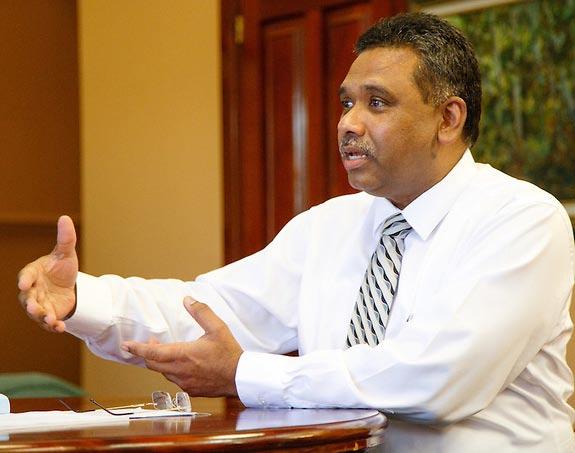
�4 T&T CSR REVIEW 2013


MEASURING EMPLOYEE VALUE Why Employee Engagement Matters
 By Esther LeGendre
By Esther LeGendre
“One thing we found was that employees focus on what they feel is worthwhile in their job more than business strategy and… This scenario produces employees who are highly engaged with and committed to their work but thoroughly hacked off and disengaged with their organization.”
If your company’s latest efficiency boosting initiative rollout to employees sets eyes rolling, your call for volunteers is met with stony silence, averted eyes, and the office clears mysteriously at 3.55pm, do not call Ghost Busters. Chances are you have an employee engagement problem.
�� T&T CSR REVIEW 2013
CSR Exchange
In the competitive arena of modern day business, an engaged employee is a key weapon in any arsenal: how much employees like what they do and feel connected and enthusiastic about the goals of the organization goes straight to the bottom line. High levels of engagement improves retention rates, lowers recruitment costs, drives performance and productivity, improves customer service, and can cut reputation management costs in half. Yet, an appreciation of employee engagement must go beyond the view of employees as a mere resource and to the acknowledgement that employees are people who need to be treated like people.
So is ‘employee engagement’ the new buzzword for ‘employee satisfaction’ and the old trade union standby ‘staff morale’? Not so, say the experts: while concerns of job satisfaction come into play and there are linkages to ‘morale’ which is a group experience, employee engagement is an individual emotional response to the organization within which they work.
Commenting in a Chartered Institute of Personnel and Development (CIPD)-sponsored post, HR researcher Jonny Gifford had this to say about research he conducted, “One thing we found was that employees focus on what they feel is worthwhile in their job more than business strategy and, as a result, can feel that their organization’s focus on efficiency undermines service quality. This scenario produces employees who are highly engaged with and committed to their work but thoroughly hacked off and disengaged with their organization.”
How do we arrive at the magical place of employee engagement? Employee engagement thrives on open and relevant communication and value -based management practices. Positive relationships with superiors and peers, clarity about one’s role in the scheme of things, opportunities for meaningful personal development can drive high levels of employee engagement. Engaged employees are knowledgeable and passionate about what they do: they are the coveted advocates, ‘brand ambassadors’ – willing reflections of corporate identity internally and externally, effective advocates of corporate philosophy, they have your back when the going gets rough. And so the challenge of organizations is to create the kind of work environment that is conducive to employee engagement, a pull rather than push strategy.
A 2006 study by A. Konrad entitled “Engaging Employees through High Involvement Work Practices” makes the link between the degree of individual well-being and levels of employee engagement and concluded, “High well-being yields high engagement. A well and engaged employee is likely to have less sick days, lowering the cost of lost productivity to their organization, and come to work energized and focused. A well and engaged employee is efficient and effective and a valuable asset in the workplace.”
Building an engaged workforce begins at the beginning, with a fact-based appreciation of the state of employee engagement. An attitude survey can provide a basis for action targeted at filling perceived gaps. Combined with other organizational data, performance management strategies may be developed to create for employees, the link between personal performance and the achievement of organizational goals.
CIPD research also offers insights as to some of the drivers of employee engagement: having opportunities to feed your views upwards
feeling well-informed about what is happening in the organization believing that your manager is committed to your organization involvement in decision-making freedom to voice ideas, to which managers listen feeling enabled to perform well having opportunities to develop the job feeling the organization is concerned for employees’ health and well-being.
It is not by chance that companies which have high engagement levels also have vibrant sports clubs, sporting teams that often engage the community, wellness programmes and good health plans. They also feature good internal communications and a work environment that empowers employee participation in decision making and promotes mutual respect.
There is general agreement among the experts that corporate volunteer programmes can also positively impact employee engagement.
Methanex Trinidad sees employees in their wider role as citizens who have a sense of civic concern that is further developed when opportunities for engagement with the community is made available. Volunteer
activities are an excellent forum for bringing skills developed for the workplace to bear on the strengthening of NGOs and CBOs and create project sustainability. In return, a fair degree of leadership and capability development can occur which can in turn strengthen organizational performance.
In 2006, Methanex took the bold step of measuring engagement and scored a modest 32 out of a possible 100. Based on the insights gained from the survey, a disciplined approach to addressing performance issues raised was undertaken. 5 years later, that score moved to 74. The Company has been a recipient of an award for “Recognising the Value of People’ from the Energy Chamber in its 2009 award programme. The impact of paying close attention to employee engagement has been a workforce that delivers vs corporate expectations and is a force for good in the community.
Encouragement and sometimes rewards, can boost the success of engagement strategies. In one local programme, volunteer hours logged were allowed to be converted into financial support for selected NGOs. Some employers give limited paid time off for volunteer activity especially where employees have talents and skills that can make all the difference to NGOs and CBOs. When the objectives of volunteer activities resonate with employees, frequent and timely communication and recognition of project achievements can enhance engagement.
So are these employee engagement strategies the magic bullet that galvanises hitherto apathetic employees into bristling action? Not always. Fact is, engagement hinges on personal characteristics, ‘baggage’, job quality, organizational design, perceptions of equity in pay and treatment, bad experiences in the work environment. Fortunately these issues should come to the fore in a carefully designed survey of employee attitudes. And then managerial skills can be channelled into the design and implementation of a work environment that is conducive to employee engagement.
Esther LeGendre is Managing Director of Bridge Consultants and a certified CSR auditor. You can
email
Esther at farside119@hotmail.com
T&T CSR REVIEW 2013 ��
• • • • • • • •
PRINCIPLES FOR CORPORATE CITIzENSHIP: The UN Global Compact & Corporate Social Responsibility
 By J. Wendy Singh
By J. Wendy Singh
In January 1999, United Nations SecretaryGeneral Kofi Annan, challenged businesses to embrace a Global Compact (GC) based on nine principles in the areas of human rights, labour and the environment, derived from the Universal Declaration of Human Rights, the International Labour Organization’s Declaration on Fundamental Principles and Rights at Work, the Rio Declaration on Environment and Development and the United Nations Convention Against Corruption. A tenth principle on anticorruption was adopted in June 2004 and is derived from the United Nations Convention Against Corruption (UNGC).
The first study on CSR on a Trinidad & Tobago-based company was carried out for BPTT in 2003 by Abarca and Singh (2003) in which the authors carefully traced how this company delivered its commitments through its social performance. In 2008, UNDP partnered with the then South Trinidad Chamber of Industry and Commerce (STCIC), to map the extent to which CSR was practiced by companies in Trinidad and Tobago. The following conclusions were reached:
There is a focus on philanthropy, charitable giving and public relations
Existing programmes are not aligned with the national development goals
There is limited involvement of government in the practice of CSR
�� T&T CSR REVIEW 2013
CSR Exchange
• •
•
“Strategic social investment and philanthropy, advocacy and public policy engagement, partnership and collective action are all means by which companies can support or promote human rights.”
Collaboration with Civil Society is very limited
There is little evidence of strategic planning
Awareness of the business benefits of CSR is limited (UNDP: 2012, 9)
UNDP used the 2008 report to facilitate a comparative analysis for its report in 2012, which captured “progress as well as regress and stagnation of mainstreaming sustainability in Trinidad and Tobago”. (UNDP: 2012, 9).It was determined that there is still a need for a more substantive shift towards a strategic form of CSR; a need to have drivers for CSR involvement –whether it is the government, CEOs, Civil Society or corporate volunteerism. (UNDP: 2012, 10-11).
The 2012 report certainly conveyed a willingness by companies to be more socially responsible, but there still seems to be some uncertainty among companies about the means to get there. The Global Compact website provides the most comprehensive resource centre on corporate citizenship, and it lists the obligations that companies are expected to assume when they opt to adhere to the Global Compact --viz:
Issue a statement supporting the Compact and its principles and publicly advocate the Compact
Inform employees, shareholders, customers and suppliers
Integrate the Global Compact and its principles into the corporate development and training programme
Incorporate the principles of the Compact into the company’s mission statement
Include the Global Compact commitment in the company’s annual report and other public documents
Issue press releases to make the commitment public
Provide once a year, a concrete example of progress made or a lesson learned in implementing the principles, for posting on the Global Compact website Engage at their option, Policy Dialogues and/or partnership projects in support of United Nations’ goals. (UNGC website)
In addition, the website specifies that there are at least four ways business can support or promote human rights:
Through their core business activities in support of UN goals and issues
Strategic social investment and philanthropy
Advocacy and public policy engagement
Partnership and collective action (UNGC website)
As pointed out earlier, the principles listed in the Compact focus on human rights, labour, the environment, and anti-corruption. This issue of the T&T CSR Review addresses on the first two principles (1 and 2), both of which relate to human rights. Principle 1 focuses on the need for companies to support and respect the protection of international human rights within their sphere of influence, while Principle 2 urges corporations to ensure that they are not complicit in human rights abuses.
With regard to Principle 1, although governments bear the primary responsibility for the protection of human rights, businesses need to take care not to infringe human rights in their operations and relationships, and they are encouraged to actively promote the enjoyment of these rights, since having a good social reputation and a stable atmosphere for conducting business could result in a more peaceful society where investments can prosper.
This principle applies both within and outside of the workplace. Within the workplace, companies would have to ensure safe and healthy working conditions, rights to basic health, education and housing in areas where they operate (if these are not provided), non-discriminatory treatment of employees, freedom of association, and a ban on child labour. Outside of the workplace, companies would have to demonstrate respect for international standards and guidelines, contribute to public debate, protect the economic livelihood of local communities, and prevent forcible disappearances of individuals, groups or communities. Of course, companies would also have the right to express their views on matters affecting their employees, customers and communities where they operate, and would be able to express their views on issues relevant to their operations.
Principle 2 encourages companies to formulate an effective human rights policy that would help them to avoid implication in human rights violations. Companies would
therefore be required to take positive action by carrying out a human rights’ assessment of the situation where they are located or intend to establish their operations; formulate and implement policies that protect the human rights of workers; establish a monitoring system to ensure that human rights policies are being implemented; and ensure that security forces, owned or contracted by the state, do not engage in human rights violations, but respect international guidelines and standards for the use of force. Lastly, in their relationships with governments, companies should not attempt to undermine the political or judicial system through bribery or intimidation. (UN website). It is clear that businesses must ensure that their operations are consistent with legal principles applicable in the country of their operations. However, if national law falls short of international standards, companies that are party to the Compact would be expected to strive to meet international standards, since businesses have a responsibility to respect human rights whether or not they are operating in countries where there is weak governance. (UNGC)
In concluding, it is indeed encouraging to note that several organizations and businesses in Trinidad and Tobago have already signed on to the Global Compact following the launch of a local network initiative on October 6, 2010 by the Trinidad and Tobago Manufacturers’ Association (TTMA). The South Trinidad Chamber of Industry and Commerce (STCIC), BP Trinidad & Tobago, Talisman Energy Inc. and Unilever, are also part of the Global Compact. It is very important that businesses become part of the solution to the many challenges facing our weakening economies here in the Caribbean. Corporate social responsibility requires accountability, transparency and a deep commitment to sustainable development by companies. This, in turn, can lead to greater social progress and stability in the countries where they operate.
Wendy Singh is a Human Development and Human Rights specialist and Managing Director of JWS International Consultants based in Puerto Rico. She has worked extensively in the Caribbean, Latin America and Africa. E-Mail: jws.international@yahoo.com
• • • • • • • • • • •
• • • •
THE LOCAL IMPACT OF CORPORATE RESPONSIBILITY Some Global Perspectives

The Boston College Center for Corporate Citizenship’s 2009 biennial survey of U.S. companies found that two of every three business leaders today believe corporate citizenship or corporate social responsibility (CSR) makes a tangible contribution to the bottom line. What is behind the thinking of America’s executives? One poll found that 80 percent of CEOs believe CSR contributes to their company’s reputation. The survey also reports that the CEOs believe reputational benefits can significantly increase their company’s ability to recruit and retain employees, appeal to and attract consumers, differentiate their firm and its offerings in the marketplace, generate additional sales and achieve many other business benefits.
For the past several years, practitioners have built a business case for action based on this linkage between CSR and reputation. Books, seminars and corporate programmes on “competing on reputation” and the “CSR advantage” abound. But today, amid a global financial crisis, trust in business is at a 10-year low. Edelman’s 2009 poll found that in the United States only 38 percent say they trust business to do what’s right and just 17 percent trust what they hear from company CEOs. Trust in Europe is down as well. In this context, practitioners need a more sophisticated understanding of how the public sees CSR and which of its multiple dimensions are the most significant drivers of corporate reputation. And, in a global economy, where reputational risks abound and CSR investments are expected to create value, a more nuanced view on how national culture and traditions factor into this CSR Reputation equation is essential. Reputation Institute has measured and studied the components of corporate reputation through in-depth studies of individual firms and an annual global study of the reputations of more than 600 companies through 30,000 online interviews with consumers in some 27 countries. For the 2008 data collection, the Boston College Center and Reputation Institute partnered to analyze how CSR, in its several dimensions, factors into companies’ reputations. A joint report was released in October 2008 revealing how the U.S. public views American companies in this light. Here the data is used to look at ratings of, and the link between, reputation and corporate social responsibility around the world. The T&T CSR Review shares the Executive Summary of those findings.
�0 T&T CSR REVIEW 2013
CSR Exchange
EXECUTIVE SUMMARy
There is an innate understanding in the business community that corporate reputations are valuable intangible assets key to building and protecting a company’s success in its operating environment. Practitioners know that corporate reputation is driven by stakeholder engagement and CSR activities. This study demonstrates how important these are to the world’s public.
Research shows that the public says that CSR is important to trust and reputation. This study asks: Do people make this link when they think about a specific company? Is it a stronger or weaker link when compared to, say, their views of the financial performance or leadership of a firm? Is the link between CSR and a company’s reputation pretty much the same in countries around the world or are there key variations? This report aims to answer these questions through an in-depth analysis of global reputation data on the largest companies in more than 25 countries around the world. In addition, the authors provide a model and guidelines for practitioners on how to use CSR to improve reputation in a global arena.
Methodology
Reputation Institute has identified several different dimensions of a company’s activity that relate to its overall reputation. The Pulse measure is a summative indicator of reputation overall. The global survey also asks the public to rate a selected company in terms of its performance (financial results), innovation, products and services, leadership and its citizenship (support for causes and Executive Summary of findings), the environment, workplace (treatment of employees) and governance (ethics, openness and transparency). A research team from the Boston College Centre for Corporate Citizenship and Reputation Institute summed the ratings of citizenship, governance and the workplace to create the CSR Index. Analysis of this index and its components constitutes the basis of the researchers’ findings.
What drives reputation?
In the 2008 Global Pulse Report survey, the top driver of reputation is ratings of products and services (predicting 17.6 percent of reputation).
What is notable is that the next highest drivers are perceptions of a company’s citizenship (16.3 percent), governance (14.5 percent) and
workplace (14.6 percent) practices. This affirms the power of CSR as a driver of reputation in the public’s mind. Ratings of innovation, leadership and financial performance all factor into corporate reputation, but somewhat less so among a nation’s general public.
Ratings on the CSR Index
A first analysis looks at how the public rates 600 global companies in 27 countries on the CSR Index. Companies in the Netherlands score highest on the index followed by Sweden and Norway. India and South Africa rank highly, too, largely on the strength of their strong governance scores. U.S. companies, ranked in the top third in all three CSR dimensions, scored sixth overall. Firms based in Portugal, on the strength of governance ratings, and those in Canada and Japan round out the top tier on the index. In the middle tier of the CSR Index are firms based in Italy (upgraded on citizenship ratings), Denmark (downgraded on governance) and Germany (downgraded on the workplace). In the lower tier, are firms based in Latin America, China and Spain.
Ratings of reputation – The Pulse Score
This is the overall rating of people’s trust, respect and positive feeling towards companies in their nation. Companies in Brazil (1), India (3) and Russia (5) – three of the four big emerging market dynamos – score in the top tier. The public in the Netherlands, Sweden, Denmark and Norway – all homes of big, prestigious, high performance companies – also feel very positively about their companies overall. Japanese and American firms round out the top tier.
Importance of CSR in reputation ratings (driver weights)
There is considerable variation in the power of CSR Index to predict a company’s reputation – ranging from high predictive power in Finland (55.3 percent) to the global average (45.4 percent) to relatively low power in Spain (41.4 percent). The Scandinavian countries and the Netherlands give citizenship a high weight in their judgments about a company overall. The highest weights given to governance are found in emerging global business markets (Chile, Mexico and India) and in the most advanced countries with Anglo-Saxon capitalism (Australia, Canada, the United States and United Kingdom).
The Finns and Danes stand out along with the Portuguese in putting a heavy emphasis on the workplace when judging companies. On a country-by-country basis there are notable differences in relative importance of the three CSR factors versus the other measured dimensions to predict corporate reputation. Globally, for example, the measure of corporate citizenship (social and environmental) is the second most important predictor of reputation. Throughout Scandinavia, however, and in the Netherlands and France, perceptions of a company’s citizenship are even more important than its products and services in ratings of overall reputation. In the United States, India, Latin America and Commonwealth countries, governance (ethics and transparency) leapfrogs corporate citizenship as a driver of reputation (though it is still less of a driver than products and services).
Using CSR to improve reputation
There is a set of countries where companies are rated comparatively high on CSR but it is not a strong predictor of corporate reputation. Firms in India, Japan, the United States and South Africa, among others, are not capitalizing on the strength of their CSR performance in their overall reputation. Here, concerted work on communicating about CSR is needed to help the public to “connect the dots” to reputation. Companies in Denmark, France, Finland and South Korea, by comparison, are not capitalizing on the power of CSR to positively drive their reputation. The challenge is to improve their CSR performance and its visibility to an interested public. The same is true in Argentina, Chile and Australia.
For the full report Email the Boston College
Center for Corporate Citizenship at ccc@bc.edu
Contributors to the Report:-
The Research Team Boston College
Center for Corporate Citizenship: Philip H. Mirvis, Ph.D., senior research fellow, principal investigator and author; Bradley Googins, Ph.D., executive director and Rene Carapinha, researcher.
The Reputation Institute: Charles Fombrun, Ph.D., chairman; Kasper Ulf Nielsen, managing partner;
Sebastian Taciak, senior consultant and Allison Young, senior consultant.
T&T CSR REVIEW 2013 �1
• • •
Being Green Makes Good Sense Why CSR and Sustainability make a better Bottom-line
By Linda Hutchinson-Jafar
Ban Ki Moon at UN Headquarters, February 2012.
Over the last decade, Corporate Social Responsibility (CSR) has been making the shift from philanthropy and corporate charity in the business community, towards corporate sustainability and this has been gathering momentum as a good business strategy, offering competitive advantages.
CSR is seen as an entry point for businesses to adopt sustainable development issues and respond to them in an effective manner through their business strategy.
Although the concept of corporate sustainability or operating a sustainable business has been around for a number of years, there’s understandably some confusion over the term ‘sustainability’.
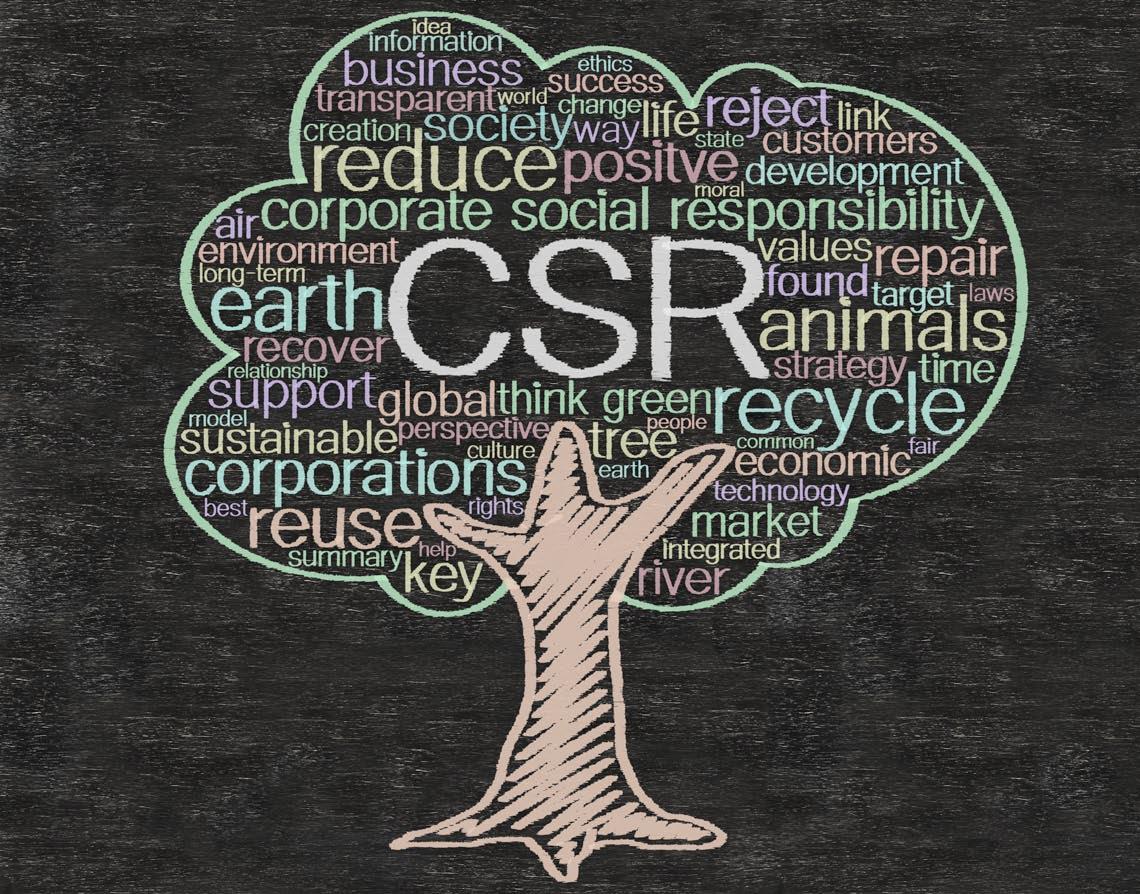
�2 T&T CSR REVIEW 2013
“Corporate sustainability has gone mainstream. Now we must achieve critical mass.”
CSR Exchange
From various authoritative sources, one can conclude that from an environmental perspective, sustainability refers to the sustenance of the planet and all life.
In the business sense, sustainability takes on a broader meaning to achieve long-term success and maintain a competitive advantage by managing financial, social and environmental risks, obligations and opportunities which is simplified as profits, people and planet. The focus is on how business treats its workers, customers and community; operating in an environmentally-conscious manner and achieving an acceptable return on investment and a healthy bottom line.
The World Business Council for Sustainable Development defines CSR as “the continuing commitment by business to behave ethically and contribute to economic development while improving the quality of life of the workforce and their families as well as of the local community and society at large.”
Sustainable development as defined by the United Nations is the development that “meets the needs of the present without compromising the ability of future generations to meet their own needs.”
Prime Minister of the Netherlands, Mark Rutte, at the opening of the ‘Sustainability as a competitive advantage’ seminar in Istanbul, Turkey in November 2012 notes that sustainability is a clear business case as it promotes growth, saves costs, fosters customer loyalty and is essential to long-term business success.
“I should emphasise that sustainability and corporate social responsibility are not a gimmick. Companies cannot use them to boost their sales and profits overnight. A thin layer of corporate social responsibility simply doesn’t work. If anything, the reverse is true. If it is not genuine, people will easily see through it”.
“So companies that successfully follow a sustainable business model have made the concept part of their corporate DNA, from the boardroom to the shop floor, and from headquarters to the smallest branch. And their approach has substance. Companies like these are setting themselves major, measurable goals and they make those goals visible to the outside world,” the Netherlands Prime Minister added.
Helen Clark, Administrator of the United Nations Development Programme said CSR is internationally recognized as a significant
contributor to achieving sustainable development across its dimensions.
“Companies we work with which are pursuing inclusive business models find that they are also able to achieve their corporate goals, benefiting from improved efficiency, cost savings, stronger branding, increased public trust, improved employee health, and better market access,” Ms. Clark said at a Dialogue on Corporate Social Responsibility for South-South Cooperation, Beijing in May 2012.
Conversely, companies which do not engage in corporate social responsibility may suffer reputational risk, as there is increased awareness of the importance of good corporate citizenship at home and abroad.
Many companies are going deeper towards ensuring and achieving sustainability across their operations.
Some years ago, Wal-Mart, the world’s largest retailer, launched Sustainability 360, a company-wide programme that aims to engage its associates, suppliers, communities and customers to the sustainability agenda.
It requires suppliers to reduce product packaging by five per cent by 2013; realizing savings equal to removing 213,000 trucks from the road and saving 324,000 tons of coal and 67 million gallons of diesel fuel per year.
In 2010, Unilever launched the Unilever Sustainable Living Plan which has three major goals to achieve by 2020: to help a billion people take action to improve their health and wellbeing; to halve the environmental impact of its products and to source 100% of its agricultural raw materials sustainably; and to protect the livelihoods of more than 500,000 smallholder farmers.
Paul Polman, CEO Unilever at a February 2013 Bata Lecture on Responsible Capitalism said the company is making progress with lowering costs by cutting the use of resources, lowering risks by internalising challenges like climate change, creating stable supply by working directly with small hold farmers, motivating employees, and leveraging its brands as a force for good.
Corporate Knights, the Toronto-based media and investment Research Company in January 2013 announced their Global 100 list of the world’s most sustainable corporations.
The top-ranked company in the 2013 Global 100 was Belgium-based Umicore, a materials’ technology and recycling company. The top 5
were rounded out by Natura Cosmeticos, Statoil, Neste Oil and Novo Nordisk.
Companies were assessed on 12 sustainable performance indicators in the areas of economic, social and environmental responsibility, including the consumption of energy and water, waste produced and carbon dioxide emissions in relation to net sales. Commenting on this year’s Global 100, Toby Heaps, Corporate Knights CEO, remarked, “the Global 100 are leading a resource productivity revolution, transforming waste into treasure and doing more with less. They are steering our civilization away from ecological overshoot and back to a place of balance with our planet.”
He added, “on carbon, water, energy, and waste, the Global 100 are on track to double their resource productivity by 2025 in two-thirds of the cases, and in an era of peak commodity prices, this makes as many dollars as it does sense.”
Adaptation to climate change
On the larger picture of the environment, the private sector is also being encouraged to contribute to the development and implementation of climate change adaptation solutions within their organizations, which can influence the way their socio-economic systems operate, impacting both customers and employees.
“The key is to find the nexus of shared interest where business incentives align with communities’ adaptation needs,” according to the recently published ‘A Caring for Climate report by the United Nations Global Compact, United Nations Environment programme (UNEP),OXFAM and World Resources institute (WRI).
“Companies that rigorously assess climate change risks and opportunities and implement creative solutions that build longterm resilience will create business value while making important contributions to sustainable development and equitable green growth.”
Sustainable development seems to be good business in itself.
Linda Hutchinson-Jafar is Managing Director of the Caribbean PR Agency and publisher of the Business Journal Online and Earth Conscious Magazine. You can email Linda at hutchlin@ gmail.com
T&T CSR REVIEW 2013 �3
CORPORATE RESPONSIBILITY IS A RELATIONSHIP How the
Most Reputable Companies are Building Brand
By Jacquelyn Smith
When you browse the aisles of a grocery store, purchase a new car, ship a package, or book a flight, you have an abundance of options. Chances are, your decision to choose one brand over another is influenced more by the company’s reputation than by any particular product or service it offers.
Reputation Institute, a global private consulting firm based in New York, found that there’s a strong correlation between a company’s reputation and consumers’ willingness to recommend or buy from it. For companies with strong reputations, 55% of consumers say they would definitely buy their products and 50% would be willing to recommend their products to others. For companies with weak reputations, these percentages fall to only 31% willing to buy and just 28% willing to recommend.
“We live in a time when word of mouth is the number one driver of sales and competitive advantage,” says Kasper Ulf Nielsen, Reputation Institute’s executive partner. “Investing in reputation will pay off on the bottom line.” Given that international companies boast up to 95% of their revenue from foreign markets –companies need to strive to earn the trust and esteem of consumers all over the world. “Winning the support of customers in foreign markets is critical to future success,” Nielsen says.
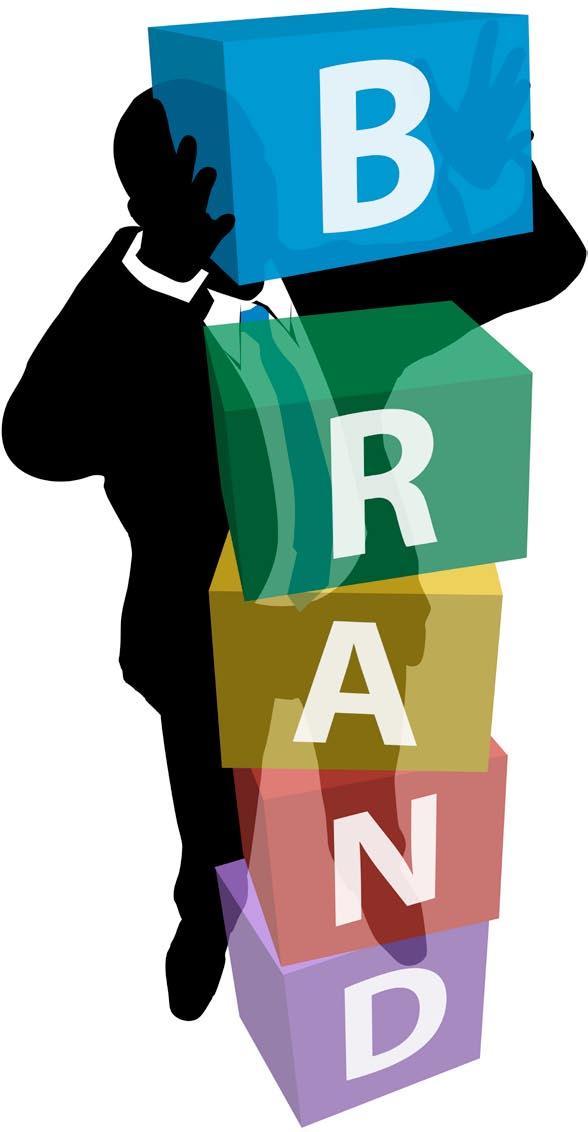
�4 T&T CSR REVIEW 2013
CSR Exchange
“There’s a strong correlation between a company’s reputation and consumers’ willingness to recommend or buy from it.”
Building a top-notch reputation that spans the world isn’t easy. However, at least 100 wellregarded companies have successfully expanded their brands into the international marketplace by integrating reputation management into the way they do business.
Reputation Institute recently ranked 100 businesses that have successfully established strong international names for themselves. The firm invited about 55,000 consumers across 15 markets to participate in a study of those 100 most reputable companies, all multinational businesses with a global presence. Each company earned a “Global RepTrak Pulse” score of zero to 100, representing an average measure of people’s feelings for it. The scores were statistically derived from calculations of four emotional indicators: trust, esteem, admiration and good feeling.
Reputation Institute also analyzed what it calls the seven dimensions of corporate reputation. That’s where it found that perceptions of the enterprise (workplace, governance, citizenship, financial performance and leadership) trumped product perceptions (products and services plus innovation) in driving behaviours.
“Reputation is the emotional bond that companies have with stakeholders,” Nielsen says. “It’s defined by the level of trust, admiration, respect and good feeling stakeholders have towards a company. If a company has a strong reputation people trust the company. If the reputation is weak, trust admiration and respect are low.”
As it turns out, reputation is emerging as the number one driver of value, because for companies to succeed, they need stakeholders to support them. “They need customers to buy their products and services, investors to invest in their company, regulators to give them a license to operate, journalists to give them fair coverage, and employees to deliver on the strategy,” Nielsen says. “And for them to do this, they want to know that they can trust the company to deliver on its promises. That is what reputation is all about.”
Building a strong reputation takes time. To win the trust and support of consumers and other stakeholder around the globe you need to consistently show that you will live up to your promises, Nielsen says. You also need to be relevant in the local context. “It’s not enough to have a strong and appealing product brand. You need to be seen as a company who cares about
the people in the country.”
The best companies are the ones who invest in local activities; doing more than just selling their product. “The winners, in many cases, also produce locally, employ local people, and engage themselves in solving local issues. But, you are unable to build a strong reputation through philanthropy or CSR actions alone.”
People are looking for companies to be an active partner in solving their issues–and this requires local investments and the willingness to think long term, and to build the relationships needed to win trust and support, he says.
One company that has been able to do all of this exceptionally well: BMW - For a second consecutive year, the German automaker is in the top 10 for all seven dimensions on a global level, earning the title of world’s most reputable company for 2013. A BMW spokesperson told Reputation Institute that the company has a long heritage of creating trust through a simple approach: Deliver on promises. “At the BMW Group, trust is the bedrock upon which we operate and it provides the foundation for our brands to grow,” he said. “For years, we have been cultivating relationships with all of our stakeholders based on consistency and reliability. The result is a culture of ongoing communication based on trust.”
In the No. 2 spot, The Walt Disney Company earned a 77.76 global score. It ranks highest (No. 1) in the citizenship category—but lands in the top 10 in all seven dimensions. The Walt Disney Company also has the broadest reputation profile with a top 10 rank in ten of the 15 markets. The strong reputation pays off. Across the 15 largest markets in the world 59% of consumers say they would definitely buy Disney products, and 57% would definitely recommend the company to others.
Rounding out the top three is Swiss watchmaker Rolex. Rolex enters the list with a strong reputation score of 77.23—and led all companies in terms of high quality products and services. “But Rolex is more than just its products in the mind of consumers,” Nielsen says. “The timeless luxury company is also seen to deliver on our other reputation dimensions like leadership, financial performance, as well as workplace and governance. The only two dimensions where Rolex is not in the top 10 are innovation and citizenship.”
Nestlé is the only other newcomer to the top 10 this year. “The Swiss food giant has
consistently moved up in the ranking over the past years with a steady reputation,” Nielsen says. It debuts in the No. 9 spot with a global score of 75.21. Nestlé has a strong perception within products and services, innovation, financial performance, and leadership. “Within the softer dimensions of citizenship, governance, and workplace Nestlé is seen as average,” Nielsen explains. “With 41% of reputation being driven by these three dimensions, Nestlé will need to improve performance in these if it wishes to climb to the highest levels on the reputation ladder.” Nestlé also has a very strong reputation with consumers in North America and Latin America, where it ranks second overall among all 100 companies.
“Based on feedback from more than 300 reputation leaders, the number one priority in 2013 for them is to manage and mitigate reputation risks,” Nielsen says. “Boeing saw this need when it went through a major crisis with the grounding of the Dreamliner. The public noticed the issue and reacted by losing trust and willingness to support the company. At the global level, Boeing’s reputation dropped five points, taking its reputation rating from strong to average. At the dimension level, people lost most faith in Boeing’s ability to deliver high quality product and service area but overall the issues did not ruin the reputation of the company globally with consumers.”
To qualify for the ranking at all, each company had to have an above-average reputation score (defined as over 70) in its home market, based on Reputation Institute’s global database of RepTrak scores spanning 2006 to 2012. The criteria for qualification also included company size, based on annual revenue, multinational presence and high familiarity among consumers in the measured 15 markets (Australia, Brazil, Canada, China, France, Germany, India, Italy, Japan, Mexico, Russia, Spain, South Korea, the U.K. and the U.S.).
Something all the winners across the globe have in common: They have recognized that the days where a strong product alone would win the love and support of consumers are over.
T&T CSR REVIEW 2013 ��
Jacquelyn Smith is a staff writer with Forbes Magazine and writes on issues related to leadership, jobs and careers. You can follow Jacquelyn at Twitter@JacquelynVSmith
Trinidad & Tobago Corporate CSR Directory
Name: Ansa Mcal Group of Companies
Address: Head Office, 11th Floor Tatil Building, 11 Maraval Road, POS
Contact: Ms. Sharon Balroop
Position: Manager – Corporate Communications
Phone: 868-625 3670/868 624 8753; (Fax) 868 624 8753
E-Mail: Sharon.Balroop@ansamcal.com
Web: www.ansamcal.com
Name: Angostura Group of Companies
Address: Corner Eastern Main Road and Trinity Avenue, Laventille
Contact: Ms. Giselle Laronde-West
Position: Manager – Corporate Communications
Phone: 868-623 1841; (Fax) 868 623 1847
E-Mail: glarondew@angostura.com
Web: www.angostura.com
Name: Arcelor Mittal Pointt Lisas Ltd.
Address: Mediterranean Drive (P.O. Bag 473) Point Lisas Industrial Estate, Couva
Contact: Fazad Mohammed
Position: General Manager/Communications & External Relations
Phone: 868 636 8066; (Fax) 868 636 5791
E-Mail: fazad.mohammed@arcelormittal.com
Web: www.arcelormittal.com
Name: Atlantic (ALNG)
Address: Princes Court, Cor. Keate and Pembroke Streets, Port of Spain
Contact: Caroline Ramnarine
Position: Vice President, Corporate Operations
Phone: 868 624-2916; (Fax) 868 624 8057
E-Mail: csirjuramnarine@atlanticlng.com
Web: www.atlanticlng.com
Name: blink|bmobile (TSTT)
Address: TSTT House,1 Edward Street, Port of Spain
Contact: Angnenie Ramesar Soom
Position: Manager, Corporate & Community Affairs
Phone: 868 625 3333 (Fax) 868-623-3836
E-Mail: aramesa@tstt.co.tt
Web: www.tstt.co.tt
Name: BG Trinidad & Tobago
Address: 5 St. Clair Avenue, Port of Spain
Contact: Wendell Constantine
Position: Public and Corporate Affairs Manager
Phone: 868 628-0888 (Fax) 868 622-6520
E-Mail: wendell.constantine@bg-group.com
Web: www.bg-group.com
Name: BHP Billiton Trinidad &Tobago
Address: Invaders Bay Tower, Audrey Jeffers Highway, Port of Spain
Contact: Carla Noel-Mendez
Position: Director, External Affairs/Community
Phone: 868 821-5146 (Fax) 868 635-9255
E-Mail: Carla.Noel-Mendez@bhpbilliton.com
Web: www.bhpbilliton.net
Name: BP Trinidad & Tobago LLC
Address: 5-5a Queen’s Park West, Port of Spain
Contact: Ronda Francis
Position: Manager, Corporate Responsibility
Phone: 868 623 2862; (Fax) 868 627 7863
E-Mail: Ronda.Francis@bp.com
Web: www.bp.com
Name: Carib Glassworks Ltd.
Address: Eastern Main Road, Champs Fleurs
Contact: Narvin Maharaj
Position: Marketing Manager
Phone: 868 662 2231 (Fax) 868 662 1779
E-Mail: narvin.maharaj@ansamcal.com
Web: www.caribglass.com
Name: Caribbean Airlines Ltd.
Address: Piarco International Airport, Piarco
Contact: Clint Williams
Position: Head Corporate Communications
Phone: 868 669-3000; (Fax) 868 669 1520
E-Mail: clint.williams@caribbean-airlines.com
Web: www.caribbean-airlines.com
Name: Citibank (Trinidad & Tobago) Limited
Address: 12 Queen’s Park East, Port of Spain
Contact: Leslie Taylor-Gouveia
Position: Public Affairs Officer
Phone: 868 625-1040; (Fax) 868
E-Mail: leslie.taylor.gouveia@citi.com
Web: www.citibank.com/trinidad
Name: Colonial Life Insurance Company (Trinidad) Ltd
Address: 29 St. Vincent Street, Port of Spain
Contact: Sarah Arneaud
Position: Human Resources Manager
Phone: 868 625 4444; (Fax)
E-Mail: sarneaud@clico.com
Web: www.clico.com
�� T&T CSR REVIEW 2013
Directory
Name: Columbus Communications Trinidad Ltd. (FLOW)
Address: 29 Victoria Square, Port of Spain
Contact: Monique Mata
Position: Corporate Social Performance Specialist
Phone: 868 224 2348
E-Mail: mmata@columbustrinidad.com
Web: www.columbustrinidad.com
Name: Courts (Unicomer)
Address: 3 Mulchan Feuchan Road, Chaguanas
Contact: Helen Rambally
Position: Public Relations Manager
Phone: 868 672 7577; (Fax) 868 672 1984
E-Mail: helen-rambally@unicomer.com
Web: www.unicomer.com
Name: Dansteel Ltd.
Address: South Trunk Road, La Romain
Contact: Narindra Mootilal
Position: Marketing Manager
Phone: 868 652-8562; 868 623-6731; (Fax) 868 623 0804
E-Mail: narindra@bhsil.com
Web: www.thebhagwansinghsharsware.com
Name: Digicel Trinidad & Tobago Ltd
Address: Ansa Centre, 11C Maraval Road, Port of Spain
Contact: Penny Gomez
Position: Communications Manager
Phone: 868 399 9998/9; (Fax) 868 399-9926
E-Mail: caringconnections@digicelgroup.com
Web: www.digiceltt.com
Name: Direct TV Trinidad Limited
Address: 31 Mulchan Seuchan Road, Chaguanas
Contact: C. Adams
Position: Marketing Manager
Phone: 868 672 8111; (Fax) 868
E-Mail: cadams@directvtt.com
Web: www.directvcaribbean.com
Name: EOG Resources Trinidad Ltd.
Address: 10-12 Sweet Briar Road, St. Clair
Contact: Lisa Steele Pujadas
Position: Mgr. Corporate Communications & External Affairs
Phone: 868 622 8653; (Fax) 868
E-Mail: lisa_steele-pujadas@eogresources.com
Web: www.eogresources
Name: First Citizens Bank
Address: 9 Queen’sPark East, Port of Spain
Contact: Dexter Charles
Position: Manager, Group Communications
Phone: 868 624 3178; (Fax) 868
E-Mail: gcc@firstcitizenstt.com
Web: www.firstcitizens.com
Name: HCL Group of Companies
Address: Long Circular Mall, Long Circular Road, St. James
Contact: Colin Carty
Position: Marketing Manager
Phone: 868 622 4925: (Fax) 868
E-Mail: colin.carty@hcltt.com
Web:
Name: IBM World Trade Corporation
Address: 91-93 St. Vincent Street, Port of Spain
Contact: Leslie Welch
Position: Marketing Manager
Phone: 868 624 5110; (Fax) 868 625 6971
E-Mail: lwelch@tt.ibm.com
Web www.ibm.com
Name: Maritime Financial Group
Address: Maritime Centre, 29th Tenth Avenue, Barataria
Contact: Lesley Alfonso
Position: Marketing Manager
Phone: 868 674 0130; (Fax) 868 674 0130
E-Mail: lalfonso@maritimefinancial.com
Web: www.maritimefinancial.com
Name: Methanex Trinidad Limited
Address: Maracaibo Drive, Pt,. Lisas Industrial Estate, Point Lisas
Contact: Deborah Samaru
Position: Manager, Public Affairs
Phone: 868 679 4400; (Fax) 868 679 2400
E-Mail: dsamaru@methanex.com
Web: www.methanex.com
Name: The National Gas Company
Address: Orinoco Drive, Point Lisas Industrial Estate, Couva
Contact: Christine Punett
Position: Head External Communications
Phone: 868 636 4662; (Fax) 868 679 2384
E-Mail: ChristineP@ngc.co.tt
Web: www.ngc.co.tt
Name: National Flour Mills Ltd.
Address: 27-29 Wrightson Road, Port of Spain
Contact: Cheryl Lee Kong
Position: Marketing Manager
Phone: 868 625 2416; (Fax) 868 625 8957
E-Mail: cheryl.leekong@nfm.co.tt
Web: www.nfm.co.tt
Name: National Lotteries Control Board
Address: 119-121 Duke Street, Port of Spain
Contact: Candy West
Position: Marketing & Public Relations Officer
Phone: 868 623 1831; (Fax) 868 627 8030
E-Mail: cwest@nlcb.co.tt
Web: www.nlcb.co.tt
T&T CSR REVIEW 2013 ��
Name: Neal & Massy Group of Companies
Address: 63 Park Street, Port of Spain
Contact: Candace Ali
Position: Group Communications Officer
Phone: 868 625 3426; (Fax) 868 627 9061
E-Mail: cali@neal-and-massy.com
Web: www.neal-and-massy.com
Name: Nestle Trinidad & Tobago Ltd.
Address: Church Roosevelt Highway, Valsayn
Contact: Denise D’Abadie
Position: Manager Corporate Social Responsibility
Phone: 868 663 6832; (Fax) 868 663 6840
E-Mail: denise.dabadie@cbr.nestle.com
Web: www.nestle.com
Name: Oscar Francois Ltd.
Address: 133-135 Duke Street, Port of Spain
Contact: Jackie Francois
Position: Chief Executive Officer
Phone: 868 225 1635; (Fax) 868 624 0388
E-Mail: info@oscarfrancois.com
Web: www.oscarfrancois.com
Name: Pan American Insurance
Address: 91-93 St. Vincent Street, Port of Spain
Contact: Catherine Rajkumar
Position: Mgr. Communications & Marketing
Phone: 868 625 4426; (Fax) 868
E-Mail: crajkumar@palig.com
Web: www.palig.com
Name: Petroleum Company of T&T (Petrotrin) Ltd.
Address: #31 Casuarina Ave; Pointe-a-Pierre
Contact: Bunny Rambachan
Position: Mgr. Corporate Communications
Phone: 868 658 4200 xt.2026; (Fax) 868 658 3775
E-Mail: Gillian.Friday@petrotrin.com
Web: www.petrotrin.com
Name: Phoenix Park Gas Processors Ltd. (PPGPL)
Address: Rio Grande Dr; Point Lisas Industrial Estate
Contact: Joann Salazar
Position: VP Strategy & Corporate Services
Phone: 868 636 1522; 868 636 1529: (Fax) 868 636 6810
E-Mail: joann.salazar@ppgpl.co.tt
Web: www.ppgpl.com
Name: Power Generation Company of T&T (Powergen) Ltd.
Address: 6a Queen’s Park West
Contact: Sonya Lequay
Position: Communications Manager
Phone: 868 624 0383; (Fax) 868 625 0983
E-Mail: selequay@powergen.co.tt
Web: www.powergen.co.tt
Name: Repsol T&T Ltd.
Address: Repsol Tower, 4 Queen’s Park West, Port of Spain
Contact: Heidi Diquez
Position: Mgr. Corporate Communications & External Affairs
Phone: 868 623 2244; 868 623 1770; (Fax) 868 627 2753
E-Mail: HDIQUEZD@repsol.com
Web: www.repsol.com
Name: RBTT Financial (Caribbean) Limited
Address: St. Clair Place, 7-9 St. Clair Avenue, Port of Spain
Contact: Anna Maria Kurban Ali
Position: Manager, Corporate Communications
Phone: 868 623 1322; 868 624 7288: (Fax) 868
E-Mail: anna-maria.kurbanali@rbc.com
Web: www.rbc.com
Name: Republic Bank Limited
Address: 9-17 Park Street, Port of Spain
Contact: Tisha Lee
Position: Group Corporate Communications Manager
Phone: 868 625 4411; 868 625 4425
E-Mail: tlee@republictt.com
Web: www.republictt.com
Name: Sagicor Life Inc. (Trinidad & Tobago)
Address: 16 Queen’s Park West, Port of Spain
Contact: Marlene Chin
Position: Manager, Corporate Communications
Phone: 868 628 2652; 868 624 4754; (Fax) 628-1639
E-Mail: Marlene-Chin@sagicor.com
Web: www.sagicorlife.com
Name: Scotiabank Trinidad & Tobago Ltd.
Address: 56-58 Richmond Street, Port of Spain
Contact: Heidi Bason
Position: Marketing Manager
Phone: 868 627 2684; 868 625 3566; (Fax) 627 5278
E-Mail: Heidi.bason@scotiabank.com
Web: www.scotiabank.com
Name: Trinidad Cement Ltd.
Address: Southern Main Road, Claxton Bay
Contact: Anne Phillips
Position: CSR Officer
Phone: 868 659 2381xt.4232; (Fax) 868 659 2540
E-Mail: annep@tcl.co.tt
Web: www.tcl.co.tt
Name: Trinidad & Tobago National Petroleum Company (NP)
Address: Sea Lots, Port of Spain
Contact: Anna Lisa Benjamin
Position: Mgr. Corporate Communications
Phone: 868 625 1364; (Fax) 868 627 4028
E-Mail: analisa_benjamin@np.co.tt
Web: www.np.co.tt
�� T&T CSR REVIEW 2013
Name: Trinidad & Tobago Postal Corporation (TT Post)
Address: Golden Grove Road, Piarco
Contact: Andre James
Position: GM Sales & Marketing
Phone: 868 669 5361; (Fax) 868 669 5374
E-Mail: andre.james@ttpost.net
Web: www.ttpost.net
Name: Trinidad & Tobago Electricity Commission (T&TEC)
Address: 63 Frederick Street, Port of Spain
Contact: Annabelle Brasnell
Position: Corporate Communications Manager
Phone: 868 623 2611 ext. 2171; (Fax) 868 624 3724
E-Mail: abrasnell@ttec.co.tt
Web: www.ttec.co.tt
Name: Trinidad & Tobago Unit Trust Corporation (UTC)
Address: 82 Independence Square, Port of Spain
Contact: Rory Rostant
Position: Mgr. Communications & Marketing
Phone: 868 625 8648; (Fax) 868
E-Mail: rrostant@ttutc.com
Web: www.ttutc.com
Name: Unilever Caribbean Ltd.
Address: Eastern main Road, Champs Fleurs
Contact: Joleen Meharris
Position: Communications Coordinator
Phone: 868 663 1787 xt.2264;(Fax) 868 662 1780
E-Mail: Joleen.Meharris@unilever.com
Web: www.unilever.tt
At Karibgraphics our CSR is our Creative Services Responsibility: providing you with high quality graphic design services at all times.
We love what we do and so will you.
Name: Water & Sewerage Authority (WASA)
Address: Farm Road, St. Joseph
Contact: Ellen Lewis
Position: Corporate Social Responsibility Manager
Phone: 868 662 9272; 868 223 1000-6;(Fax) 868 662 6322
E-Mail: ellen.lewis@wasa.gov.tt
Web: www.wasa.gov.tt
Name: Magdalena Grand Beach Resort Hotel
Address: Lowlands, Tobago
Contact: Rachel Nathaniel
Position: Marketing Manager
Phone: 868 290 9263; (Fax) 868 6690 8503
E-Mail: rachael.nathaniel@magdalenagrand.com
Web: www.magdalenagrandbeachresort/Trinidad
Name: Hyatt Regency
Address: 1 Wrightson Road, Port of Spain
Contact: Neemah Persad-Celestin
Position: Marketing Manager
Phone: 868 623 2222; (Fax) 868 821 6401
E-Mail: neemahpersad.celestine@hyatt.com
Web: www.hyattregencytrinidad.com
Editor’s note: If you wish t be added to the CSR Directory listing for the next edition or if you wish to update the current information, please email team@virtual-tt.com
info@karib-graphics.com
(868) 727-6288
karib-graphics.com

T&T CSR REVIEW 2013 ��
CORPORATE SERVICES
Bridge Consultants Corporate & Crisis Communications, Public Relations & CSR Development
Farside Consultants was established in 2010 and brings over 30 years of experience in the field of Corporate Communications and Reputation Management to the market. Services include: Internal & External Branding, CSR Planning, Community Relations, Customer Relations, Surveys, Technical Writing, Sustainability Reporting, Marketing Communications, Corporate Events and HR Training and HR Policy and Procedure Design.
E-Mail: elegendre@live.com.
Phone: 1.868.709.4444
JWS International Consultants
Stakeholder Engagement & NGO Auditing
JWS International has over eighteen years experience working in the field of human rights and human development policies, and nine years of work experience on corporate social responsibility with blue-chip companies, UN agencies and international NGOs, regional and international governmental agencies, and community based organisations. The principal of JWS International has a well-established track record in project design & implementation for CSR and Human Development. Areas of expertise include development of sustainable programmes to benefit disadvantaged communities, and project evaluation as well as training and capacity building for NGOs. JWS is based in San Juan PR, and works throughout the Caribbean and Latin America.
E-Mail: jws.international@yahoo.com
Phone: 1.787.724.3261
Web: www.virtual-tt.com
Virtual Editors
Professional Editing & Writing Services
Virtual Editors is a confidential, exclusive 24-hour service provided by a team of professional writers and editors drawn from a wide range of disciplines and working from various global locations to respond to your various writing and editorial needs. The Virtual Editors team has years of academic and corporate experience. You are guaranteed the best possible standards of work when you do business with us. No need to meet. All transactions are handled virtually. No contracts required. All enquiries treated with absolute confidentiality. Payments are made directly to our accounts or via credit card on the phone. There are limitless options to our editing and writing services. Services include: Speeches, Presentations, Press Releases, Strategic Plans, Proposals, Contracts, Business & Personal Letters, CVs, Bios & Profiles, Stories & Articles for Journals, Newsletters etc.
E-Mail: virtualeditors@yahoo.com
Phone: 1.868.628.2288
Web: http://www.facebook.com/VirtualEditors
Lunar Communications
Video Productions and Communications Consultants
Since 1998, Lunar Communications offers services in radio and television production, script writing, print and copy-editing, public speaking and the development and delivery of communication plans and seminars. The company has produced numerous television features for Caribbean Sports Digest, Caribscope, Gayelle the Channel, the Inside Story and Monday Night Sport. Promotional work was undertaken for Clairol Herbal Essences, the Agricultural Development Bank, the Environmental Management Authority and UNICEF/UNILEIVER. Communication modules were developed for the Trinidad and Tobago HIV/AIDS Alliance and CRN+. And copy editing services for Turtle
Crown Press and the Accreditation Council of Trinidad and Tobago. The company is committed to providing prompt efficient service and assisting individuals and companies with meeting their communications needs.
Phone: 1.868.746.0350
E-Mail: lunarcom@gmail.com
Sapling Solutions Ltd.
Social Sector Development & Impact Assessments
Sapling Solutions was founded in 2010 with a mission to change the landscape of social sector development and revolutionize public-private partnerships. Sapling Solutions is committed to breaking the barriers of change and social development by continuously re-inventing social impact models. Services include: Impact Assessments, Program Monitoring and Evaluation, Intervention Testing, Social Entrepreneurship Incubation, Social Development Think Tanks, Corporate Social Responsibility Alignment and Open Learning Workshops
Email: info@Saplingsolutions.co
Phone: 1.868.223.8777
Website: www.saplingsolutions.co
The Rose Foundation
NGO & Specialist Services
A Call To Service For The Good Of All
The Rose Foundation has been working in communities in Trinidad and Tobago and the Caribbean over the last 21 years and has been a strong promoter of selfless service. Our Vision: Universal peace and harmony through service to others.
Our services include:
Youth Engagement through Culture, Sports and Education
Community Development interventions
Heritage Development
A Code of Conduct for Families
A Code of Ethics for NGOs and CBOs Capacity building for NGOs and CBOs Programmes and projects to reduce poverty and create wealth
The Rose Foundation’s Caribbean Emergence Institute situated at 16 Marli Street, Port of Spain provides Training and Development services for the needs of NGOs and CBOs to develop their capacity for sustainability. Those services are:
The Rose Foundation’s Paralegal Unit which provides a suite of services inclusive of: Legal Incorporation for organizations, Board Development, Financial Accountability, Resource Mobilization, Strategic Planning and other business development tools. Our Audit and Accounting Unit provides services at less than current market rates to facilitate the ability of NGOs and CBOs accountability and transparency compliance. Additionally, the foundation offers a virtual office for administrative representation and general support services for civil society organizations.
For further information contact us at:
Phone: 1.868.628.2557
Email: rosefond.belgrove@gmail.com
Volunteers can email: roseconfirmation@yahoo.com
Address: 15 Romeo Street, St. James, Port of Spain.
CREATIVE SERVICES
Ayrïd Chandler
Graphic Designer
Clean, Distinctive, and Edgy, Ayrïd Chandler is a Cum Laude Graduate of Savannah College of Art & Design and available for business in T&T. She specializes in a range of graphic design services including: Identity, Print, Publication, Packaging and Digital Designs, Photo retouching, Editing of Print Designs, Print Coordination, Agency Liaison etc.
E-Mail: ayridsc@gmail.com
Phone: 1.868.790.0747
Web: www.ayridchandler.com
Connect:www.linkedin.com/pub/ayrïdchandler/40/848/438
Shari Cumberbatch
Designer/Photographer
Her style is clean, corporate and elegant as well as edgy. Cumberbatch has a keen eye for Graphics and photography. Shari Cumberbatch offers freelance services in Identity Design (logos, call cards, letterheads, etc.), Promotional Design (posters, mailers, billboards, etc.), Publication Design (books, magazines, interactive pdfs etc.), Photo retouching, Logo Development, Illustration, Photography.
E-Mail: shari.cumberbatch@gmail.com
Web: http://sharicumberbatch.carbonmade.com
Mozart
Animation & Graphic Arts
Mozart Mc Kenzie believes that his work and his life are marked by creativity and perseverance . A self-taught artist, he specializes in print, websites and motion graphics. The Mozart portfolio includes banking and finance, leisure business and agency work. He has designed a number of unique logos for conferences, new businesses and products, as well as publications.
E-Mail: artbymozart@hotmail.com
Phone: 1.868.703.4089
Web: http://artbymozart.com
O2 Oxygen Productions
Audio Visual Production & Communications
Oxygen Productions is one of the Caribbean’s leading providers of business orientated films including sales aids, training / instructional, corporate features, product launch films, annual reviews, investor relations and TV adverts. Oxygen Productions is a dynamic, integrated multimedia agency that works creatively with businesses to share knowledge more effectively with both internal and external audiences. The company sees itself as a breath of pure fresh air in the multimedia industry - cutting edge and risk-taking with artistic chutzpa! The core team is highly skilled and experienced to respond efficiently to clients’ requests - regardless of scope or complexity. And with an international network of carefully selected specialists, the company is able to offer clients the highest quality of service, innovative techniques and the best of new technology.
E-Mail: filmcrewintl@yahoo.com
Phone: 1.868.622.0651
Web: www.virtual-tt.com
Andre Neufville Photography
UK born Andre Neufville, is a freelance photographer who says his work is ever evolving. He refuses to specialize – staying open instead to a variety of projects including portraiture, events, corporate assignments and publications. He believes that keeping that versatility keeps him fresh and creative.
E-Mail: info@andreneufvillephotography.com
Phone: 1.868.365.6285
Web: andreneufvillephotography.com
�0 T&T CSR REVIEW 2013
• • • • • • • • • •
Classifieds
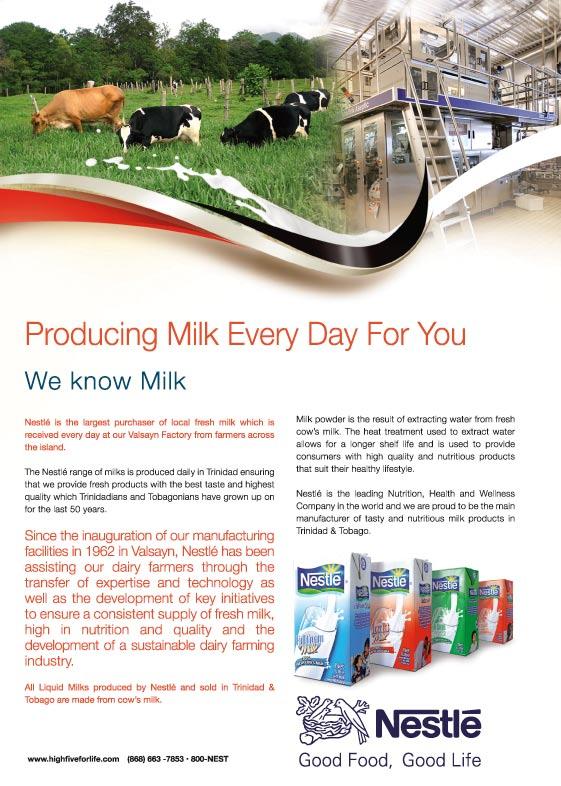



























































































 By Donna P. Ramsammy
By Donna P. Ramsammy




 By Esther LeGendre
By Esther LeGendre
 By J. Wendy Singh
By J. Wendy Singh








